The Serverless Application
A presentation at DevFest Cardiff in in Cardiff, UK by Rob Allen

The Serverless Application Rob Allen November 2019

Serverless? Rob Allen ~ @akrabat

Platform options Rob Allen ~ @akrabat

Platform options Rob Allen ~ @akrabat

Platform options Rob Allen ~ @akrabat
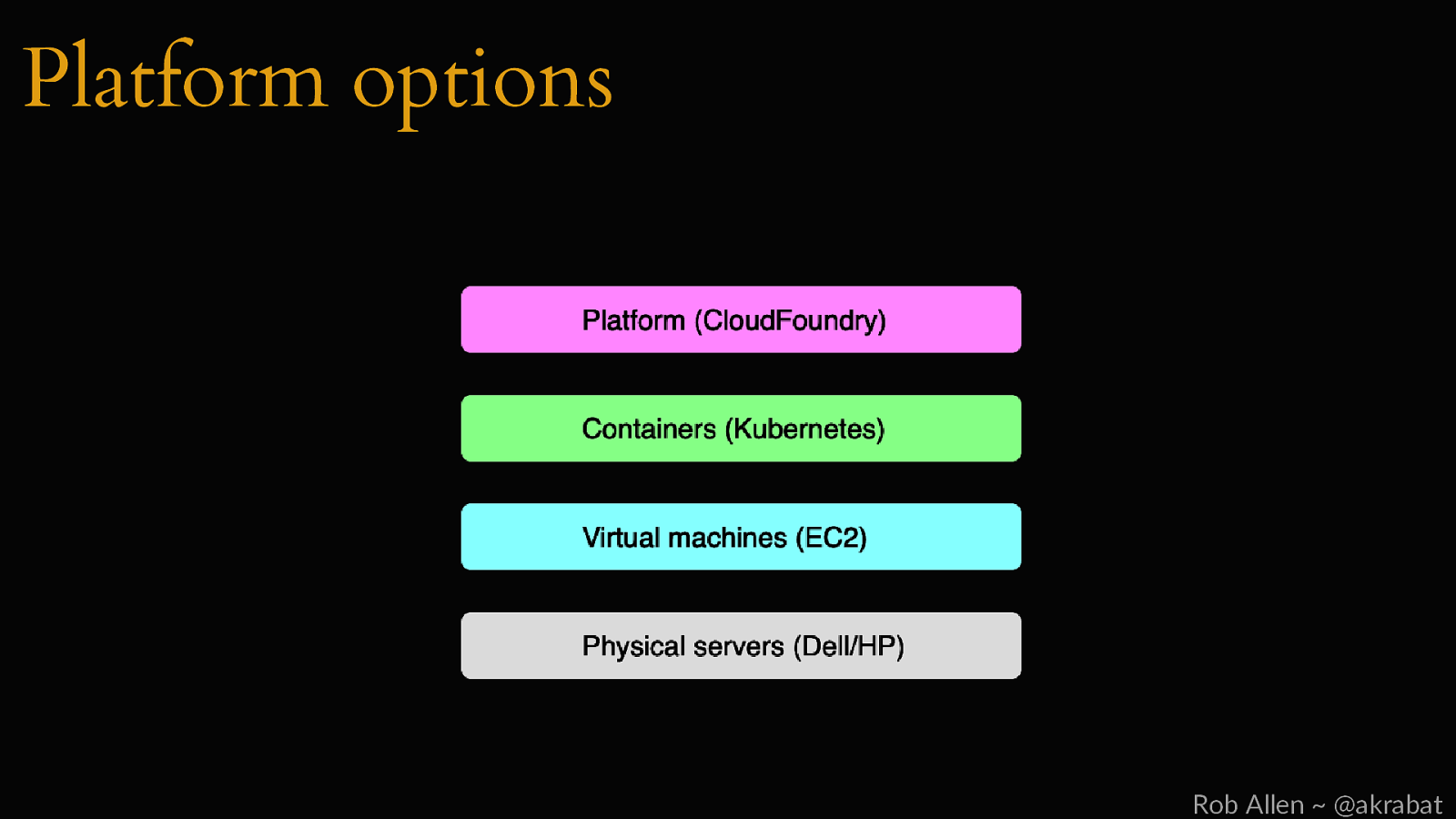
Platform options Rob Allen ~ @akrabat
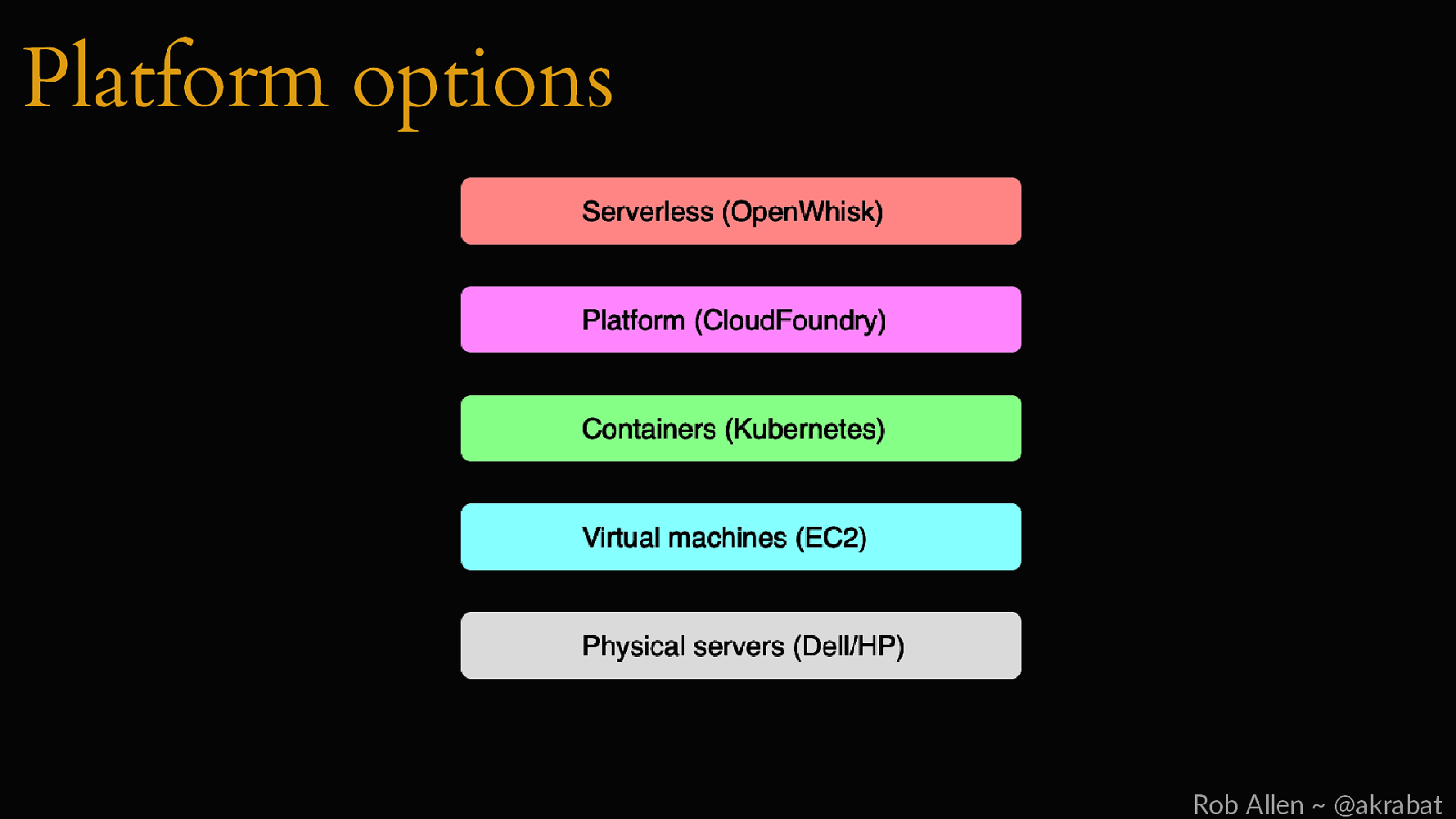
Platform options Rob Allen ~ @akrabat

Platform options Rob Allen ~ @akrabat

Platform options Rob Allen ~ @akrabat
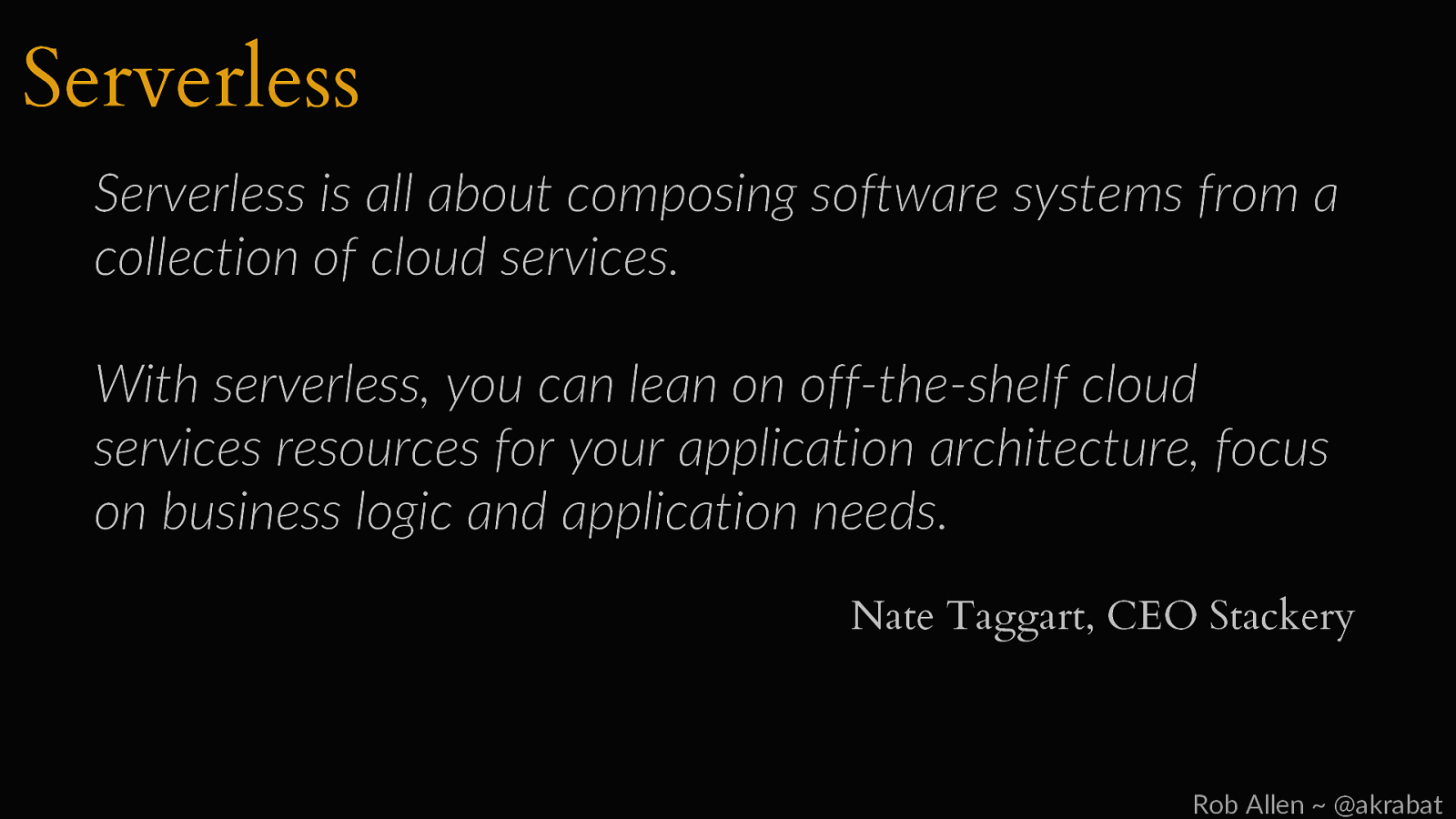
Serverless Serverless is all about composing software systems from a collection of cloud services. With serverless, you can lean on off-the-shelf cloud services resources for your application architecture, focus on business logic and application needs. Nate Taggart, CEO Stackery Rob Allen ~ @akrabat
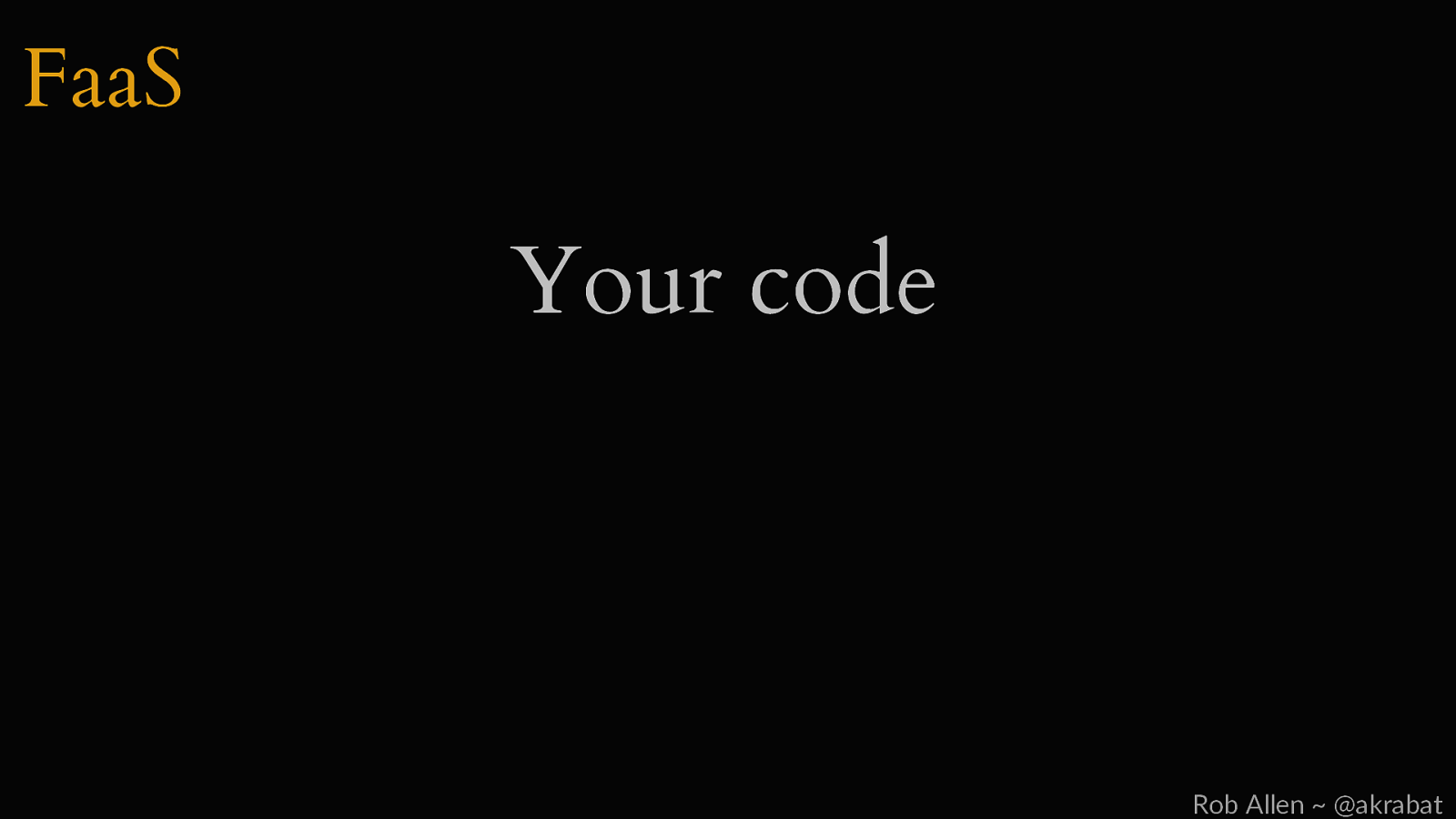
FaaS Your code Rob Allen ~ @akrabat
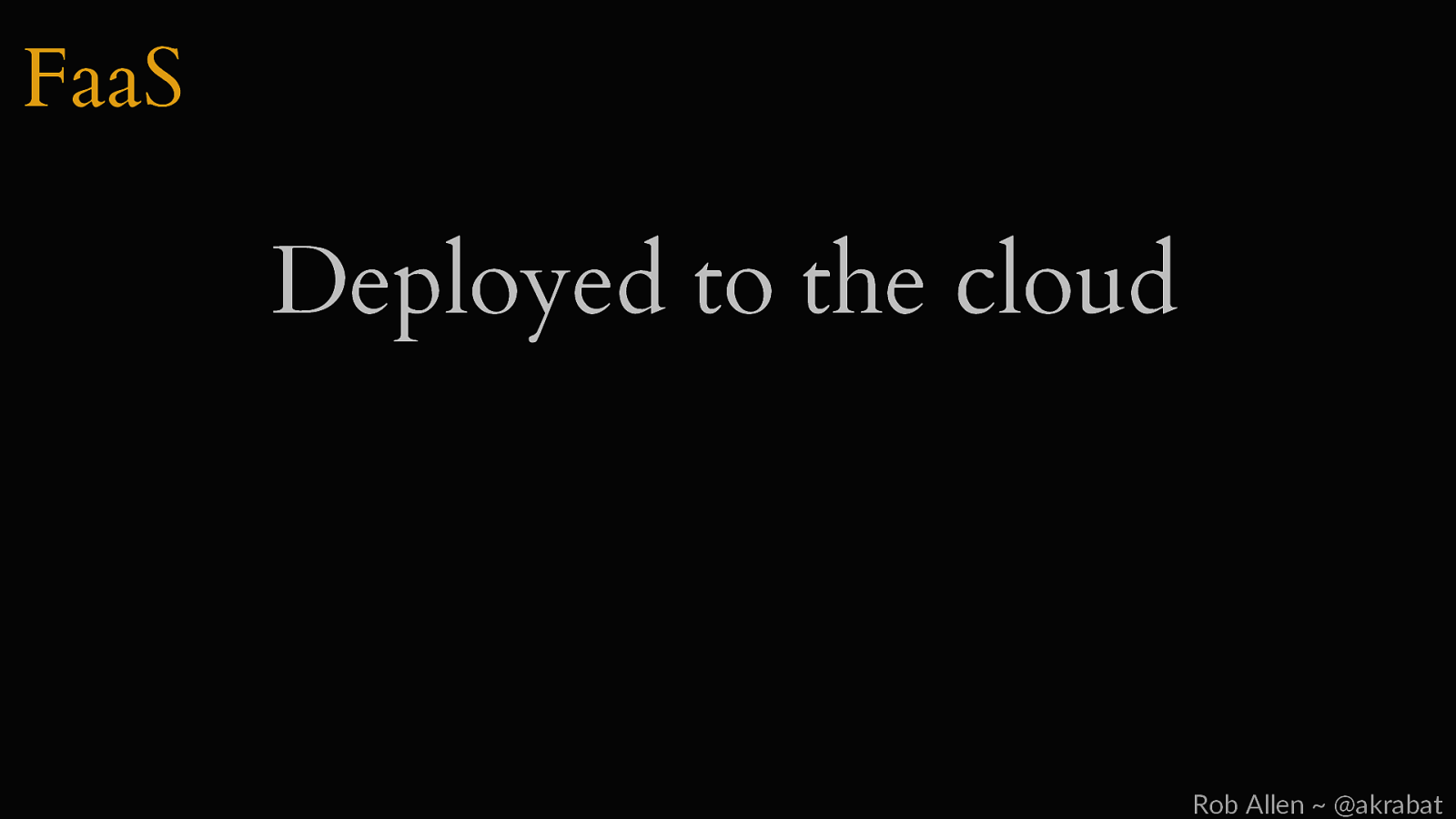
FaaS Deployed to the cloud Rob Allen ~ @akrabat
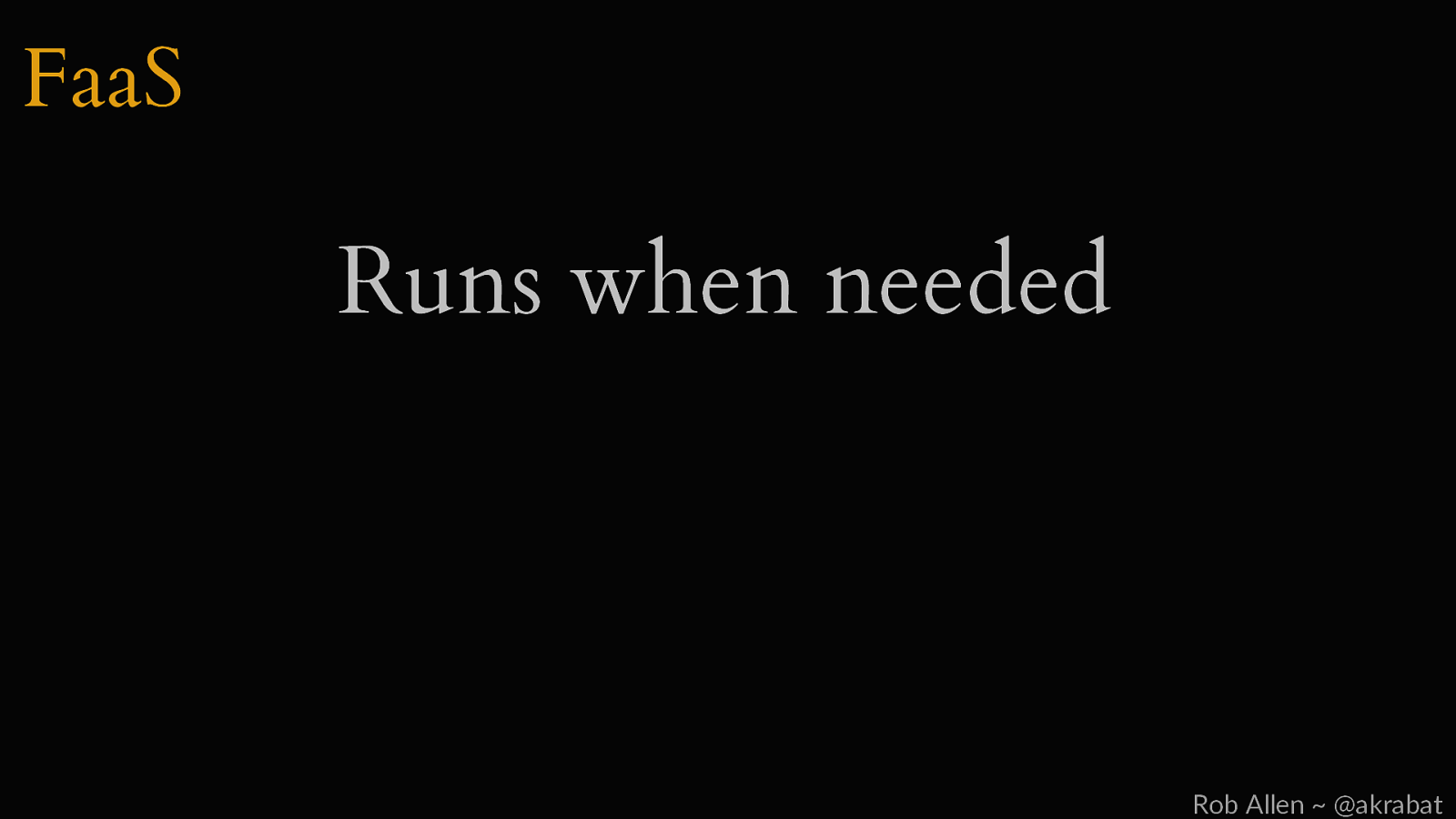
FaaS Runs when needed Rob Allen ~ @akrabat
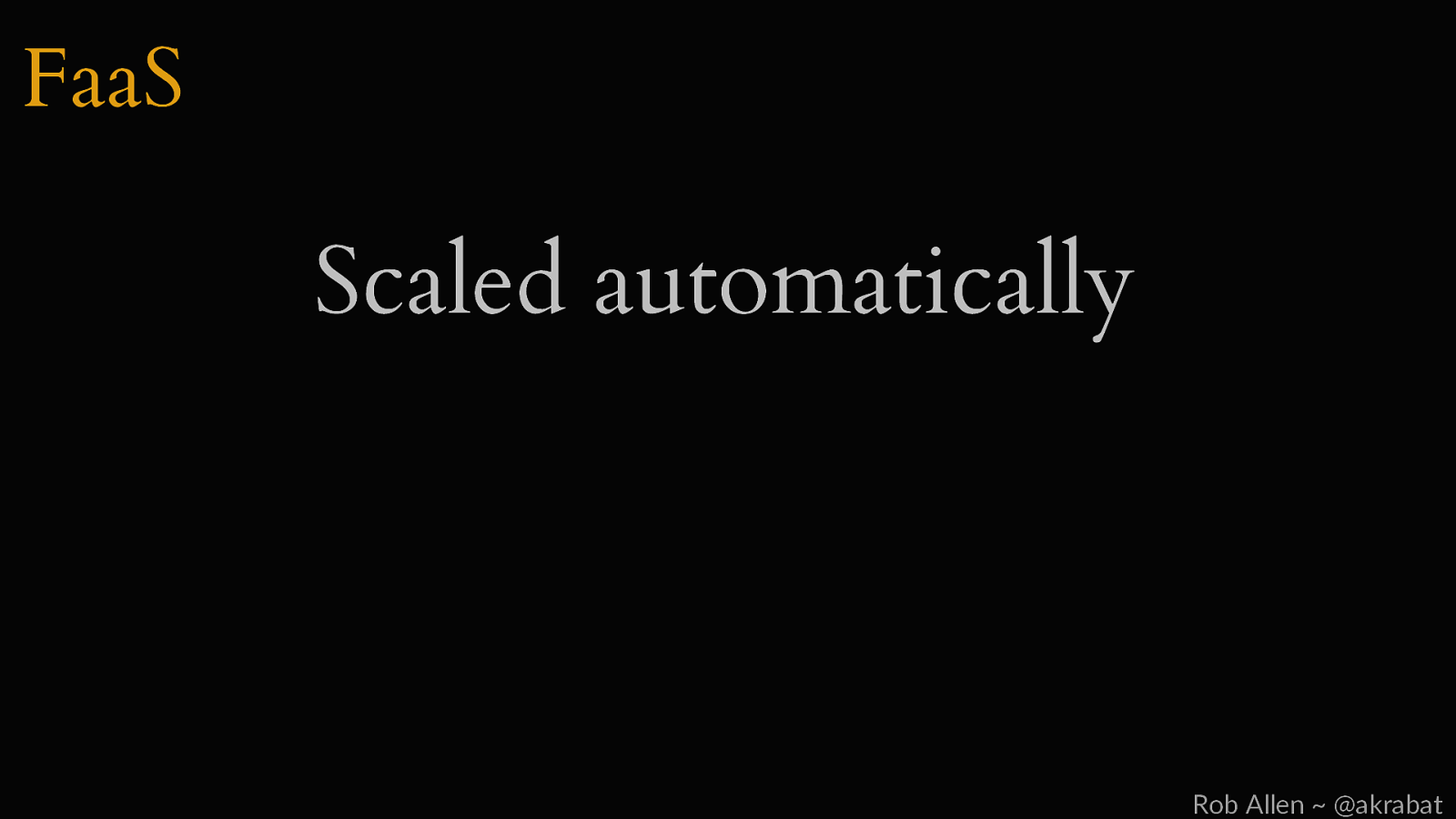
FaaS Scaled automatically Rob Allen ~ @akrabat

FaaS Pay only for execution Rob Allen ~ @akrabat
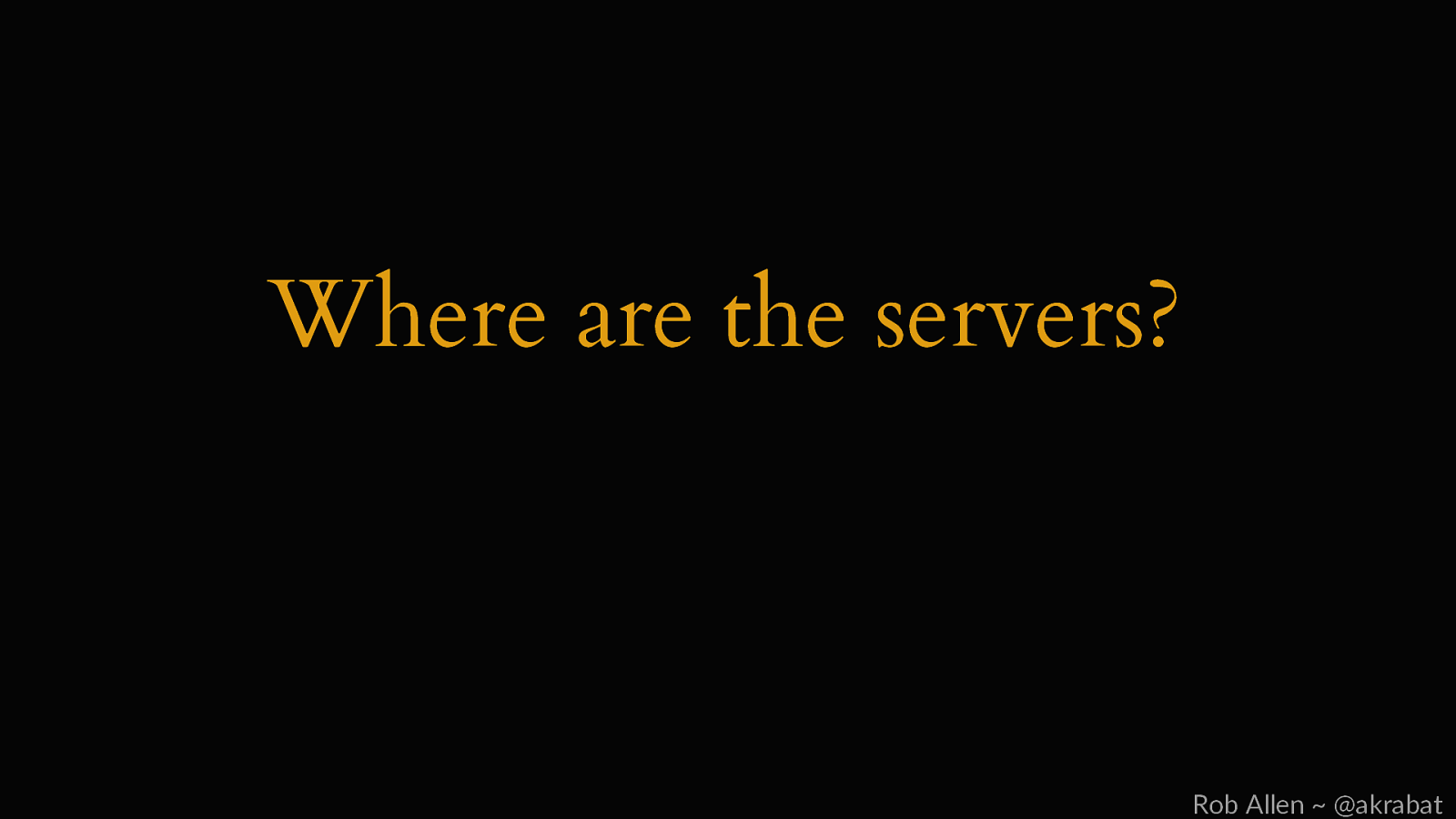
Where are the servers? Rob Allen ~ @akrabat

Rob Allen ~ @akrabat

Rob Allen ~ @akrabat
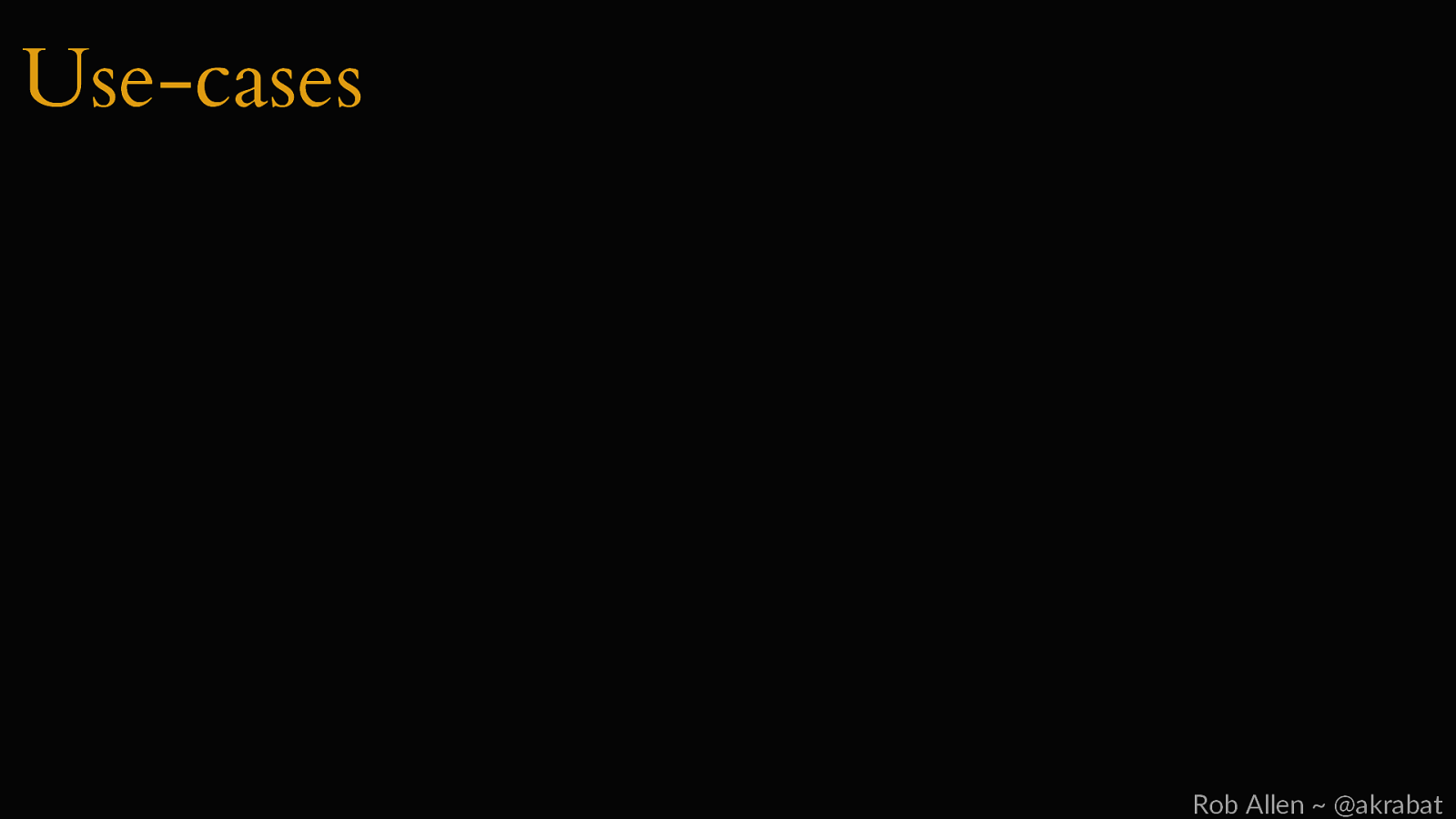
Use-cases Rob Allen ~ @akrabat
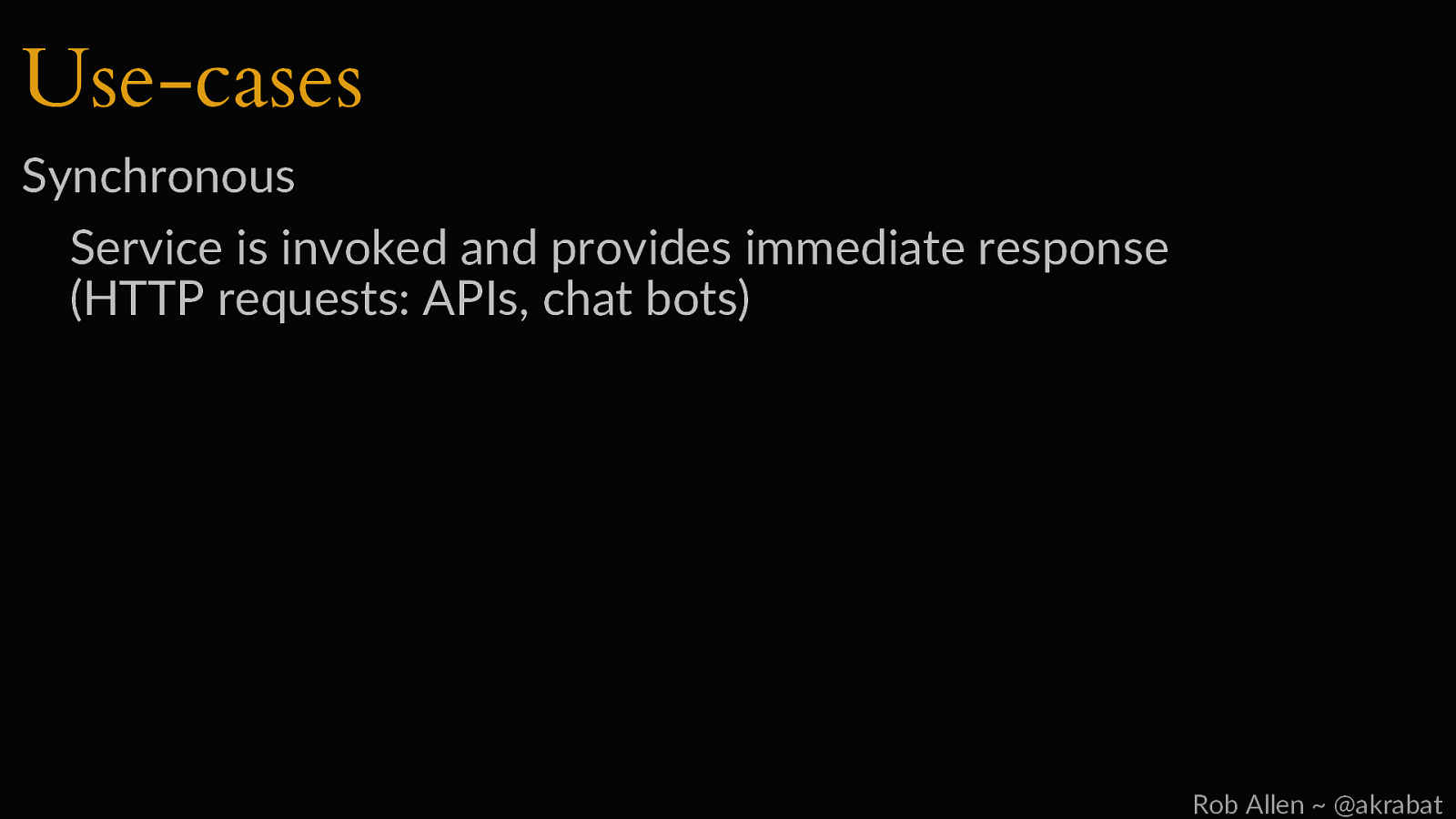
Use-cases Synchronous Service is invoked and provides immediate response (HTTP requests: APIs, chat bots) Rob Allen ~ @akrabat
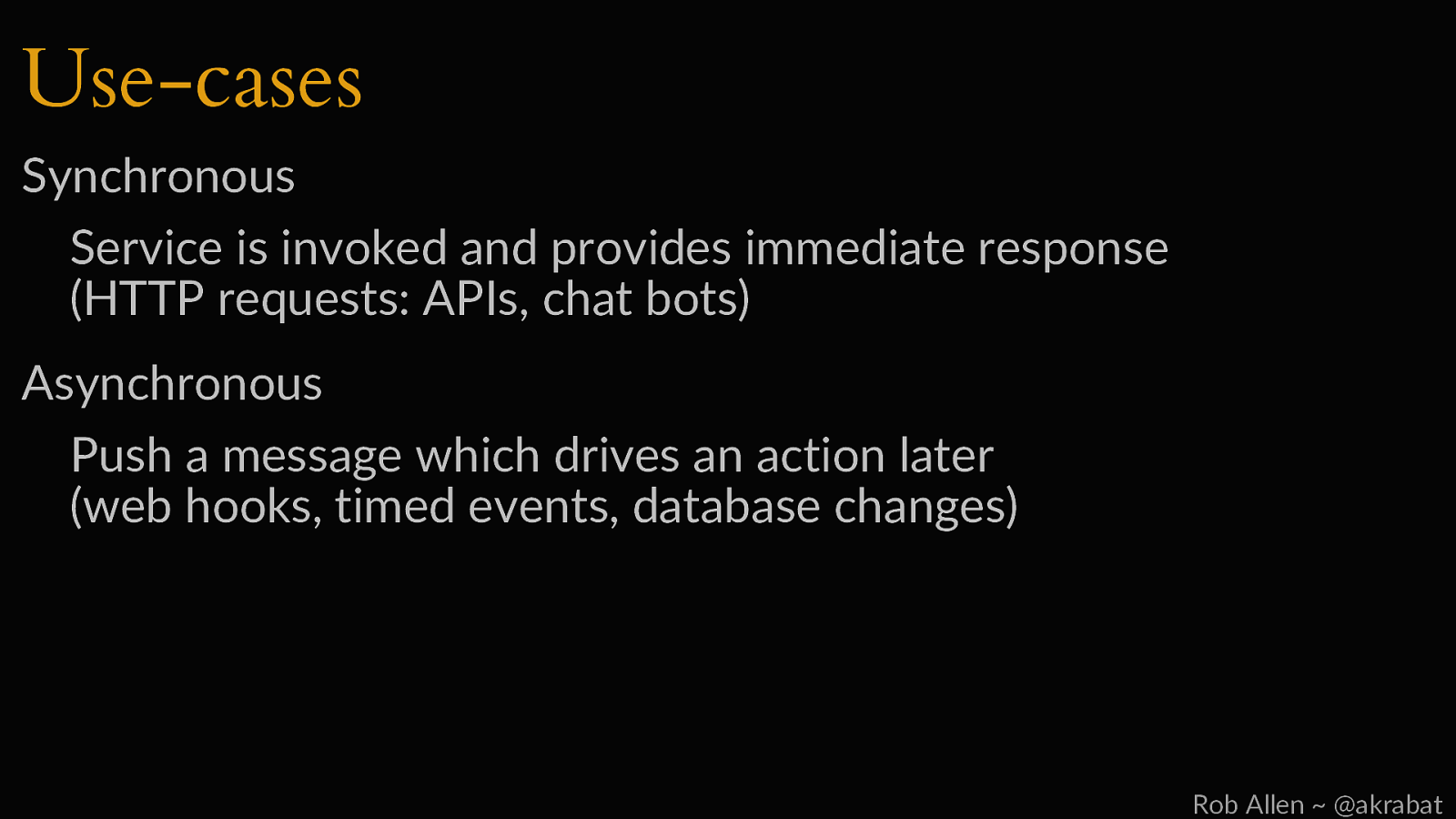
Use-cases Synchronous Service is invoked and provides immediate response (HTTP requests: APIs, chat bots) Asynchronous Push a message which drives an action later (web hooks, timed events, database changes) Rob Allen ~ @akrabat

Benefits Rob Allen ~ @akrabat
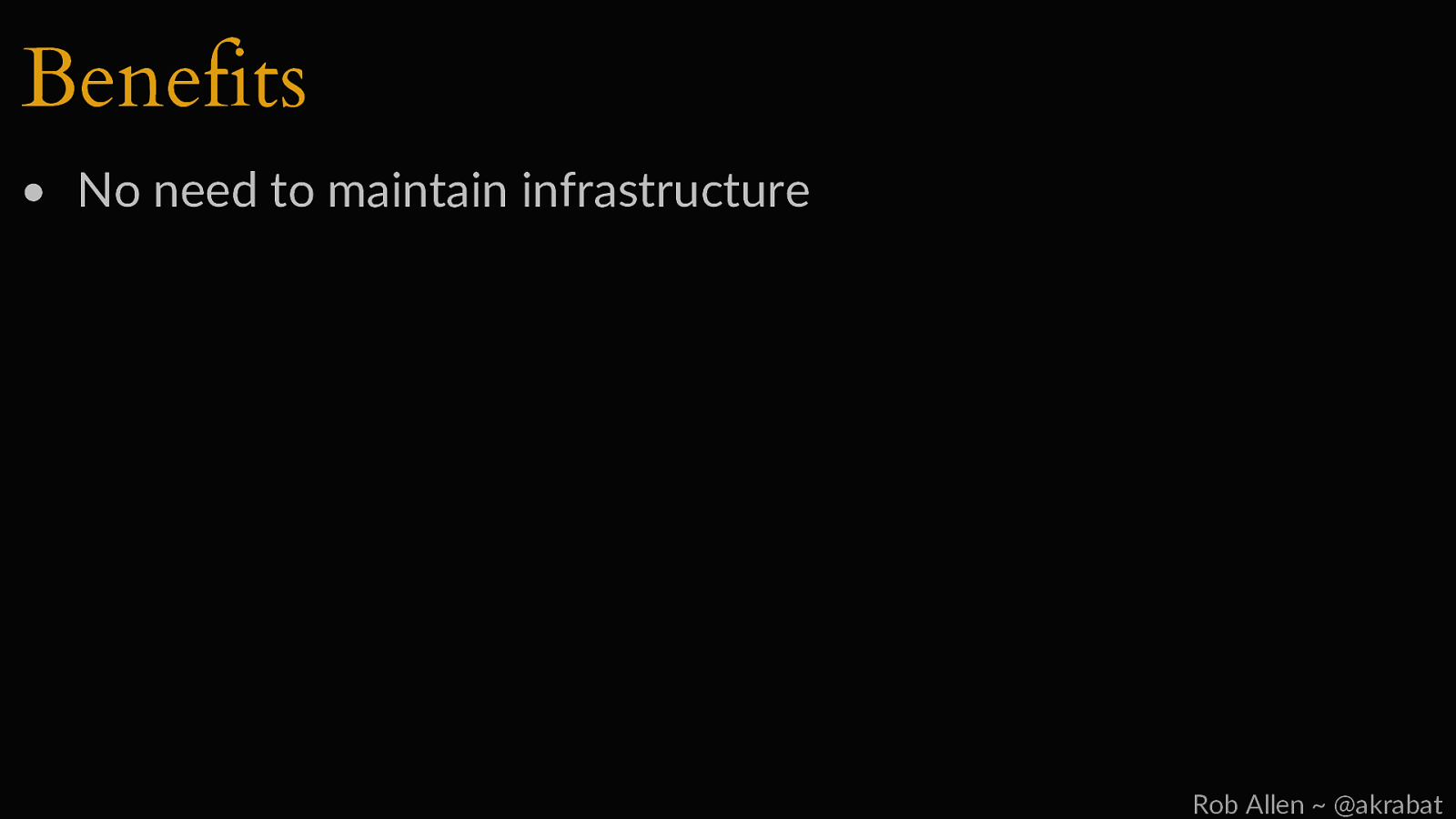
Benefits • No need to maintain infrastructure Rob Allen ~ @akrabat
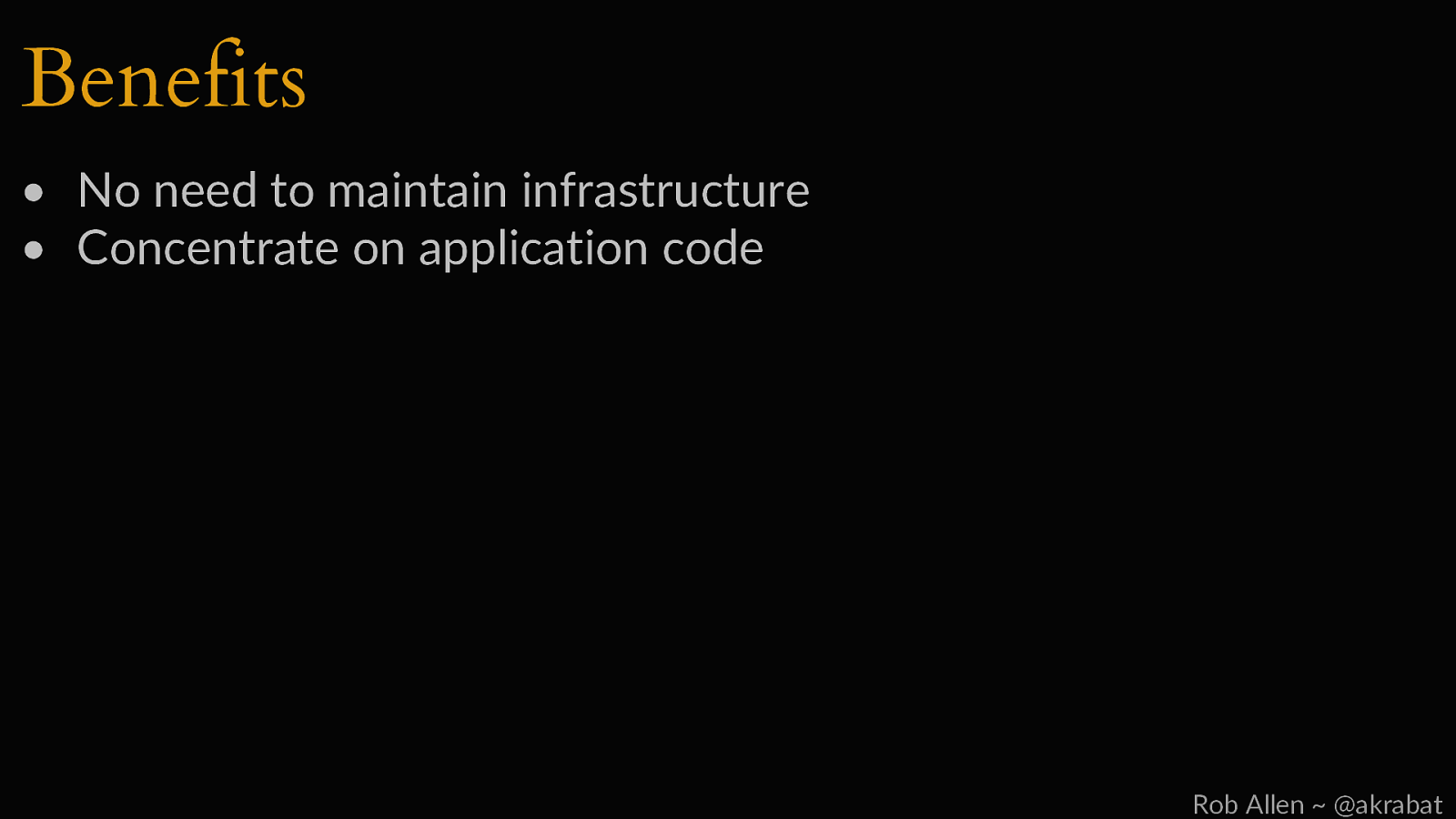
Benefits • No need to maintain infrastructure • Concentrate on application code Rob Allen ~ @akrabat
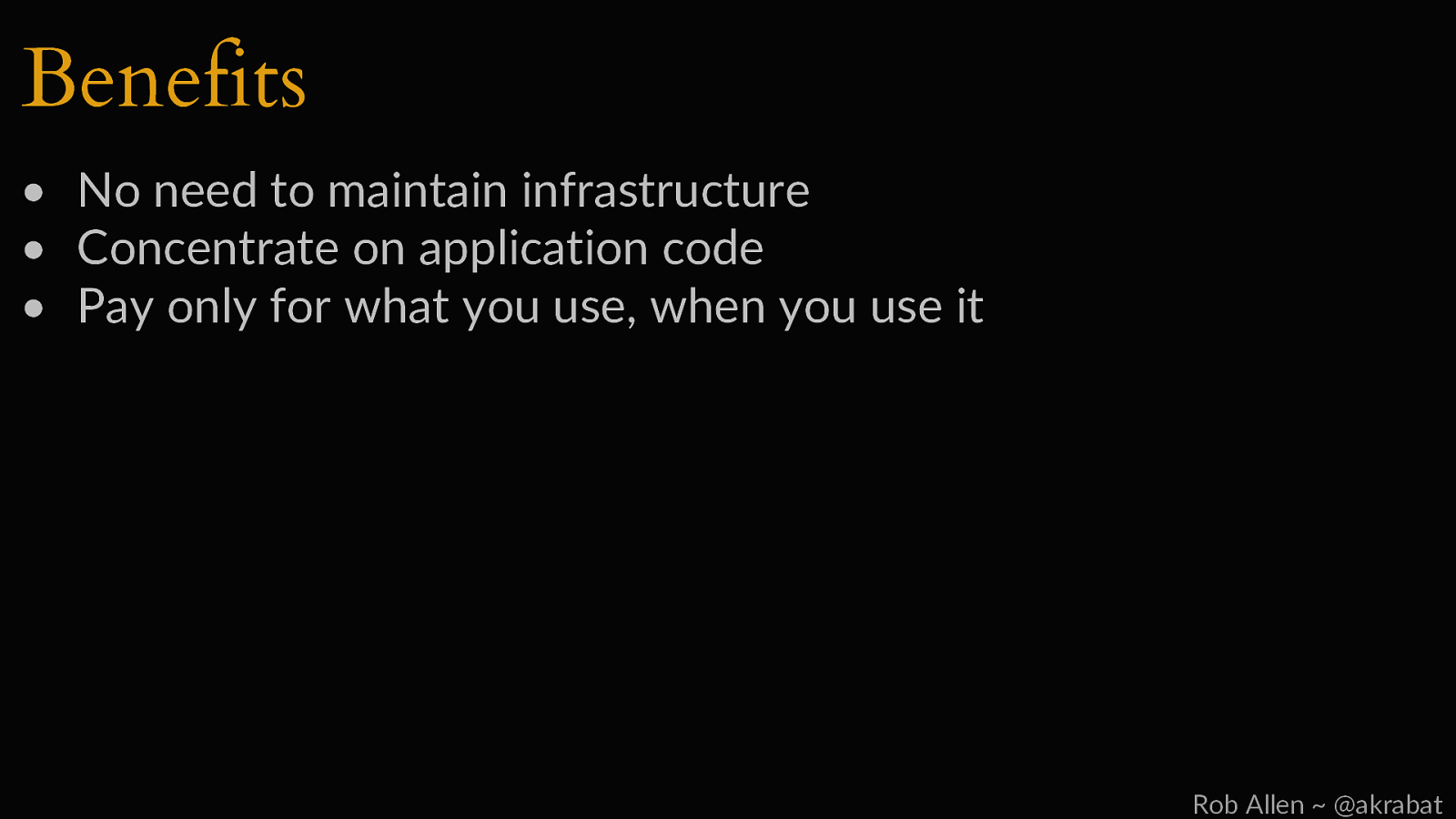
Benefits • No need to maintain infrastructure • Concentrate on application code • Pay only for what you use, when you use it Rob Allen ~ @akrabat
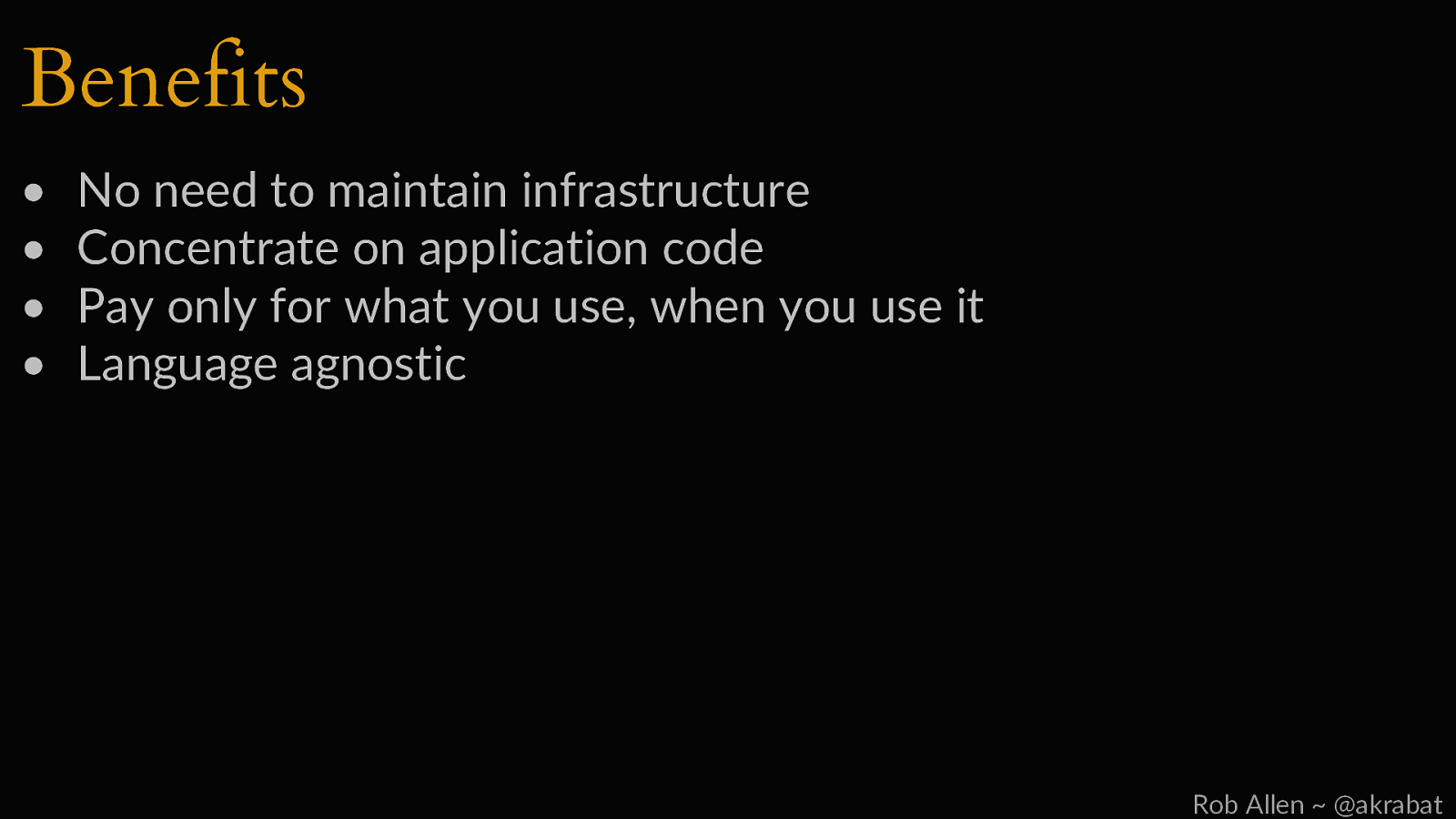
Benefits • • • • No need to maintain infrastructure Concentrate on application code Pay only for what you use, when you use it Language agnostic Rob Allen ~ @akrabat

Challenges Rob Allen ~ @akrabat
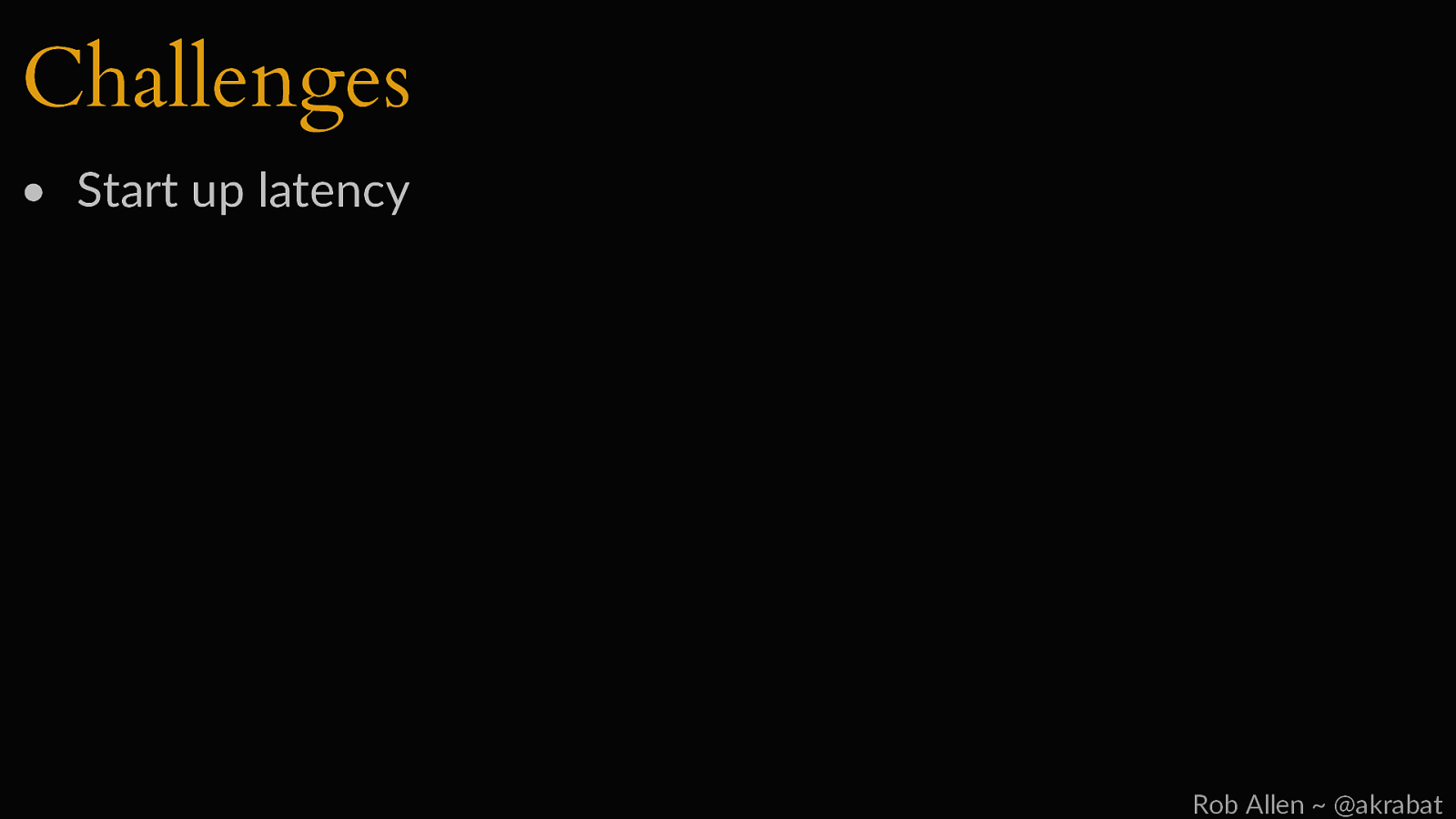
Challenges • Start up latency Rob Allen ~ @akrabat
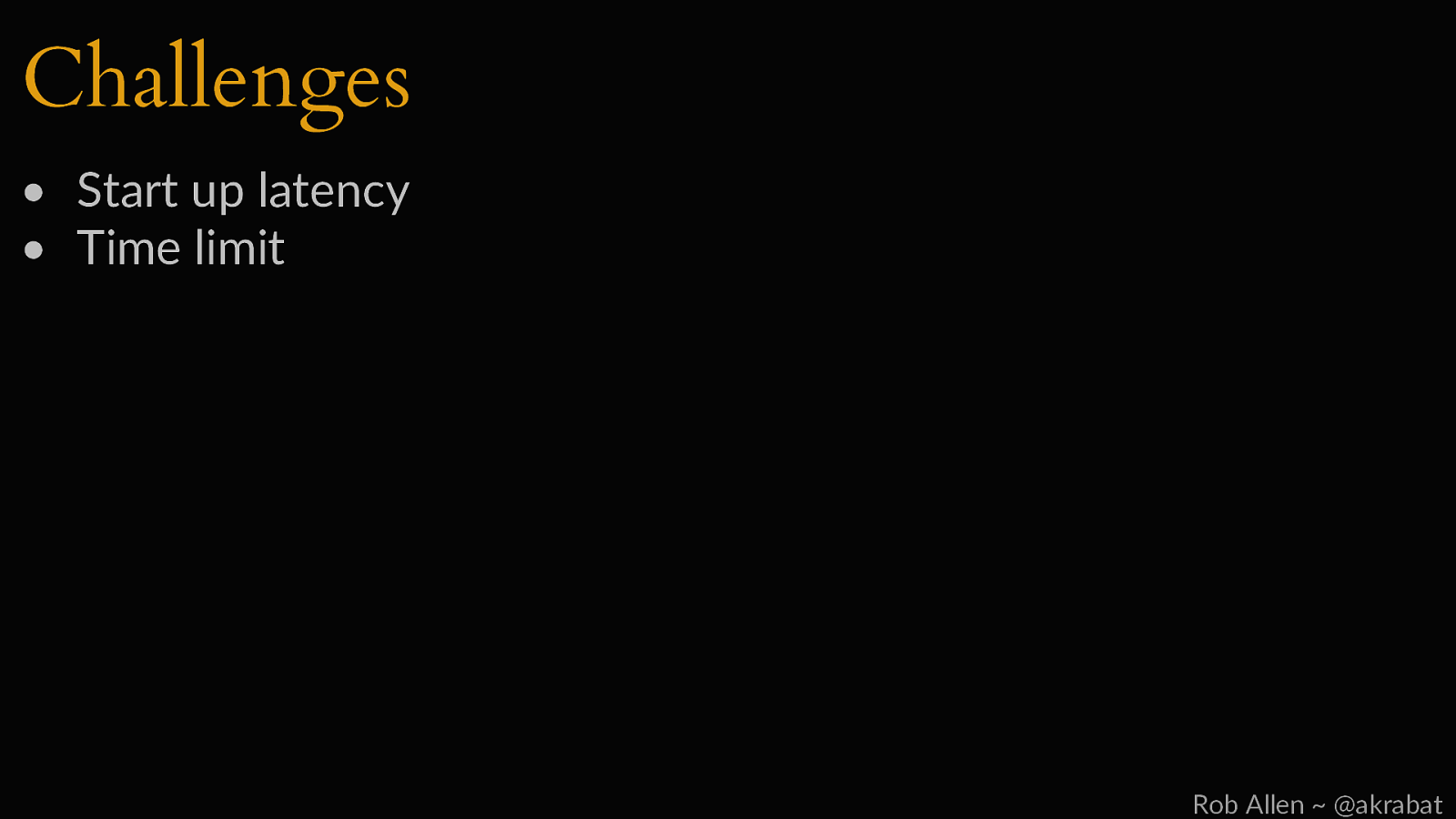
Challenges • Start up latency • Time limit Rob Allen ~ @akrabat
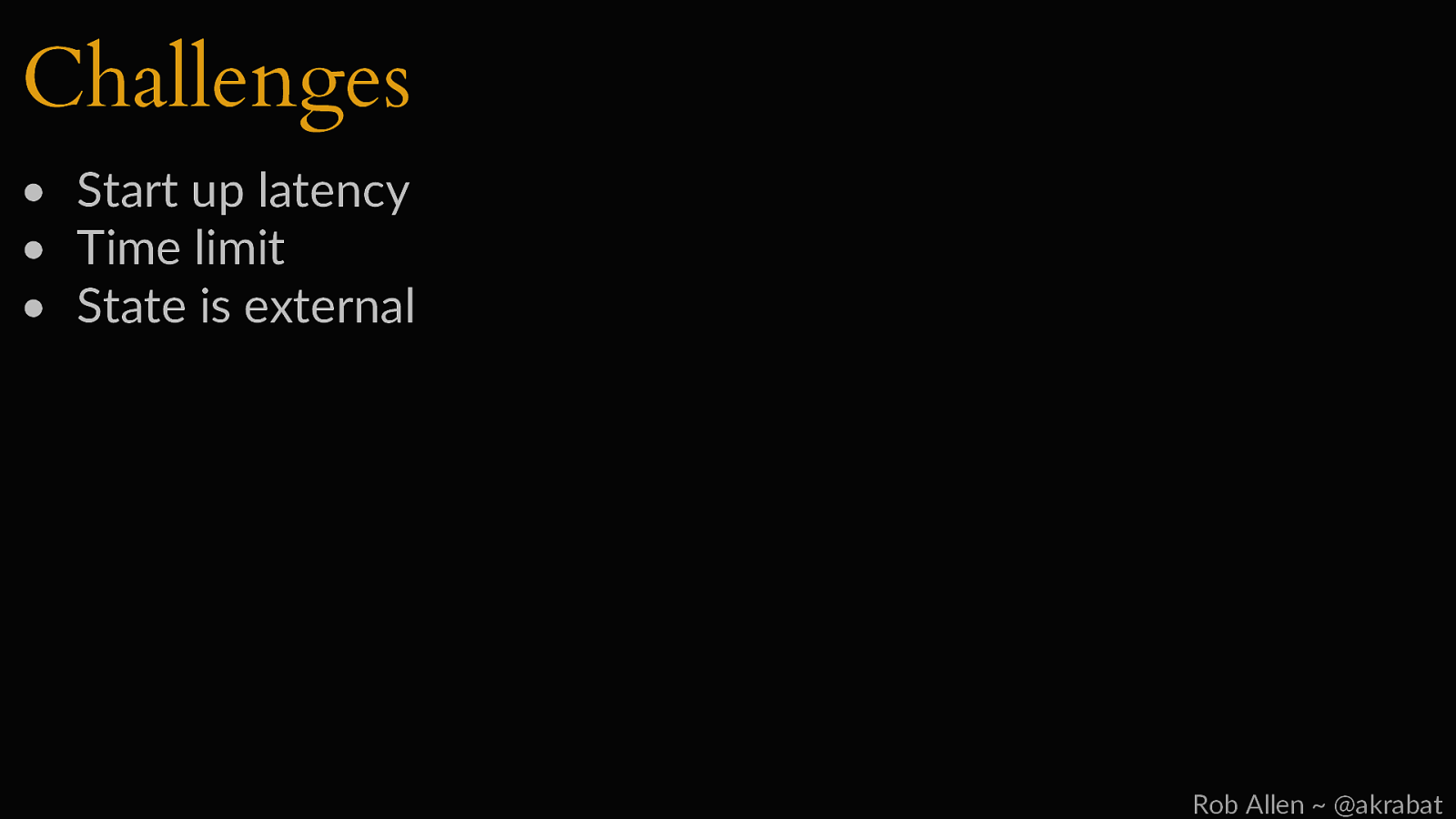
Challenges • Start up latency • Time limit • State is external Rob Allen ~ @akrabat
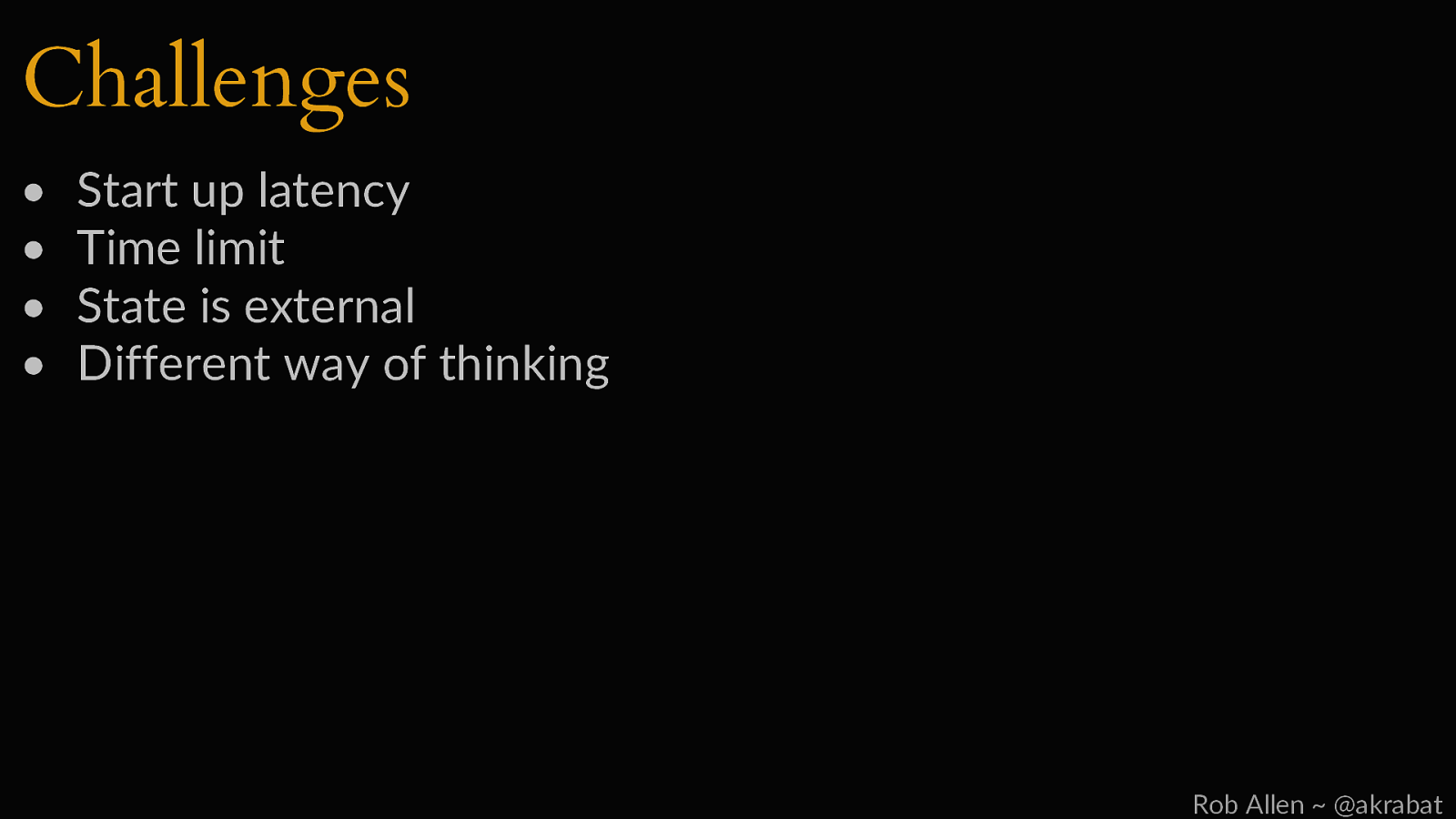
Challenges • • • • Start up latency Time limit State is external Different way of thinking Rob Allen ~ @akrabat
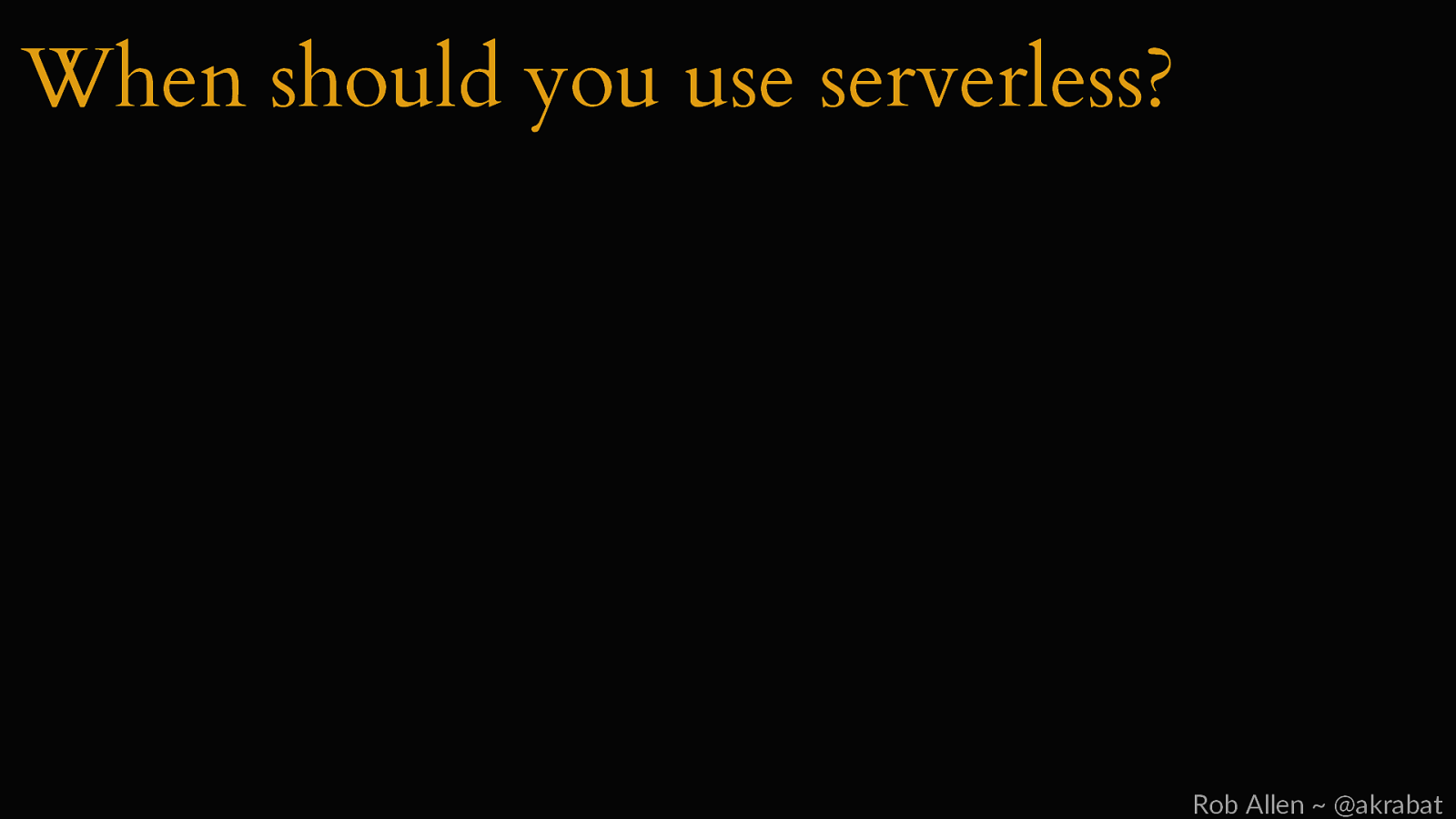
When should you use serverless? Rob Allen ~ @akrabat
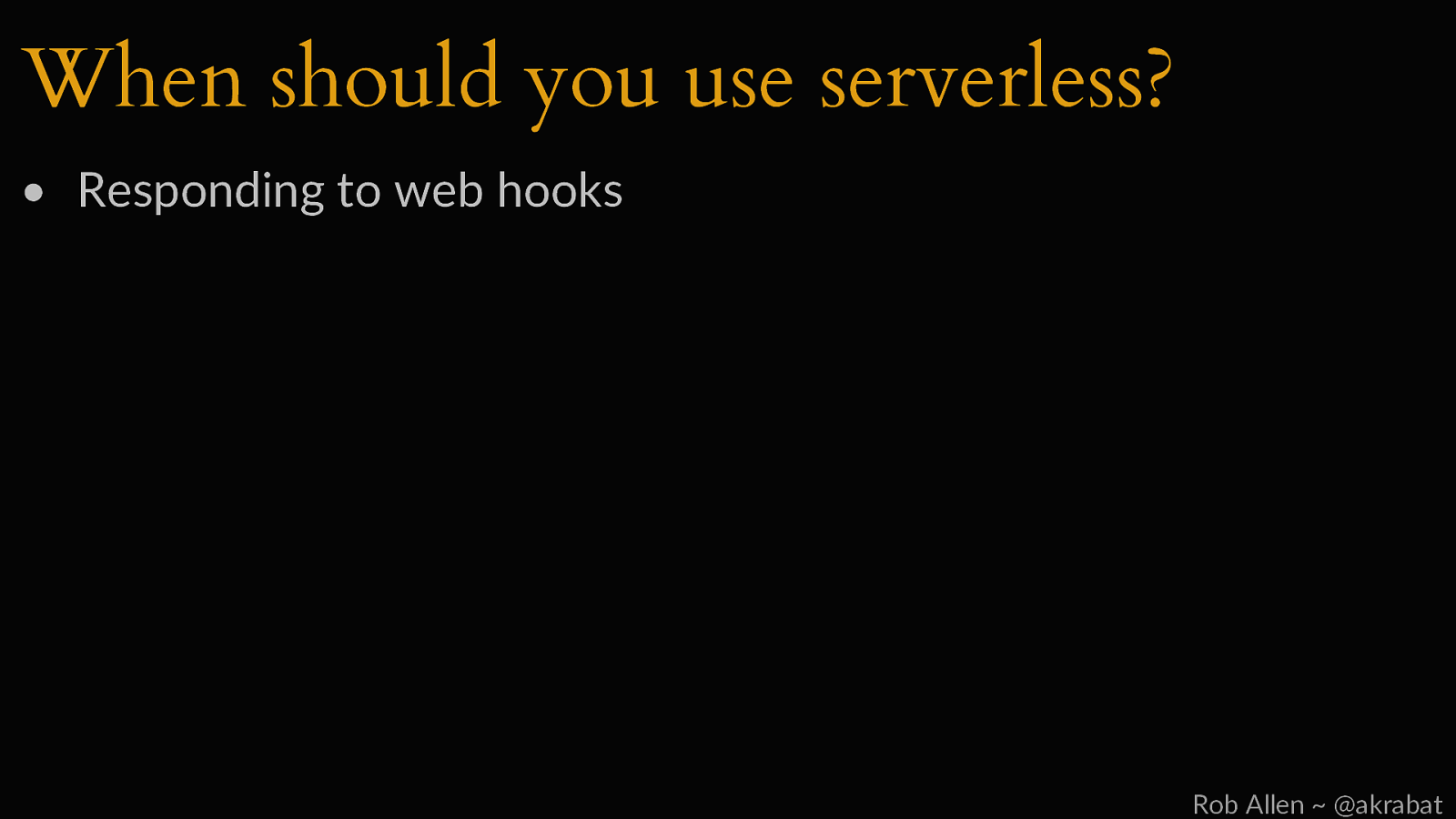
When should you use serverless? • Responding to web hooks Rob Allen ~ @akrabat
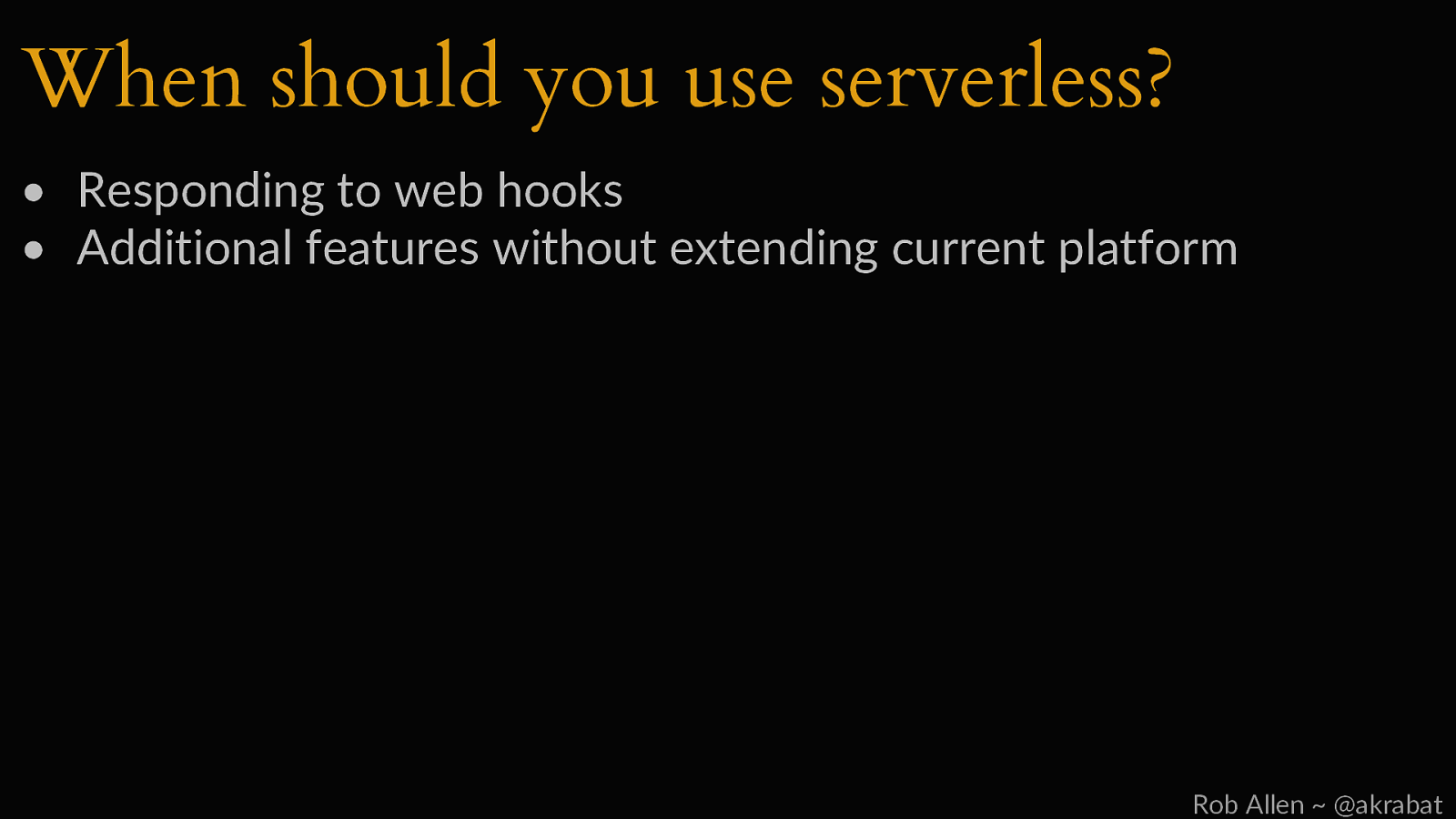
When should you use serverless? • Responding to web hooks • Additional features without extending current platform Rob Allen ~ @akrabat
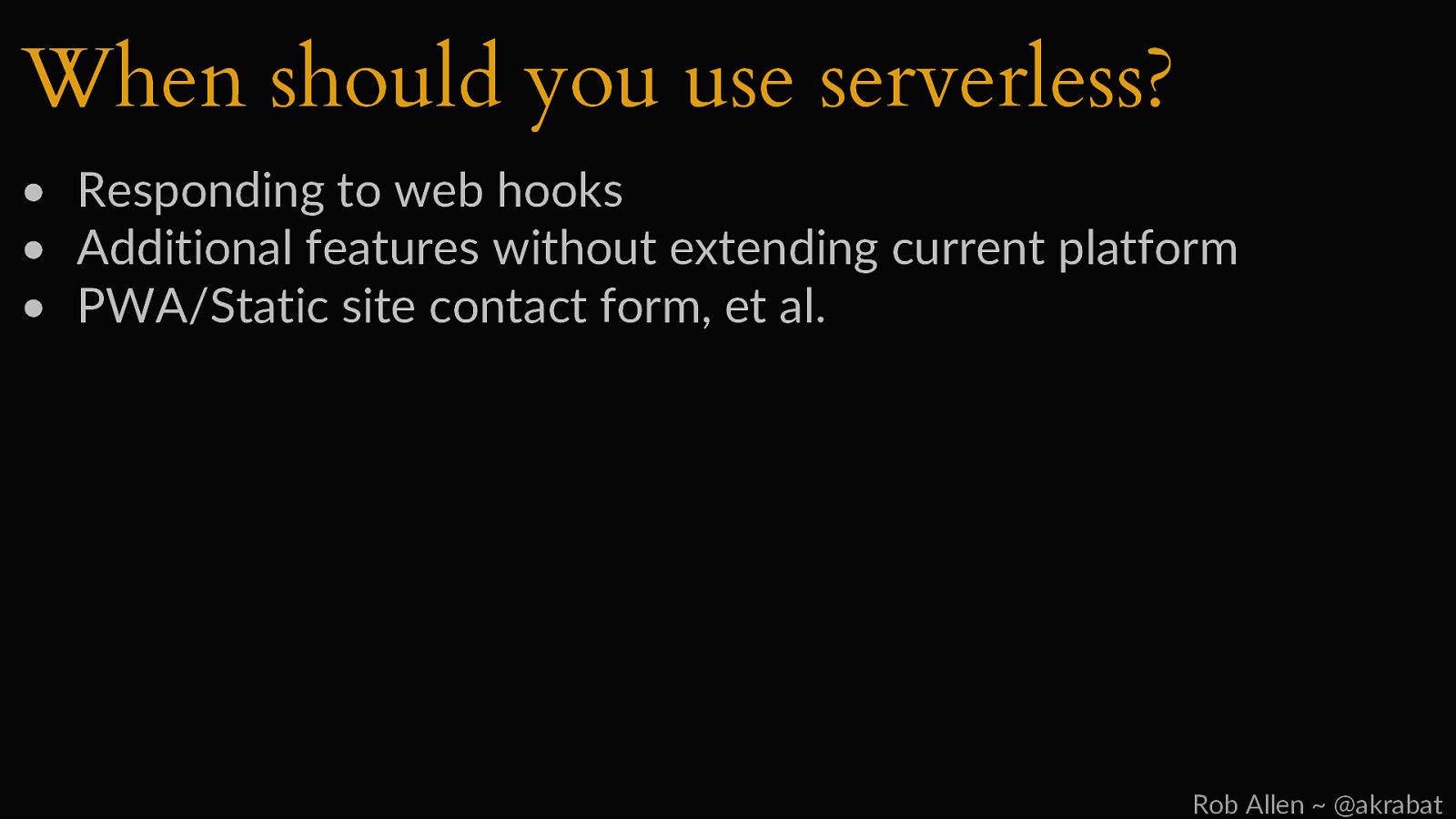
When should you use serverless? • Responding to web hooks • Additional features without extending current platform • PWA/Static site contact form, et al. Rob Allen ~ @akrabat
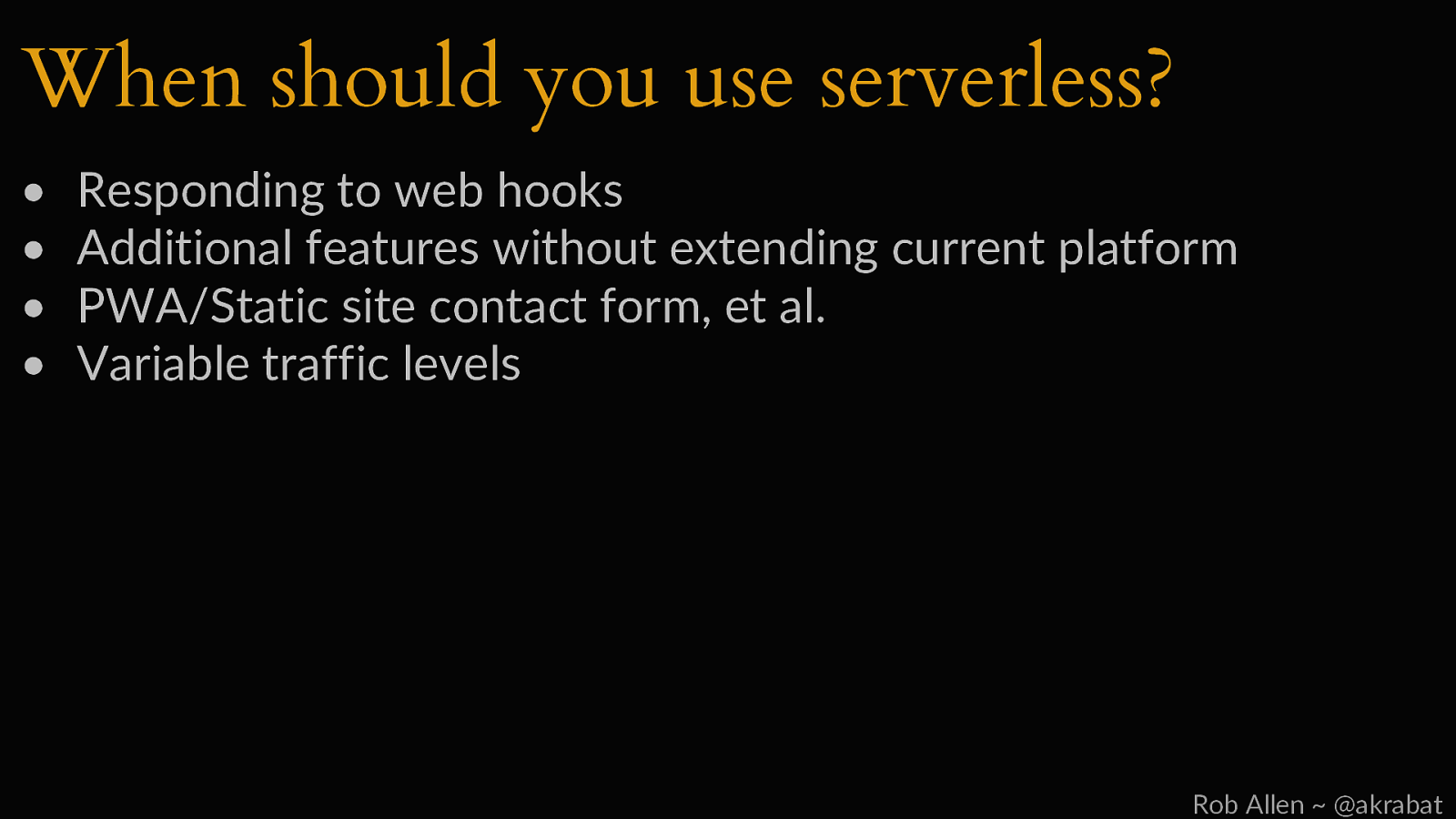
When should you use serverless? • • • • Responding to web hooks Additional features without extending current platform PWA/Static site contact form, et al. Variable traffic levels Rob Allen ~ @akrabat
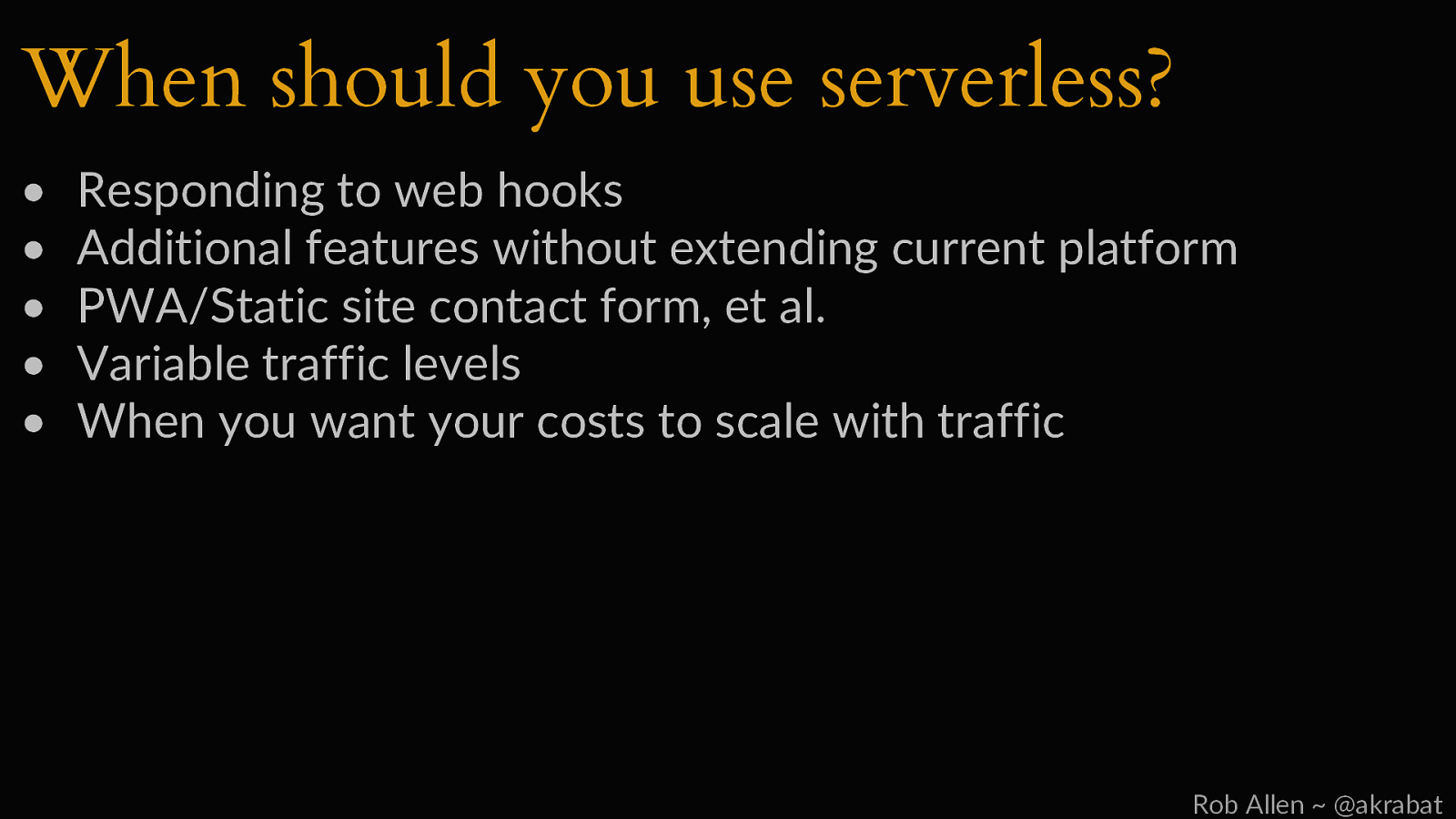
When should you use serverless? • • • • • Responding to web hooks Additional features without extending current platform PWA/Static site contact form, et al. Variable traffic levels When you want your costs to scale with traffic Rob Allen ~ @akrabat
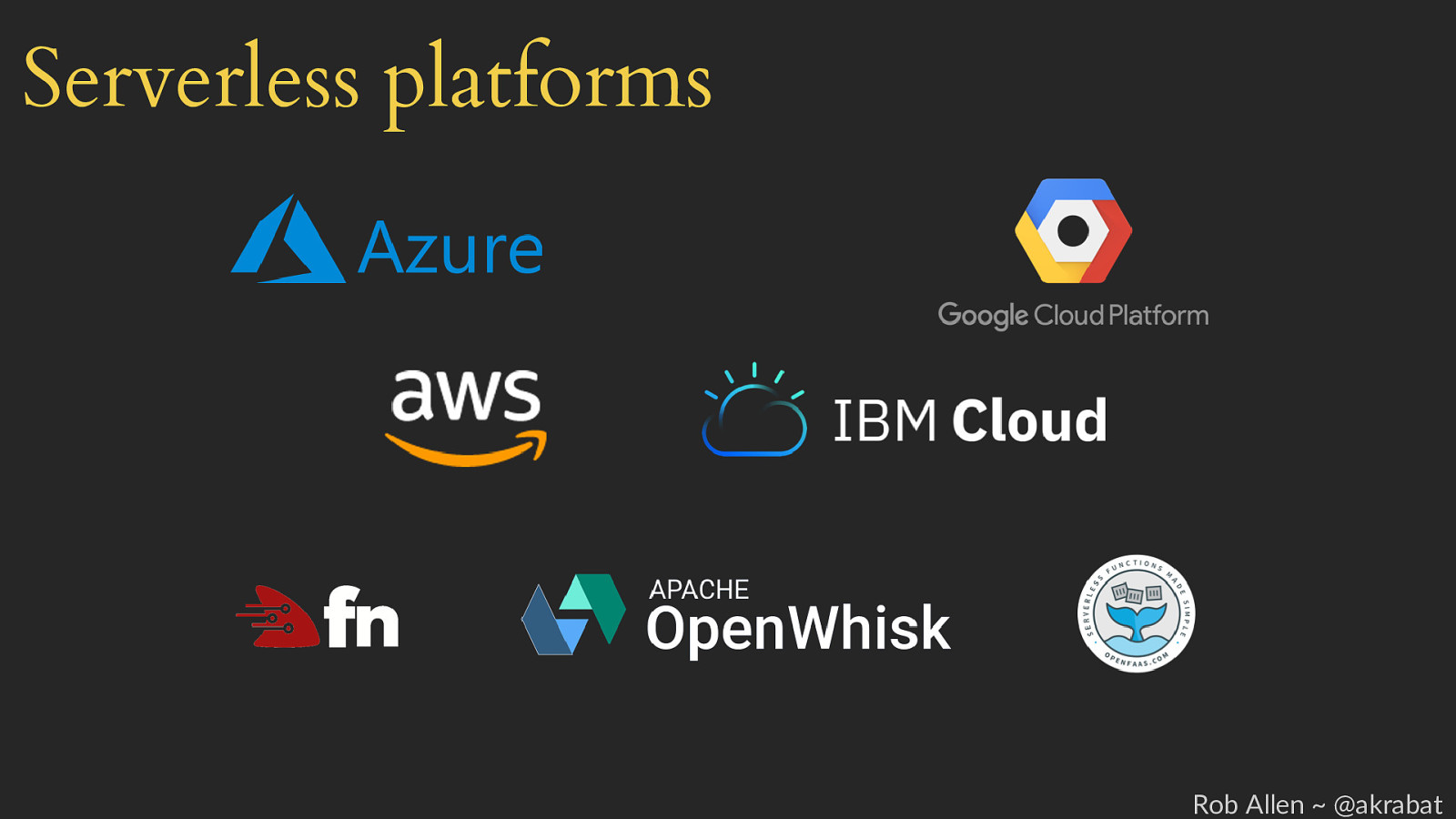
Serverless platforms Rob Allen ~ @akrabat
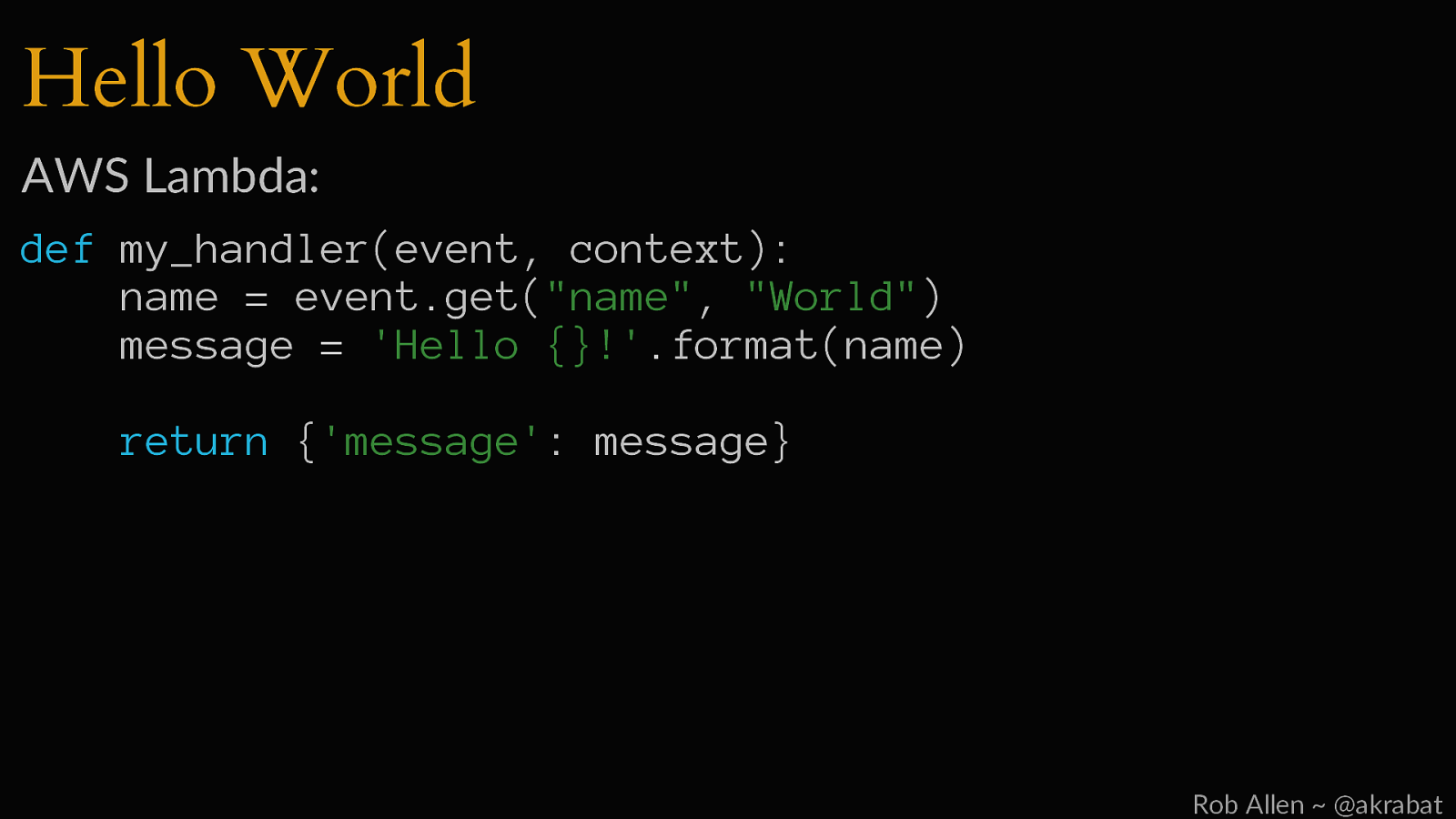
Hello World AWS Lambda: def my_handler(event, context): name = event.get(“name”, “World”) message = ‘Hello {}!’.format(name) return {‘message’: message} Rob Allen ~ @akrabat
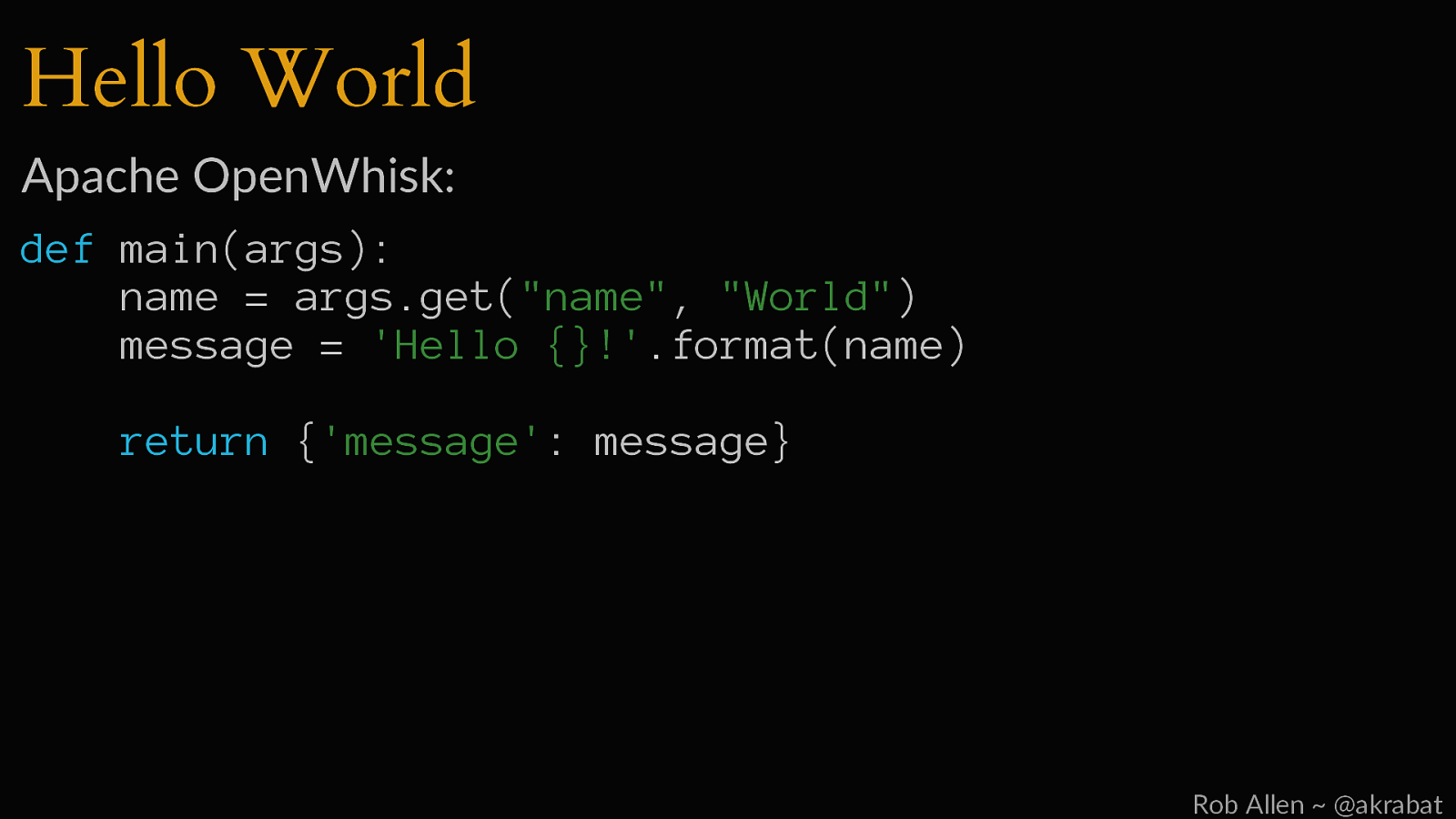
Hello World Apache OpenWhisk: def main(args): name = args.get(“name”, “World”) message = ‘Hello {}!’.format(name) return {‘message’: message} Rob Allen ~ @akrabat
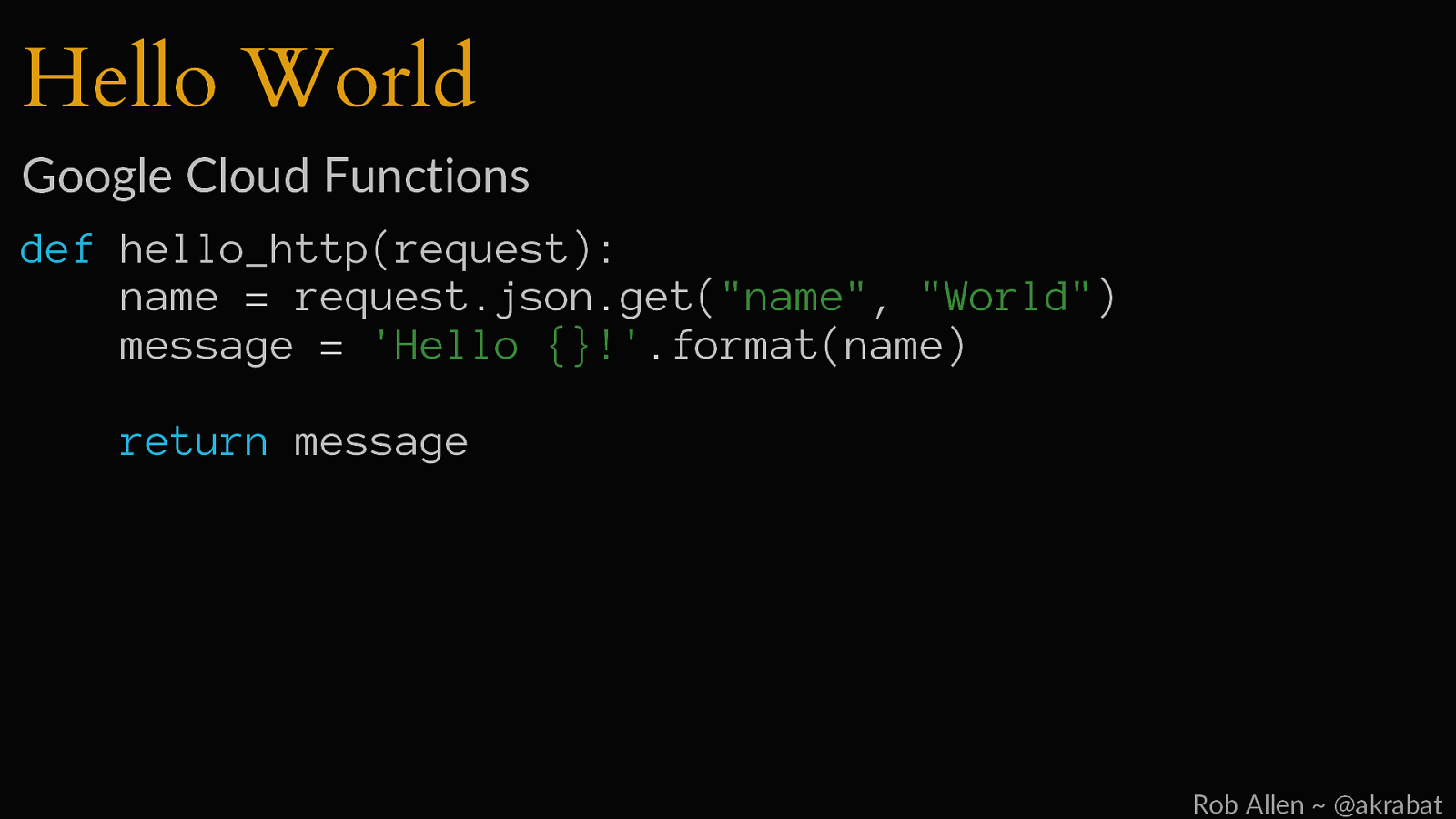
Hello World Google Cloud Functions def hello_http(request): name = request.json.get(“name”, “World”) message = ‘Hello {}!’.format(name) return message Rob Allen ~ @akrabat
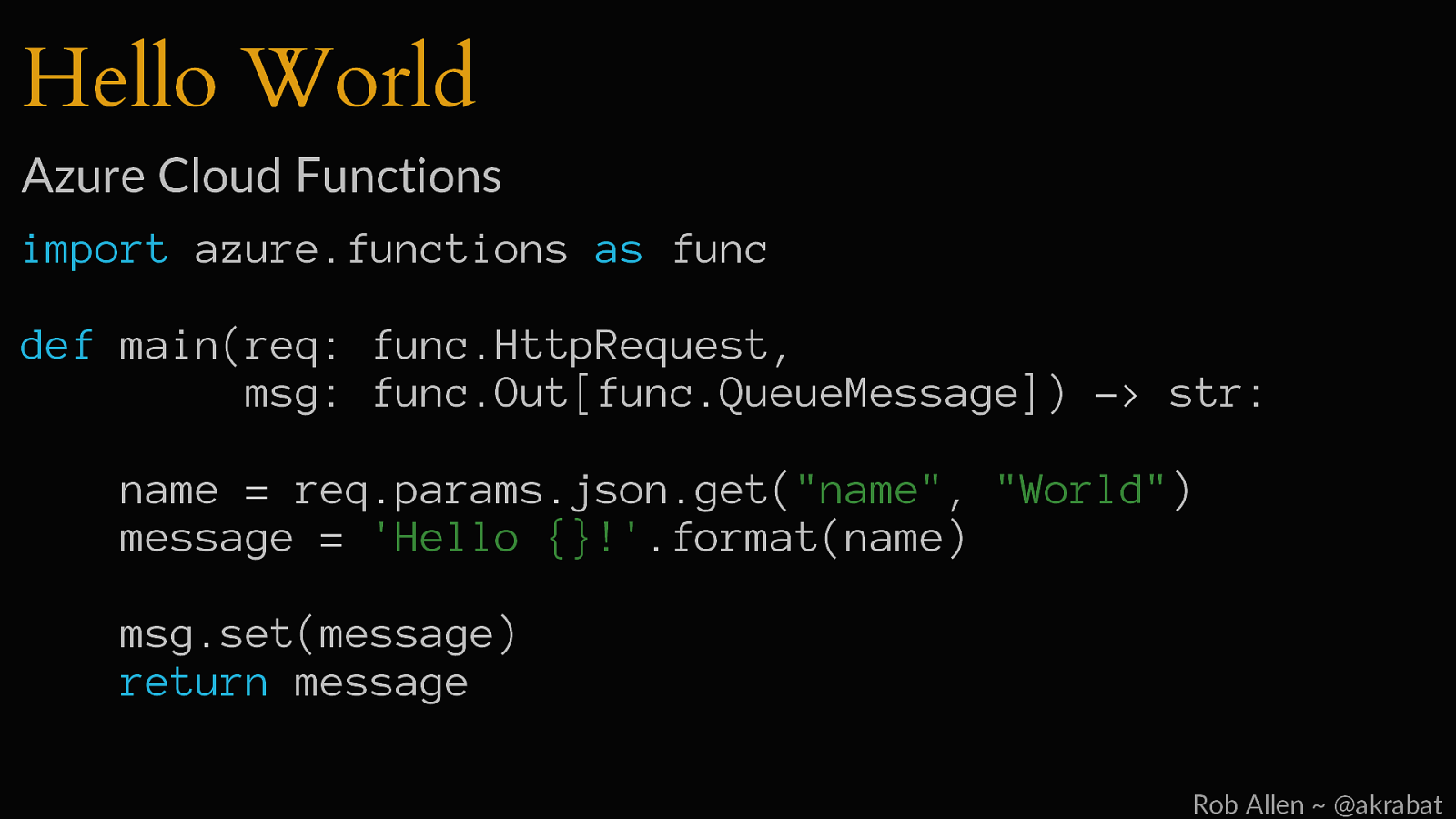
Hello World Azure Cloud Functions import azure.functions as func def main(req: func.HttpRequest, msg: func.Out[func.QueueMessage]) -> str: name = req.params.json.get(“name”, “World”) message = ‘Hello {}!’.format(name) msg.set(message) return message Rob Allen ~ @akrabat
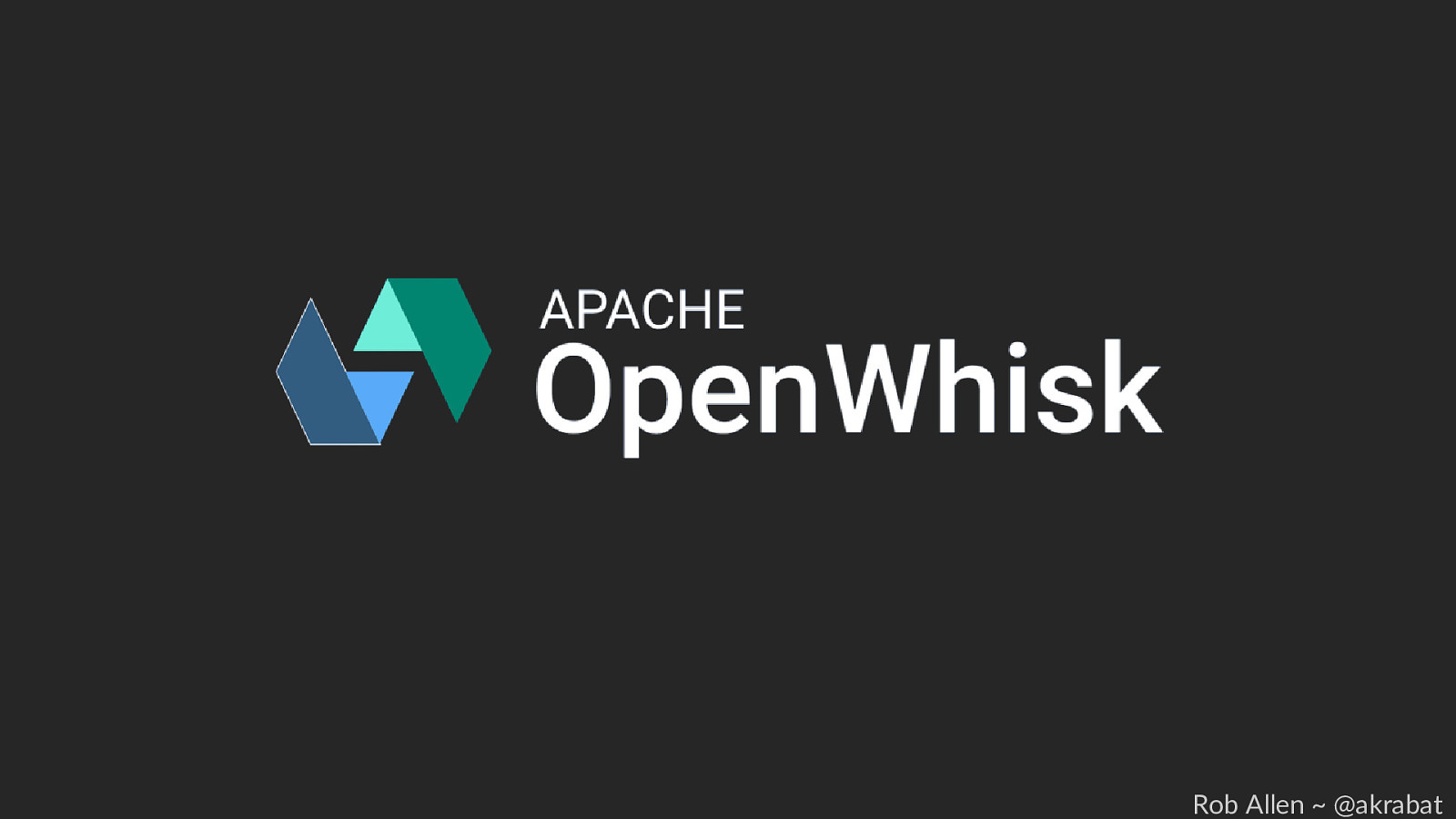
Rob Allen ~ @akrabat
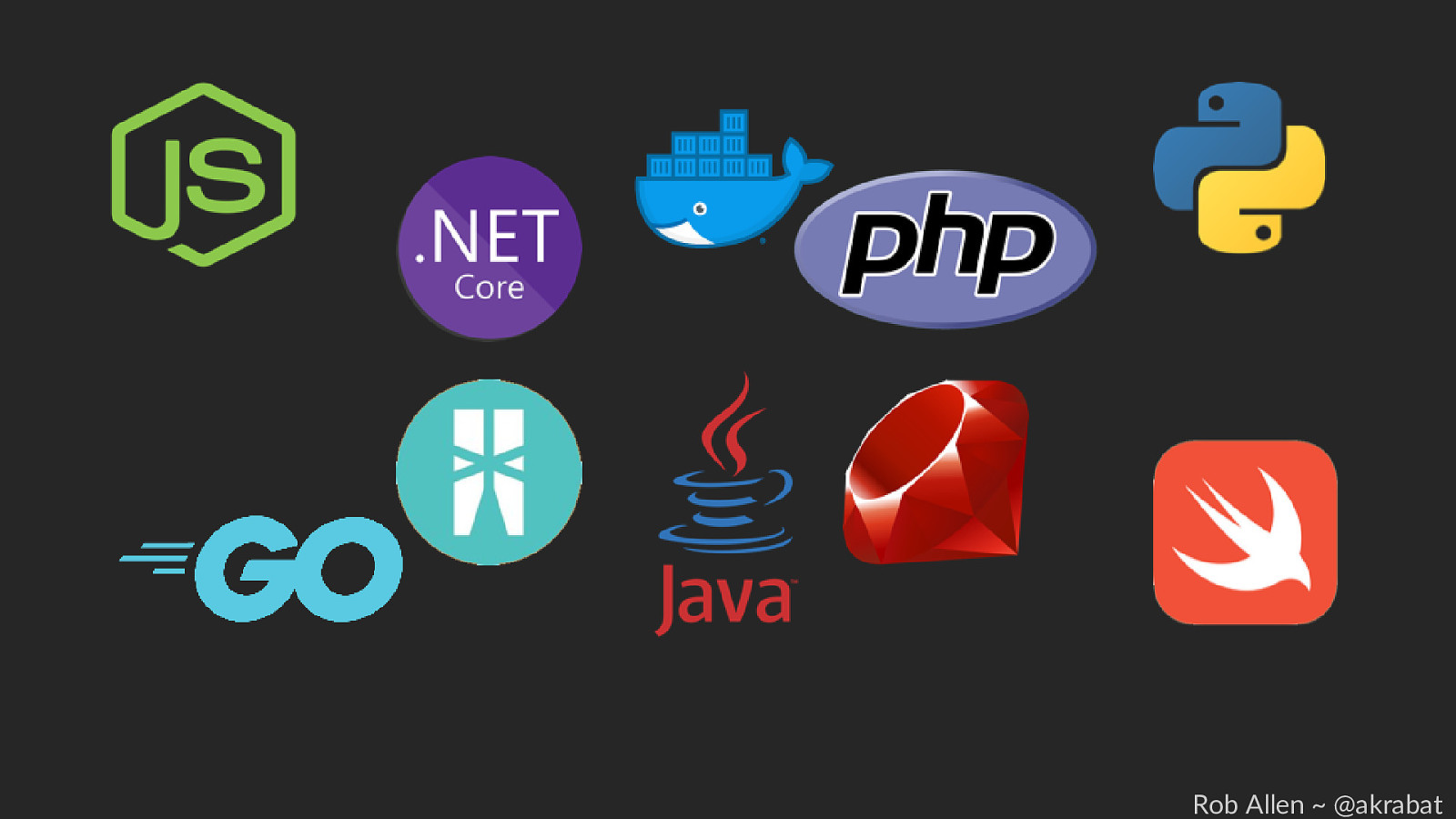
Rob Allen ~ @akrabat
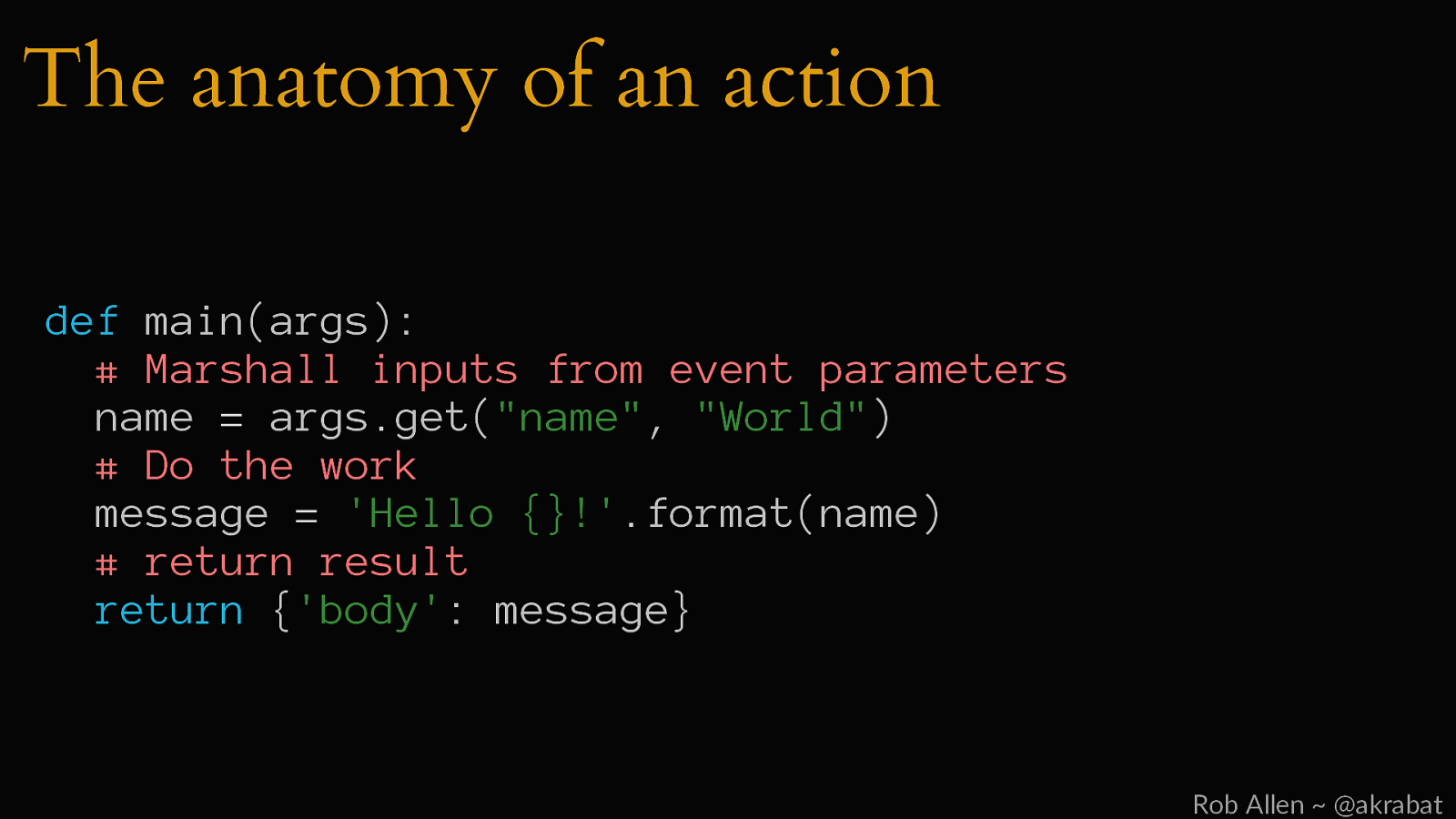
The anatomy of an action def main(args): # Marshall inputs from event parameters name = args.get(“name”, “World”) # Do the work message = ‘Hello {}!’.format(name) # return result return {‘body’: message} Rob Allen ~ @akrabat
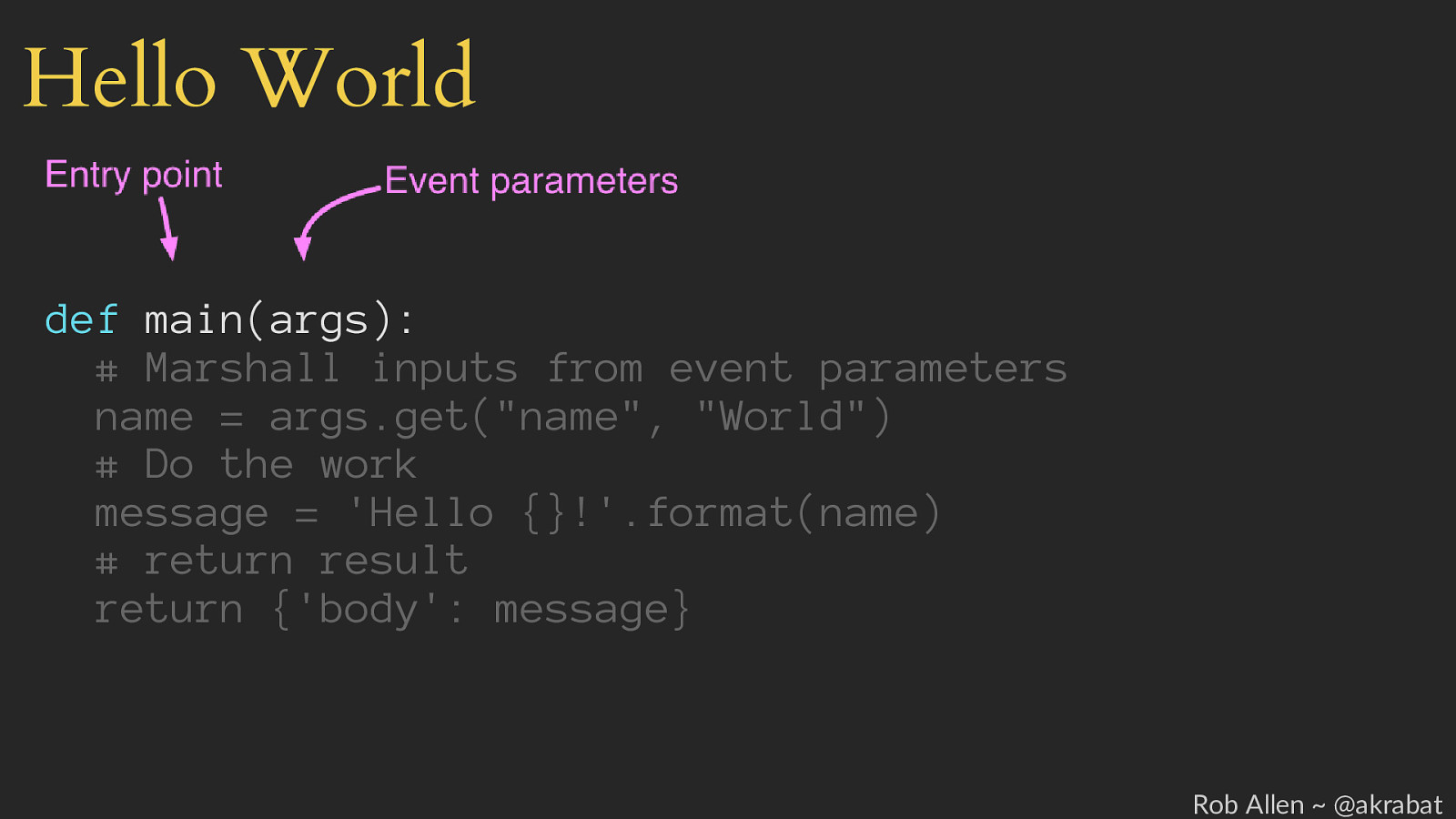
Hello World def main(args): # Marshall inputs from event parameters name = args.get(“name”, “World”) # Do the work message = ‘Hello {}!’.format(name) # return result return {‘body’: message} Rob Allen ~ @akrabat
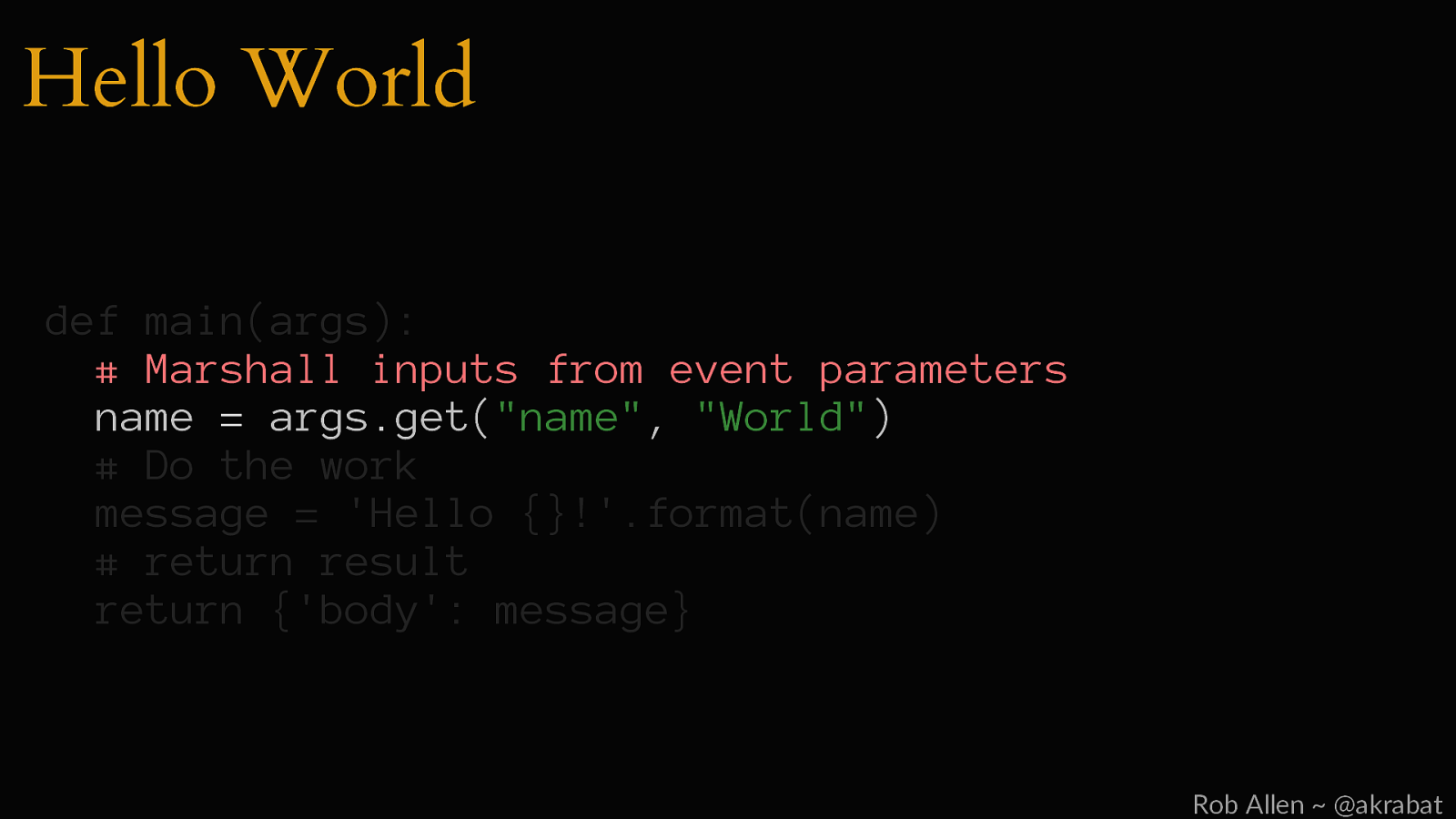
Hello World def main(args): # Marshall inputs from event parameters name = args.get(“name”, “World”) # Do the work message = ‘Hello {}!’.format(name) # return result return {‘body’: message} Rob Allen ~ @akrabat
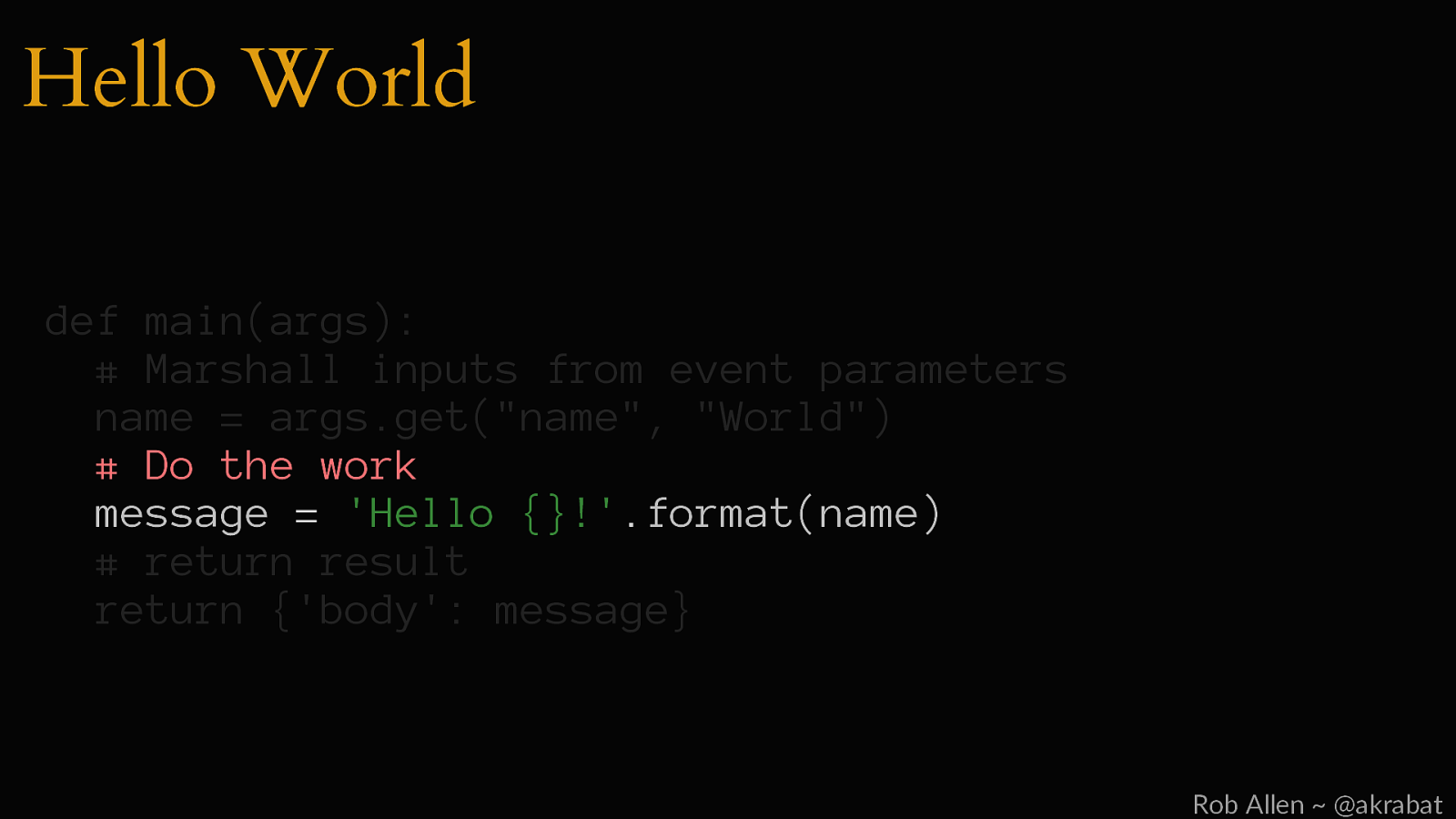
Hello World def main(args): # Marshall inputs from event parameters name = args.get(“name”, “World”) # Do the work message = ‘Hello {}!’.format(name) # return result return {‘body’: message} Rob Allen ~ @akrabat
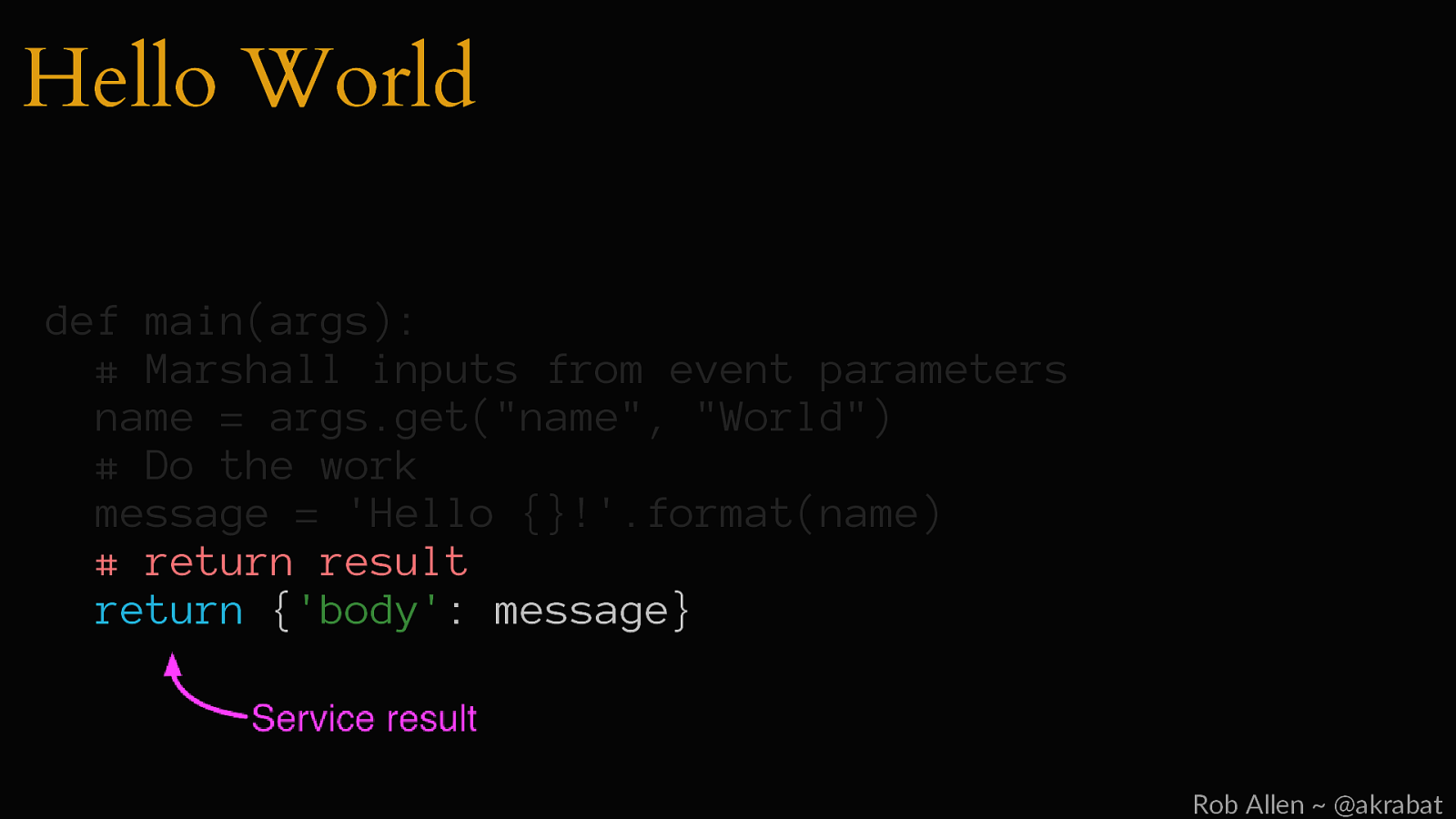
Hello World def main(args): # Marshall inputs from event parameters name = args.get(“name”, “World”) # Do the work message = ‘Hello {}!’.format(name) # return result return {‘body’: message} Rob Allen ~ @akrabat
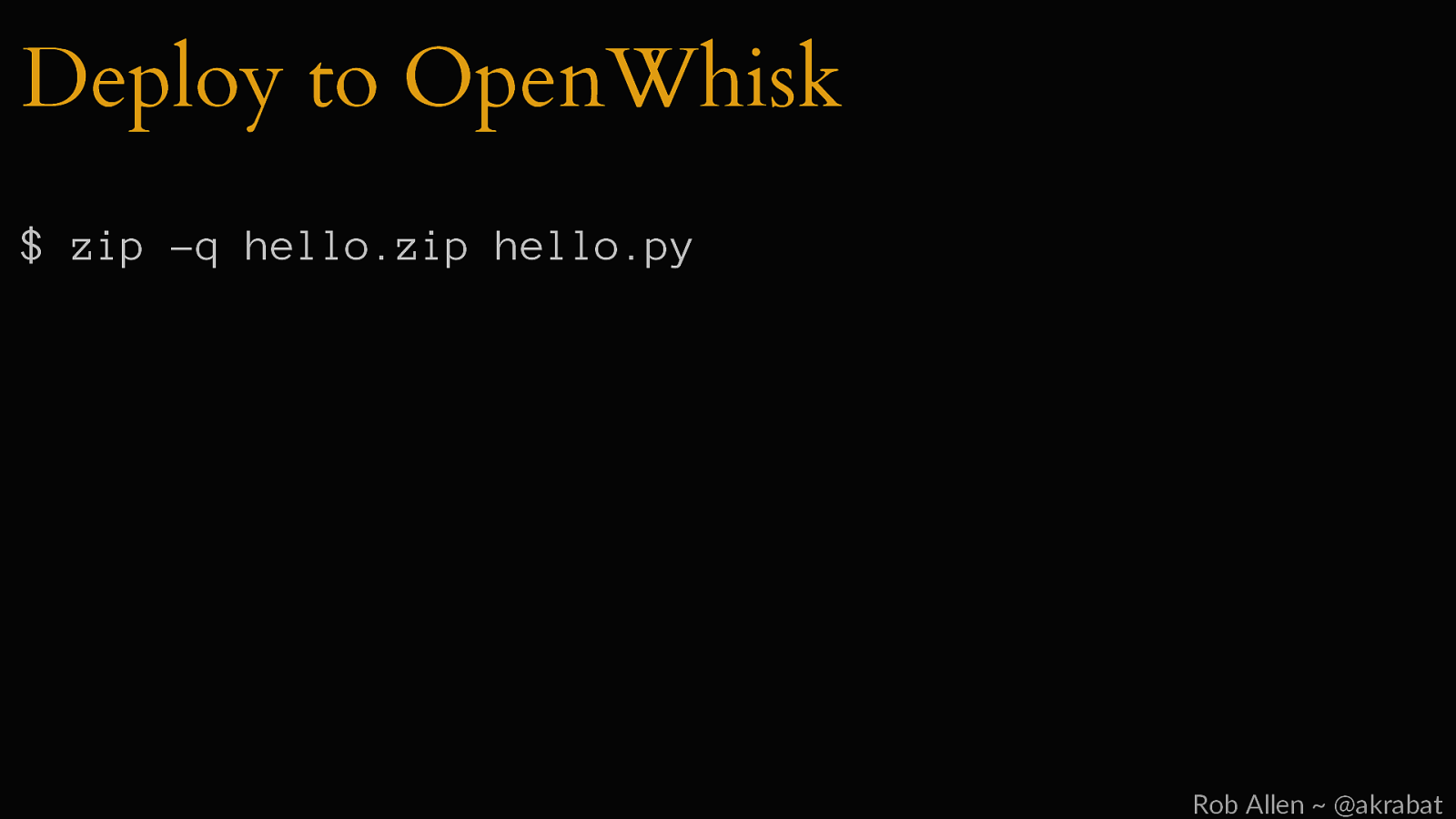
Deploy to OpenWhisk $ zip -q hello.zip hello.py Rob Allen ~ @akrabat
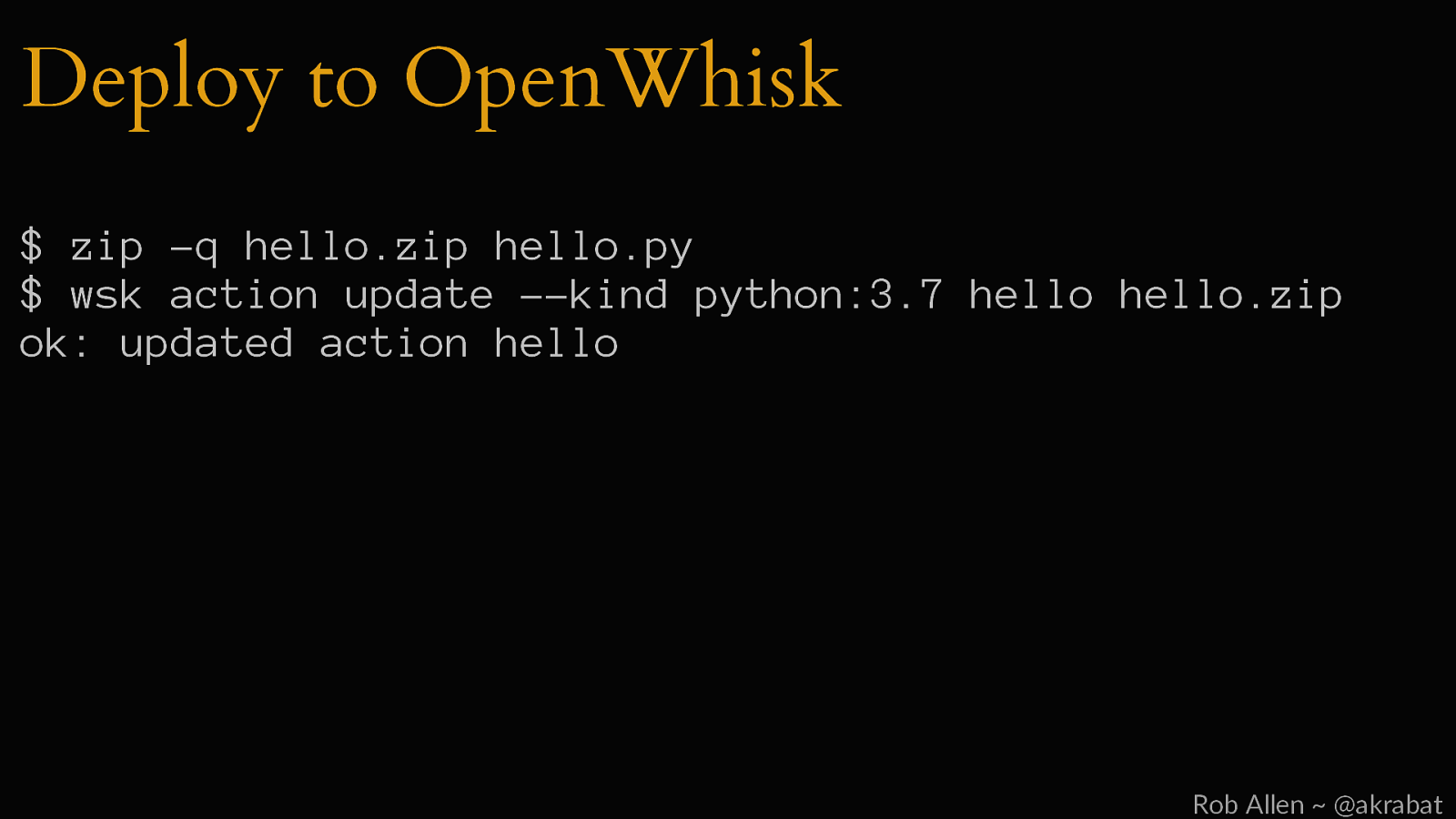
Deploy to OpenWhisk $ zip -q hello.zip hello.py $ wsk action update —kind python:3.7 hello hello.zip ok: updated action hello Rob Allen ~ @akrabat
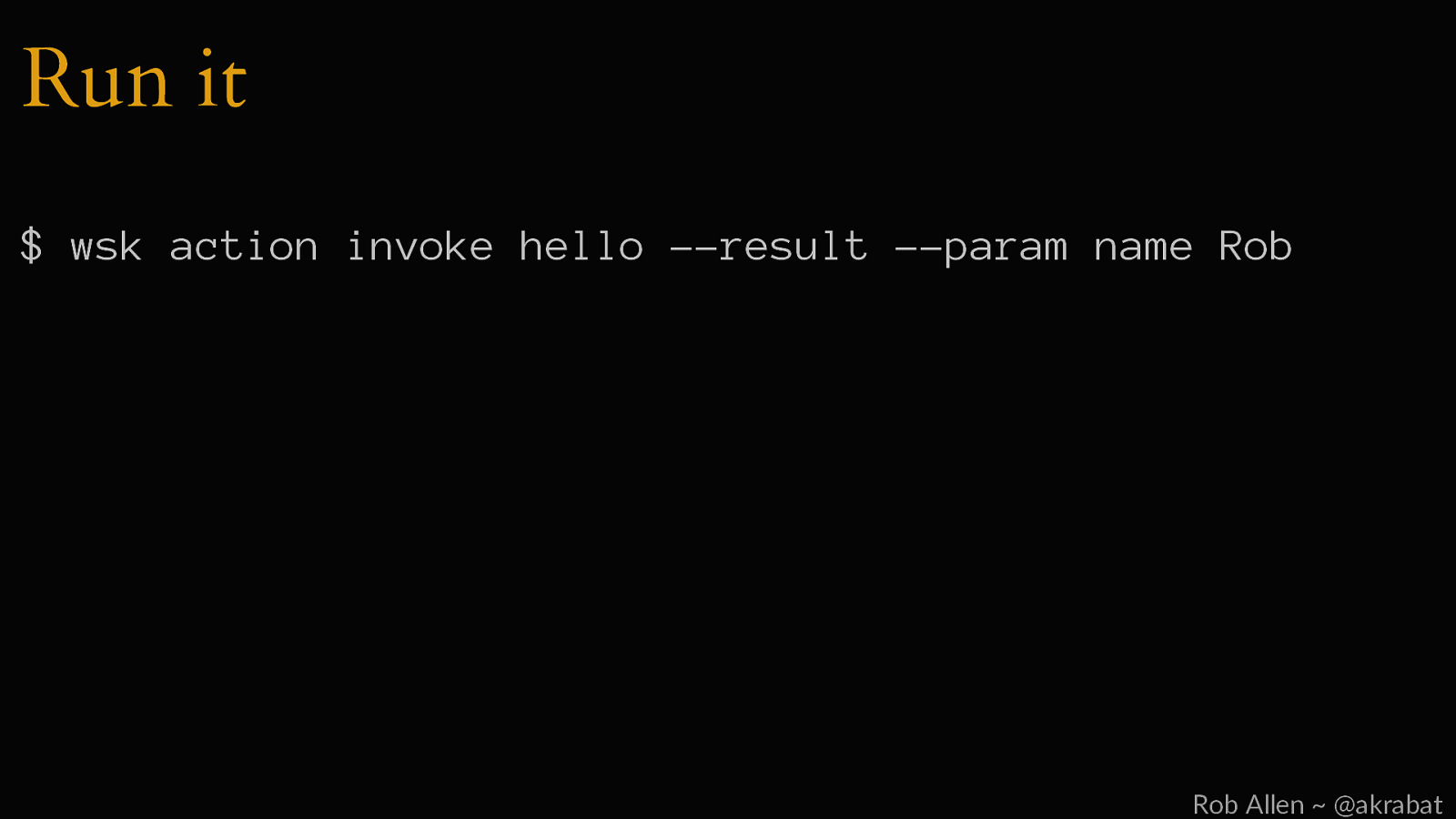
Run it $ wsk action invoke hello —result —param name Rob Rob Allen ~ @akrabat
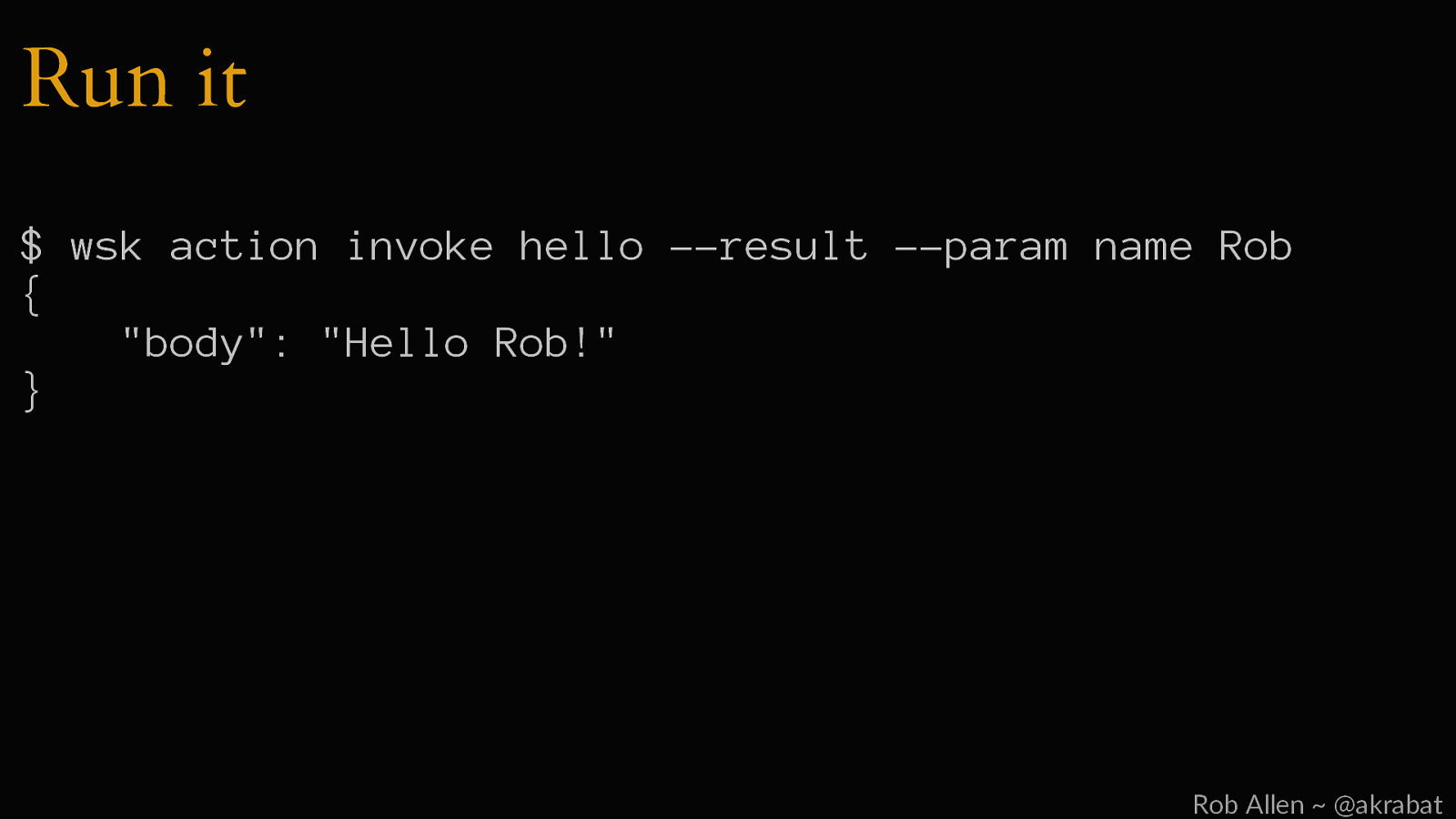
Run it $ wsk action invoke hello —result —param name Rob { “body”: “Hello Rob!” } Rob Allen ~ @akrabat

Under the hood Rob Allen ~ @akrabat
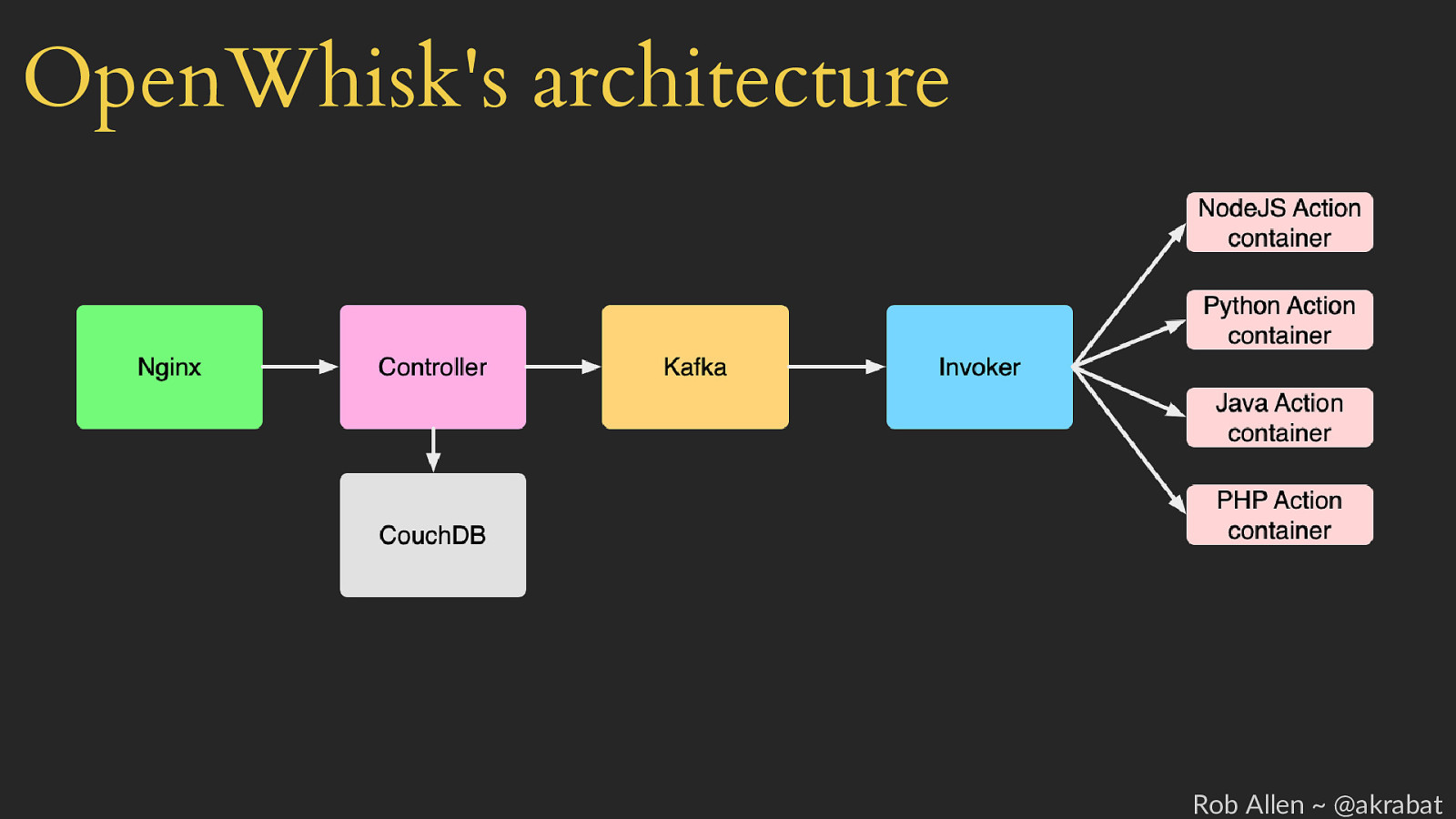
OpenWhisk’s architecture Rob Allen ~ @akrabat
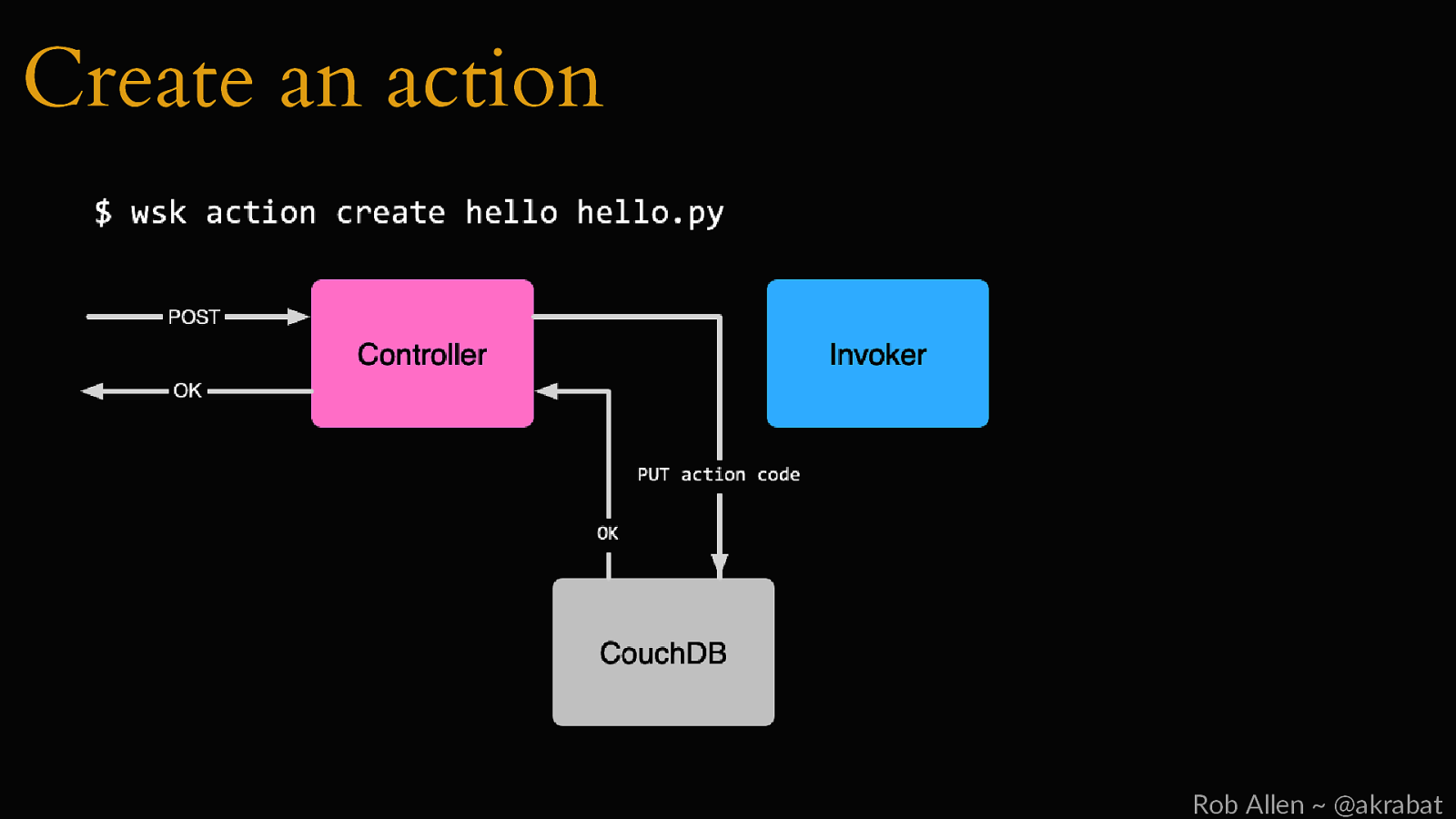
Create an action Rob Allen ~ @akrabat
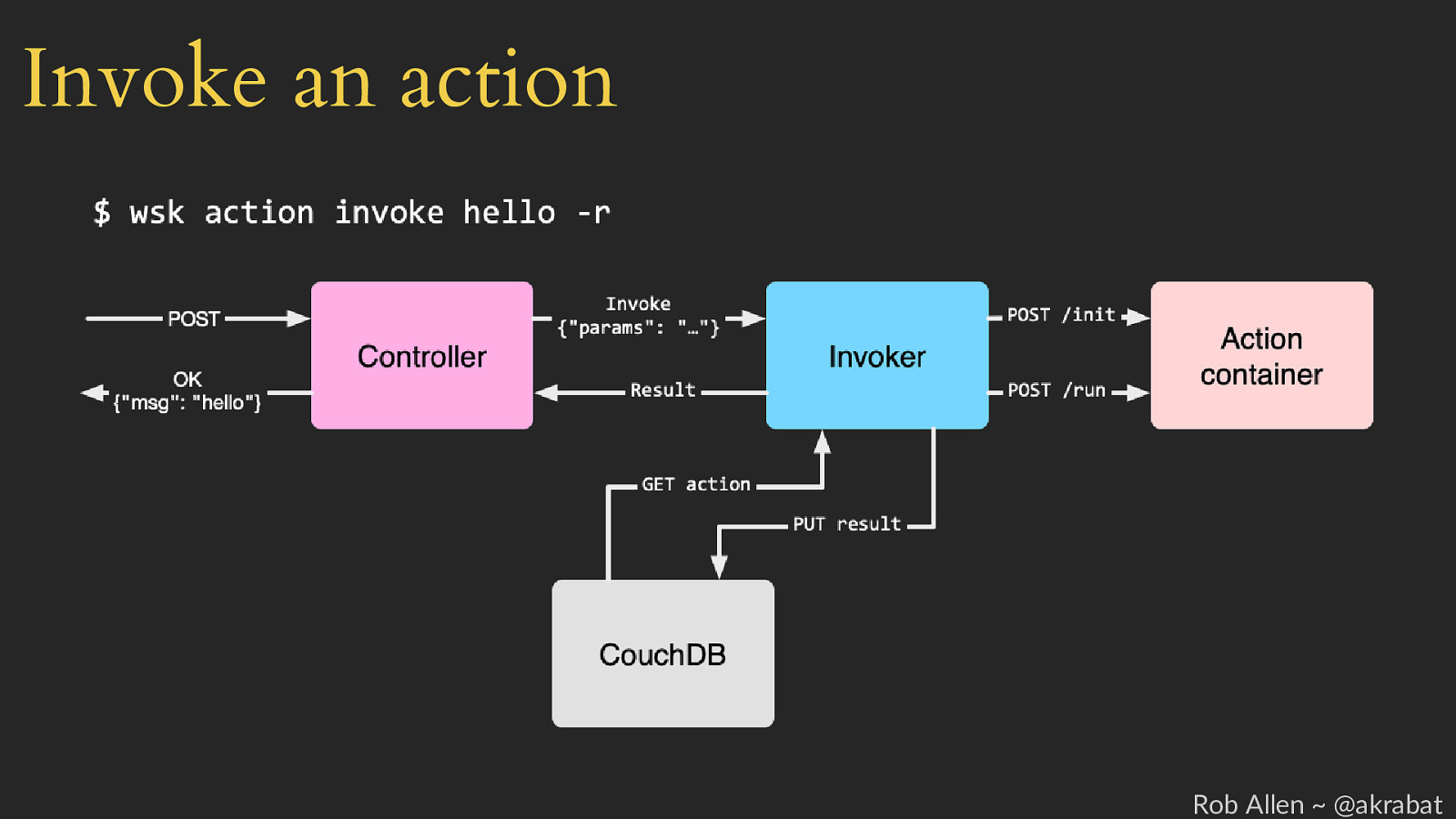
Invoke an action Rob Allen ~ @akrabat
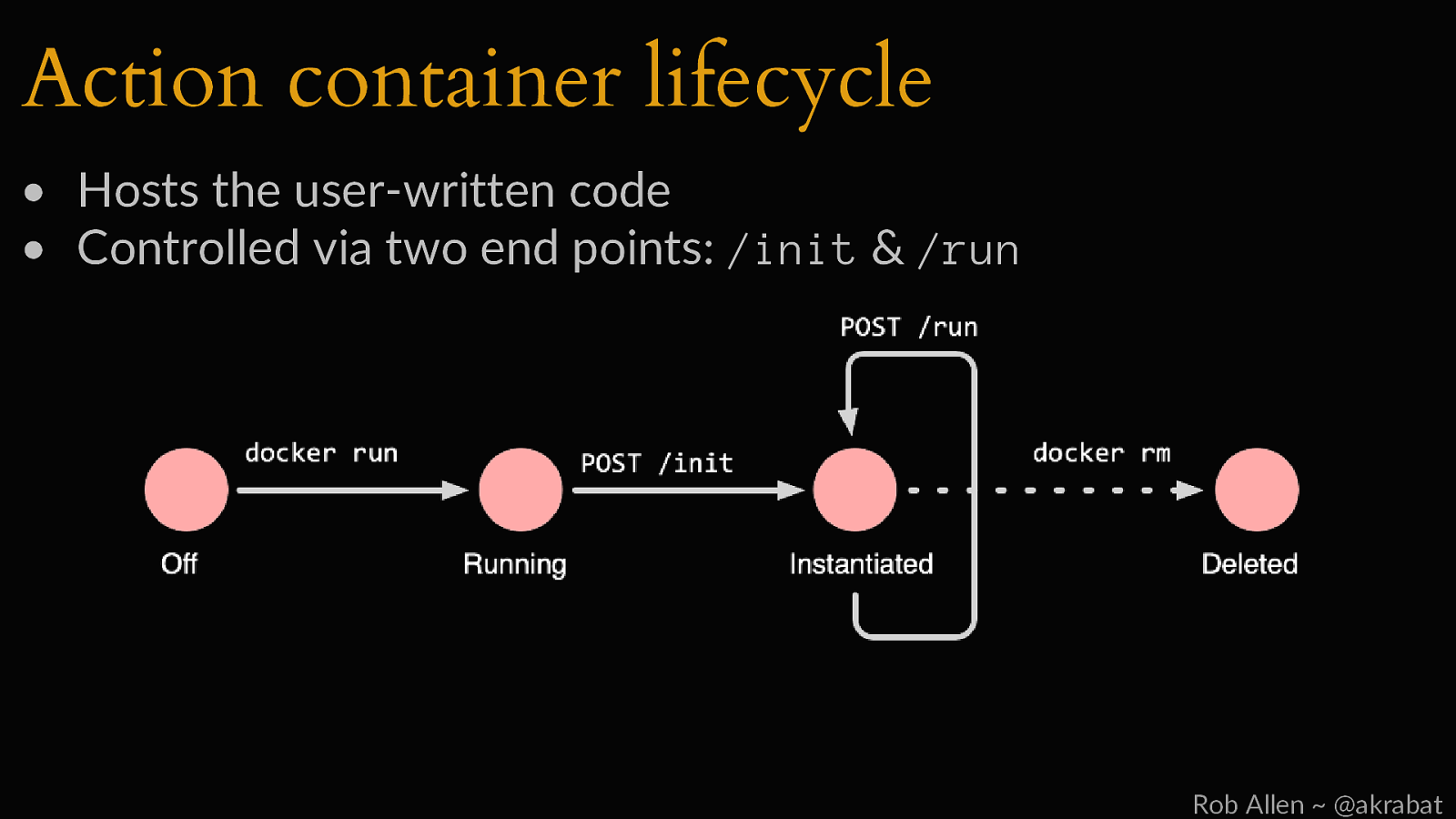
Action container lifecycle • Hosts the user-written code • Controlled via two end points: /init & /run Rob Allen ~ @akrabat
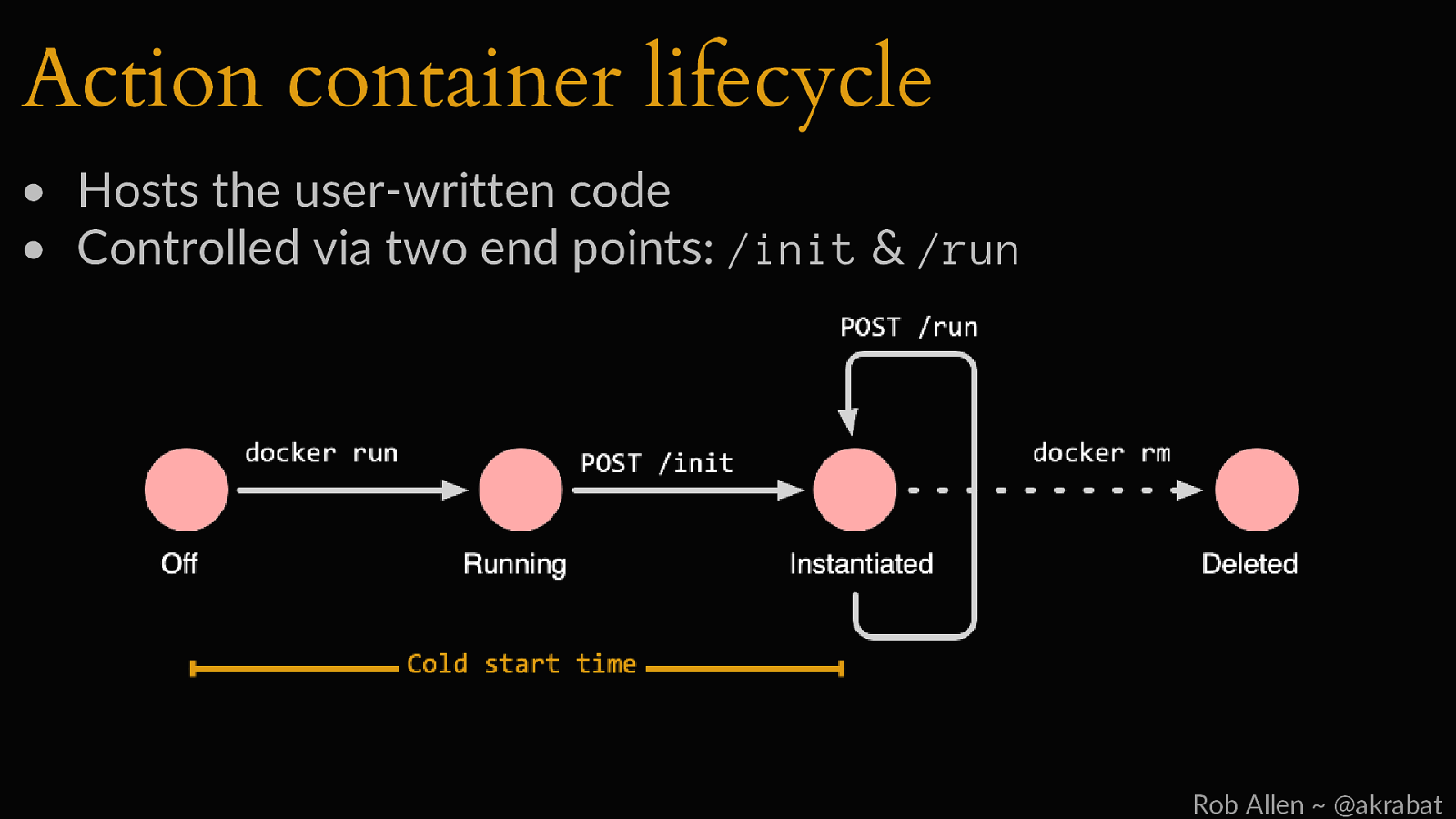
Action container lifecycle • Hosts the user-written code • Controlled via two end points: /init & /run Rob Allen ~ @akrabat

Architecture Rob Allen ~ @akrabat
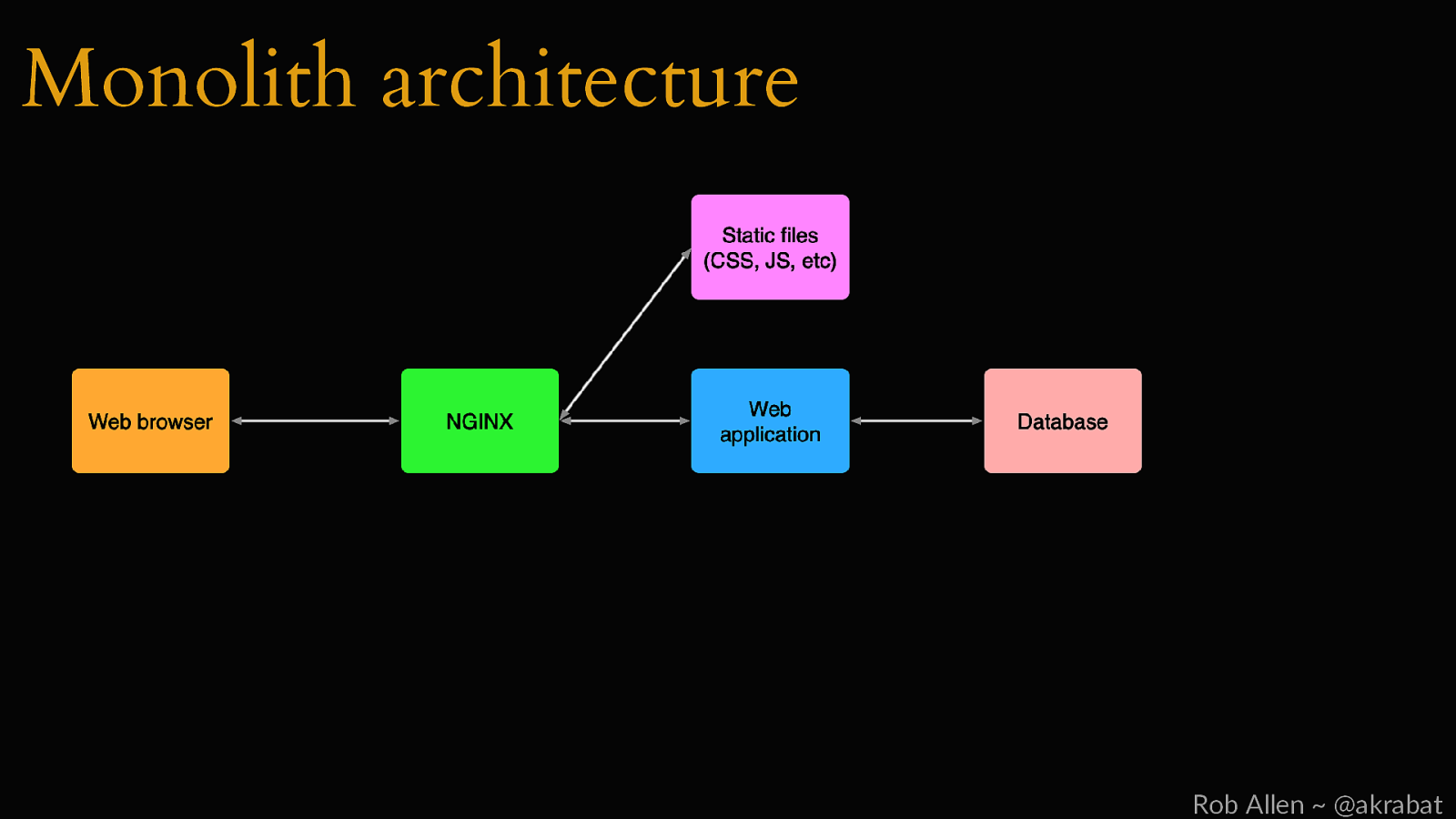
Monolith architecture Rob Allen ~ @akrabat
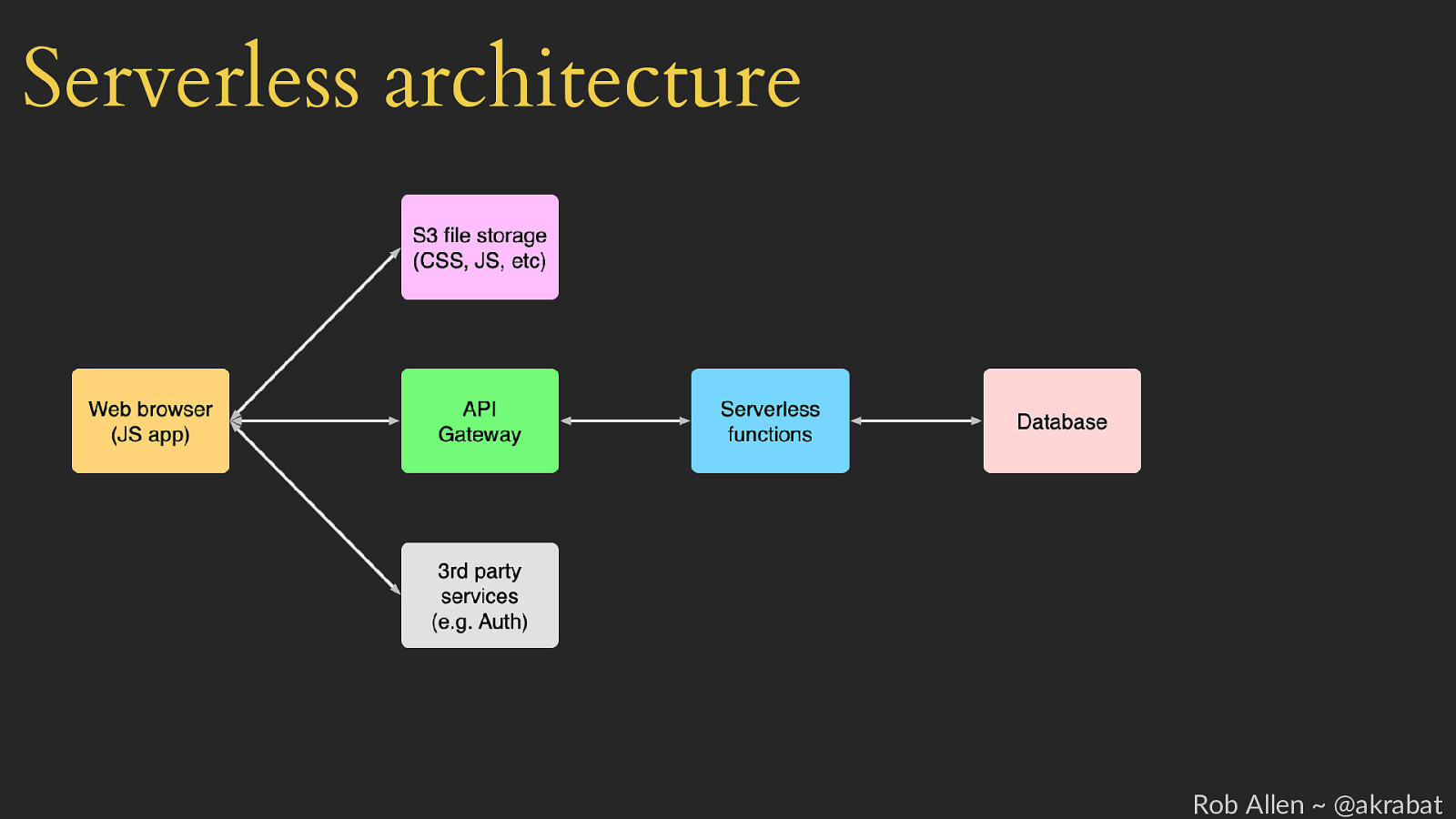
Serverless architecture Rob Allen ~ @akrabat
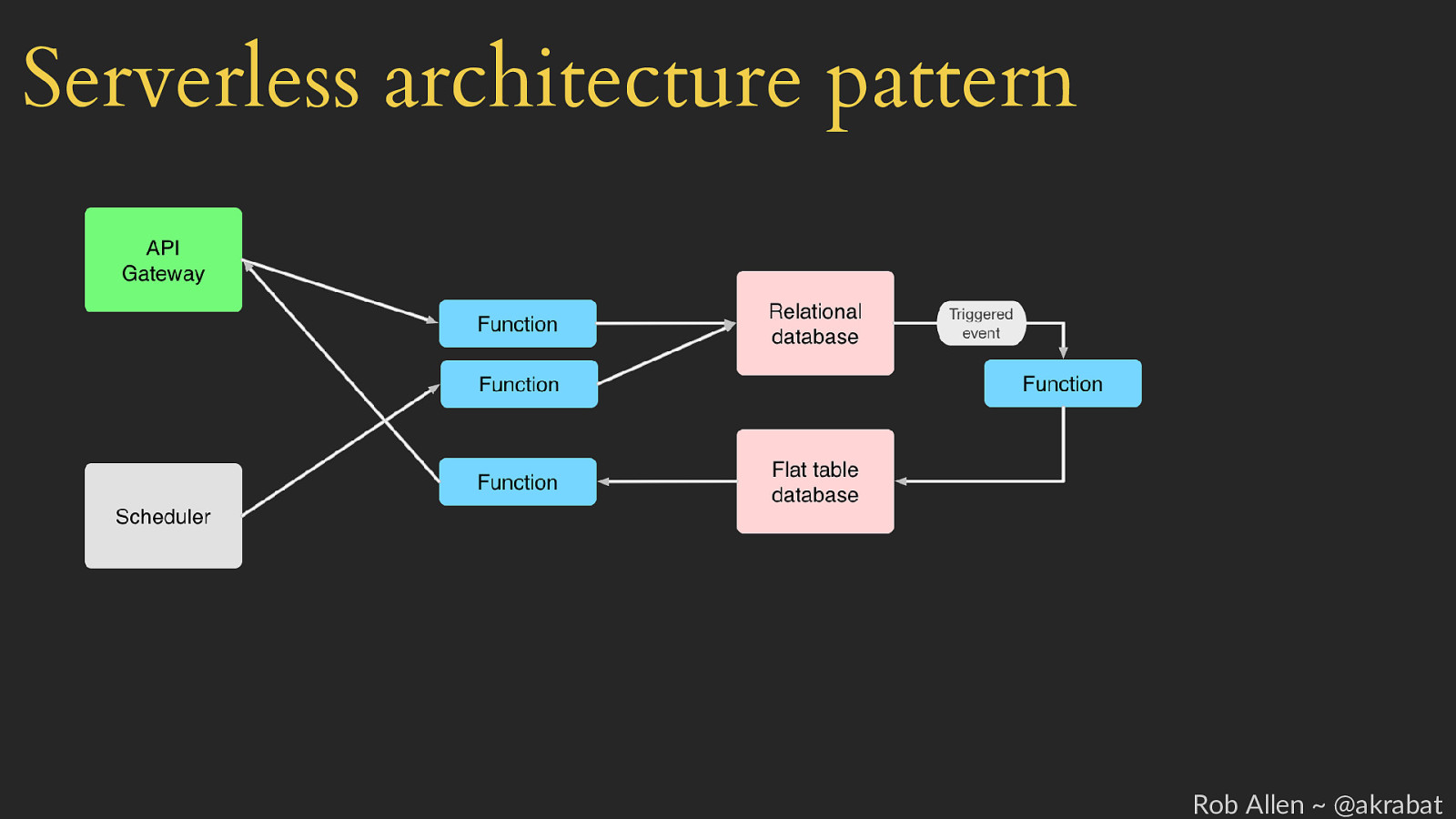
Serverless architecture pattern Rob Allen ~ @akrabat
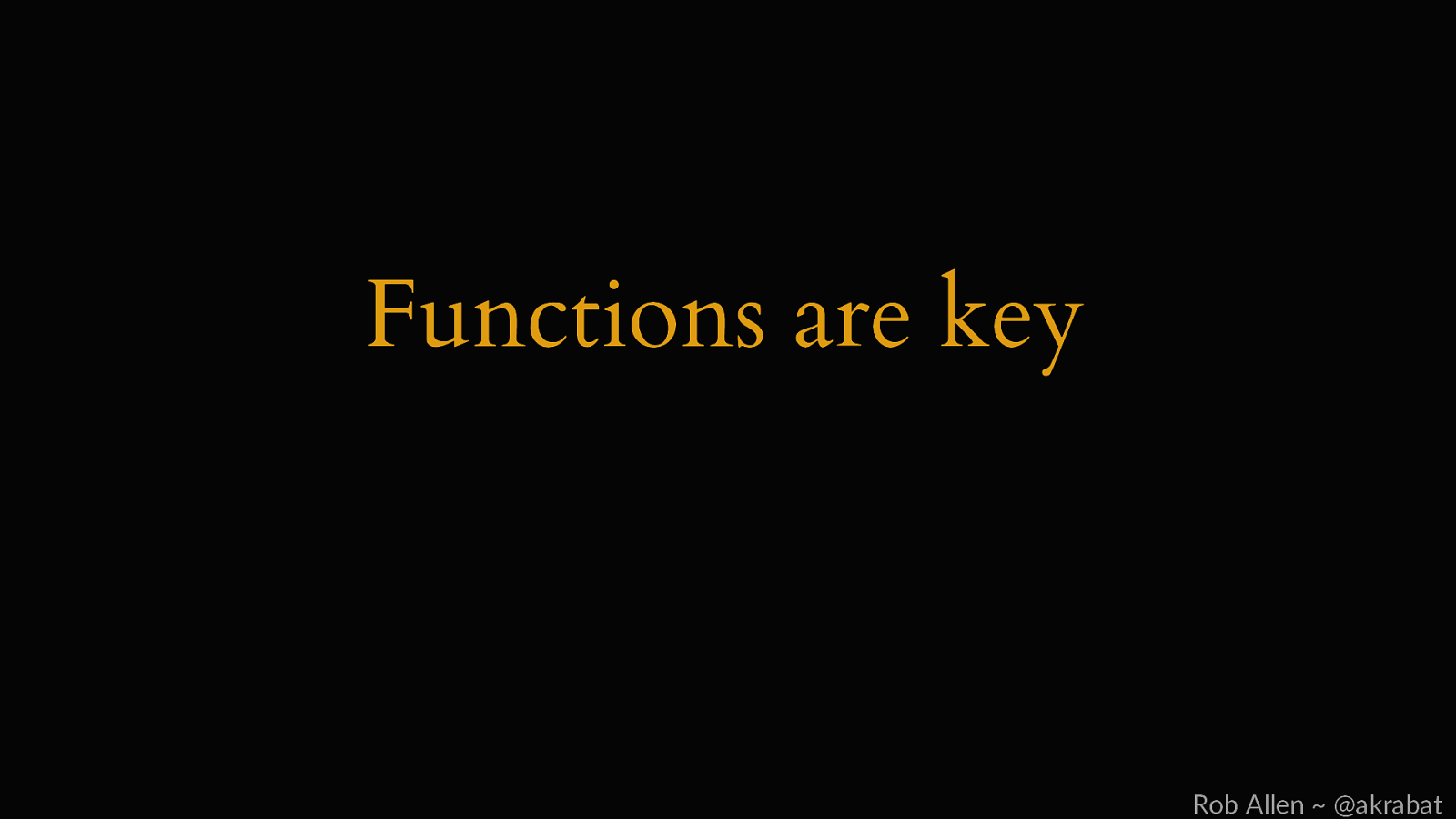
Functions are key Rob Allen ~ @akrabat
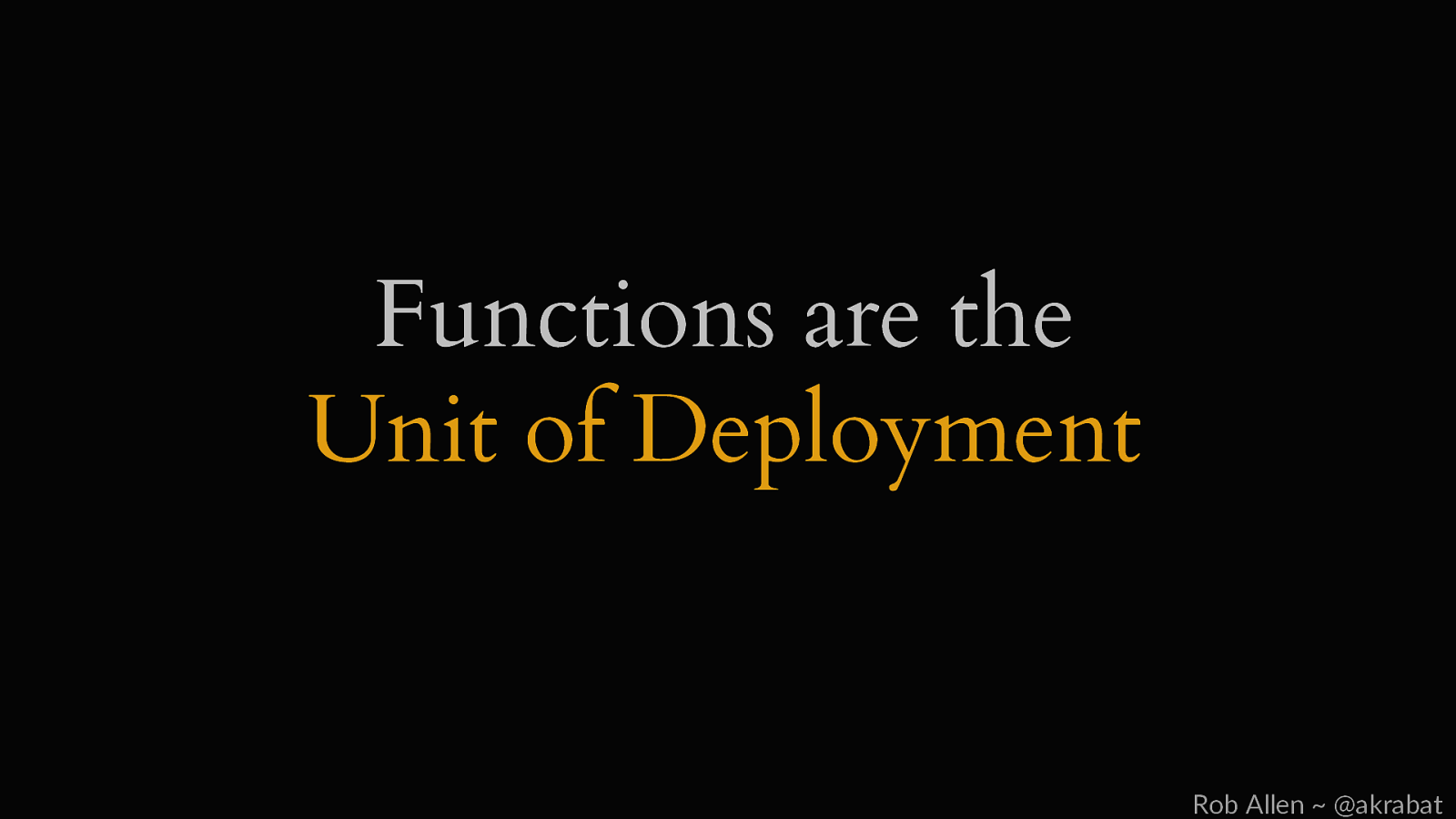
Functions are the Unit of Deployment Rob Allen ~ @akrabat
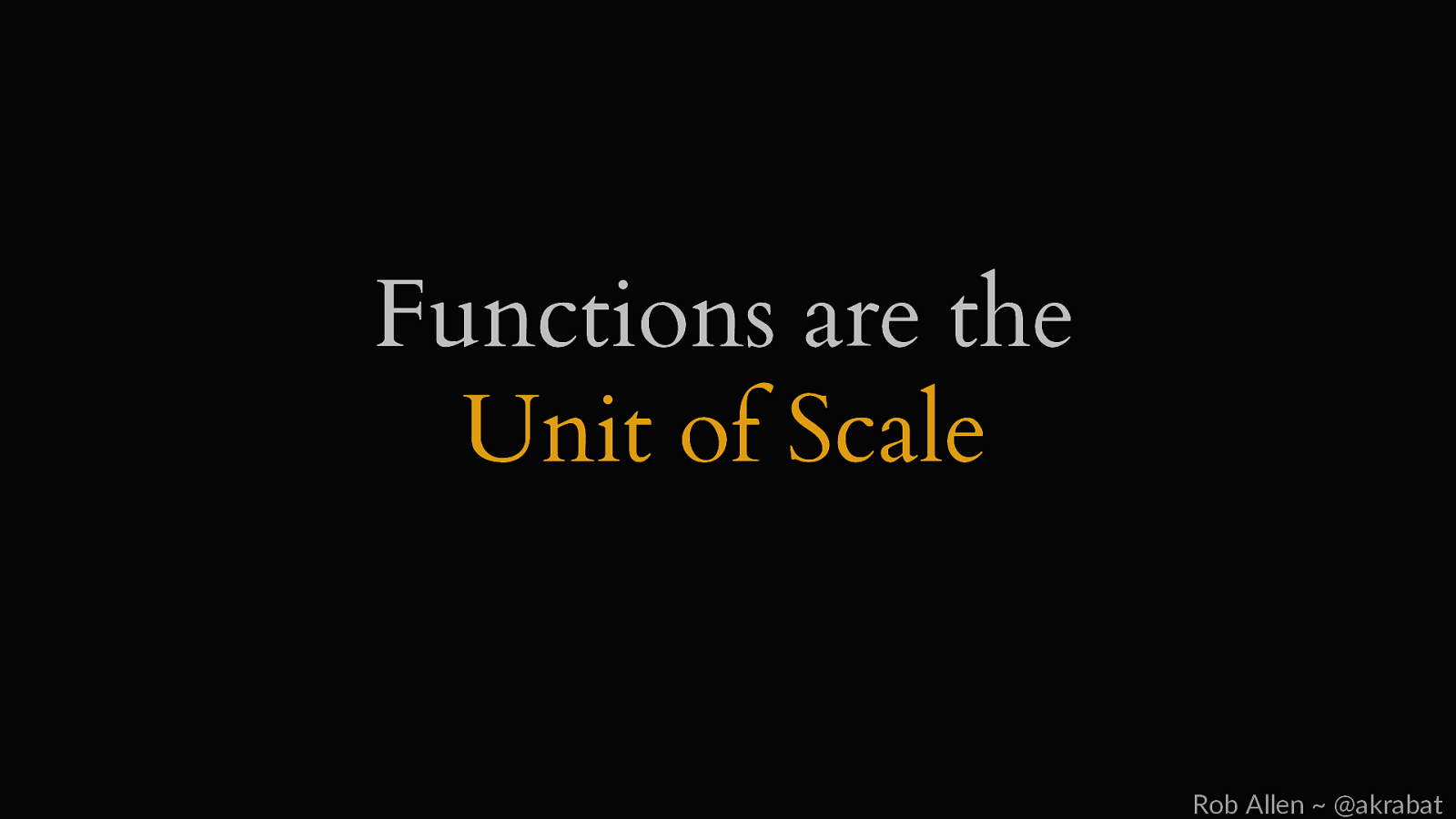
Functions are the Unit of Scale Rob Allen ~ @akrabat
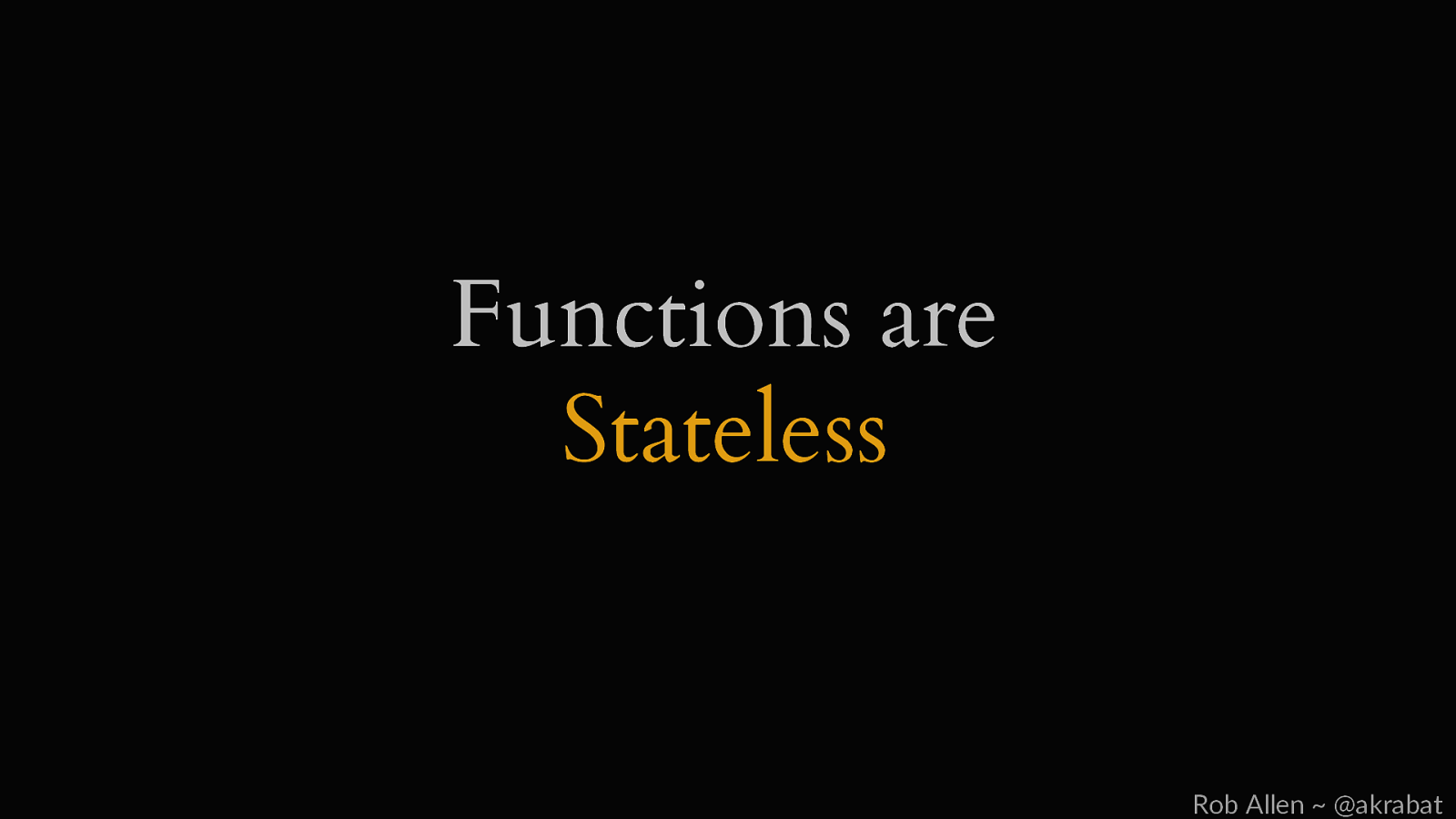
Functions are Stateless Rob Allen ~ @akrabat
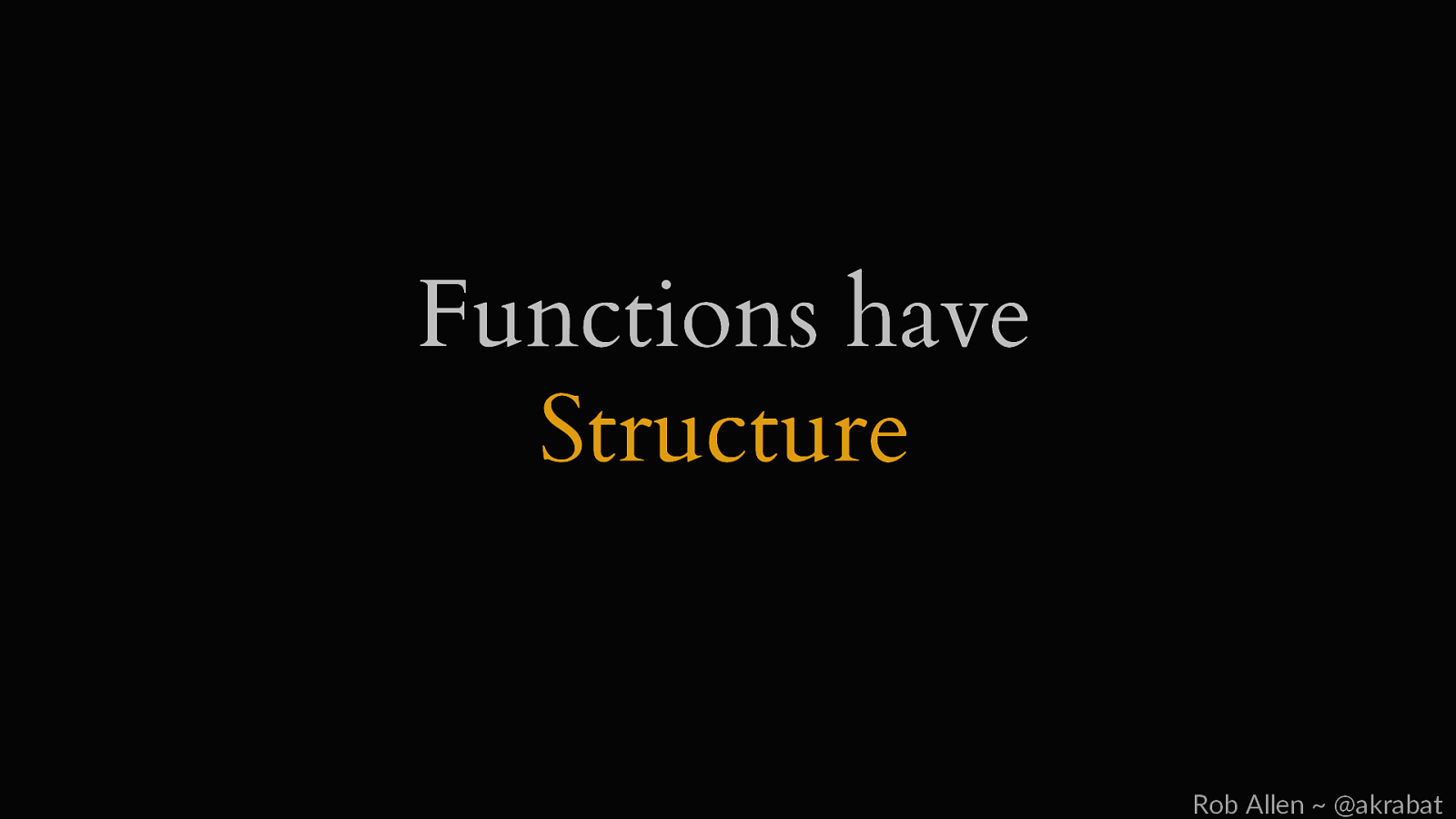
Functions have Structure Rob Allen ~ @akrabat
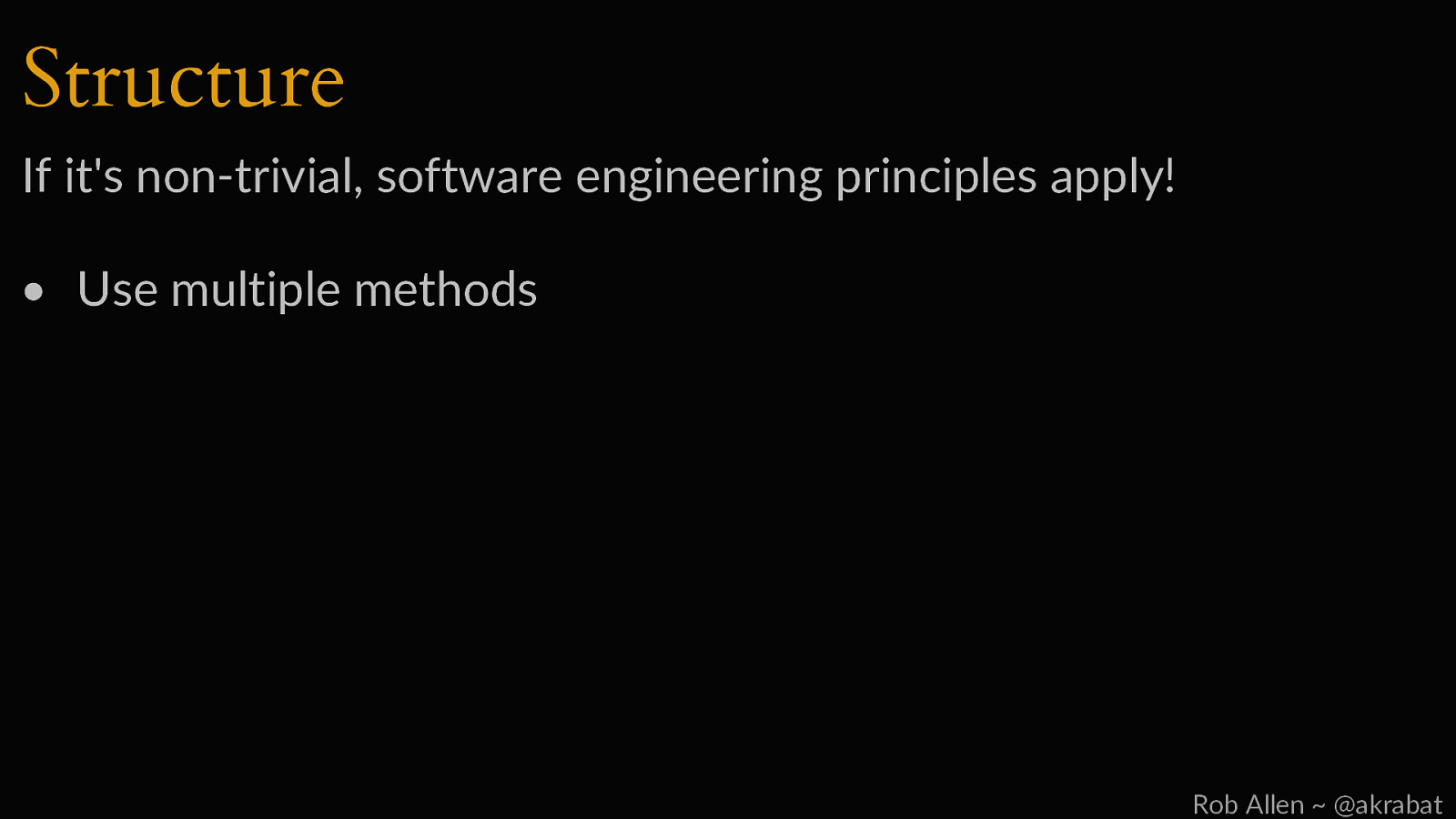
Structure If it’s non-trivial, software engineering principles apply! • Use multiple methods Rob Allen ~ @akrabat
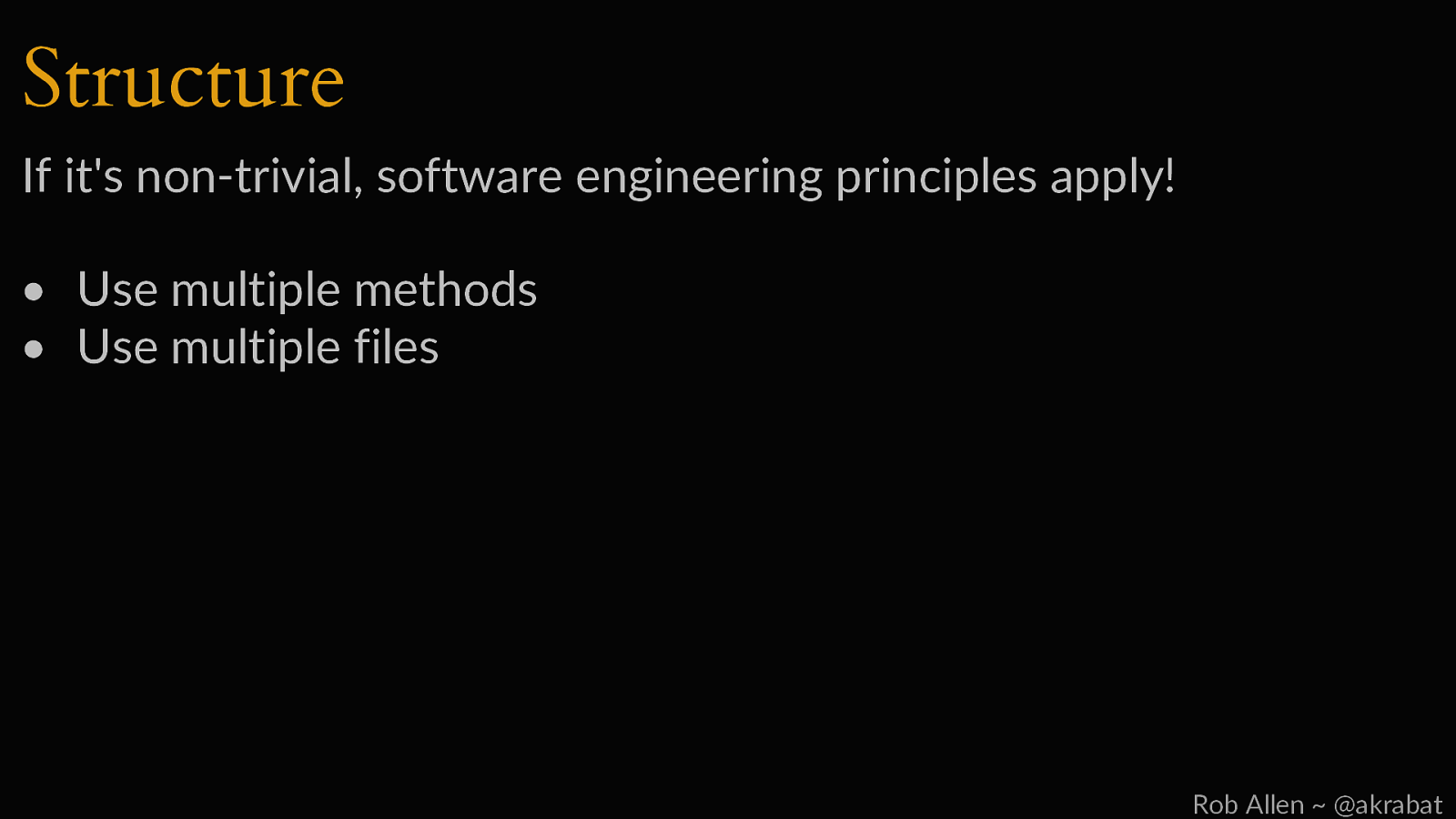
Structure If it’s non-trivial, software engineering principles apply! • Use multiple methods • Use multiple files Rob Allen ~ @akrabat
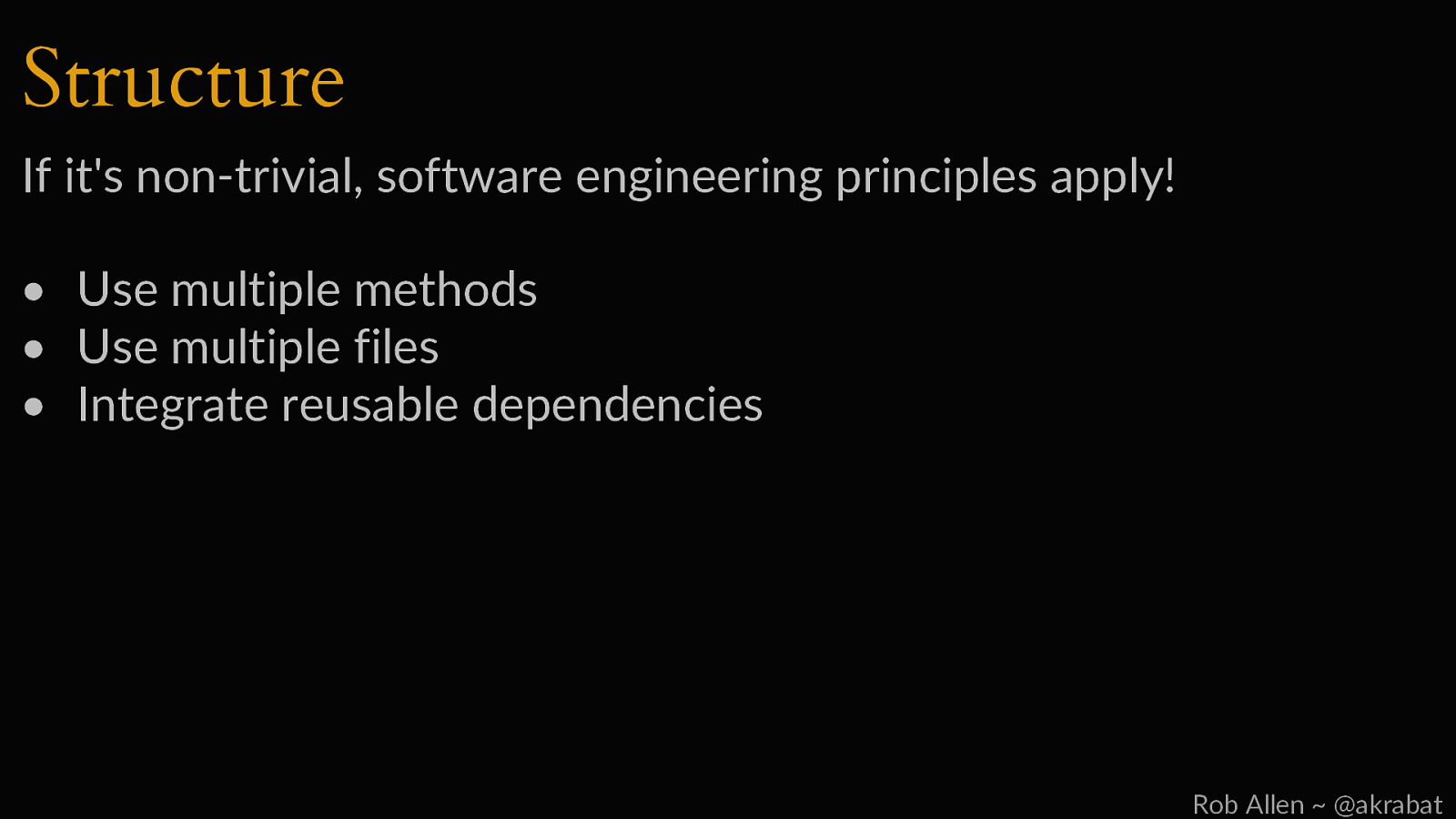
Structure If it’s non-trivial, software engineering principles apply! • Use multiple methods • Use multiple files • Integrate reusable dependencies Rob Allen ~ @akrabat
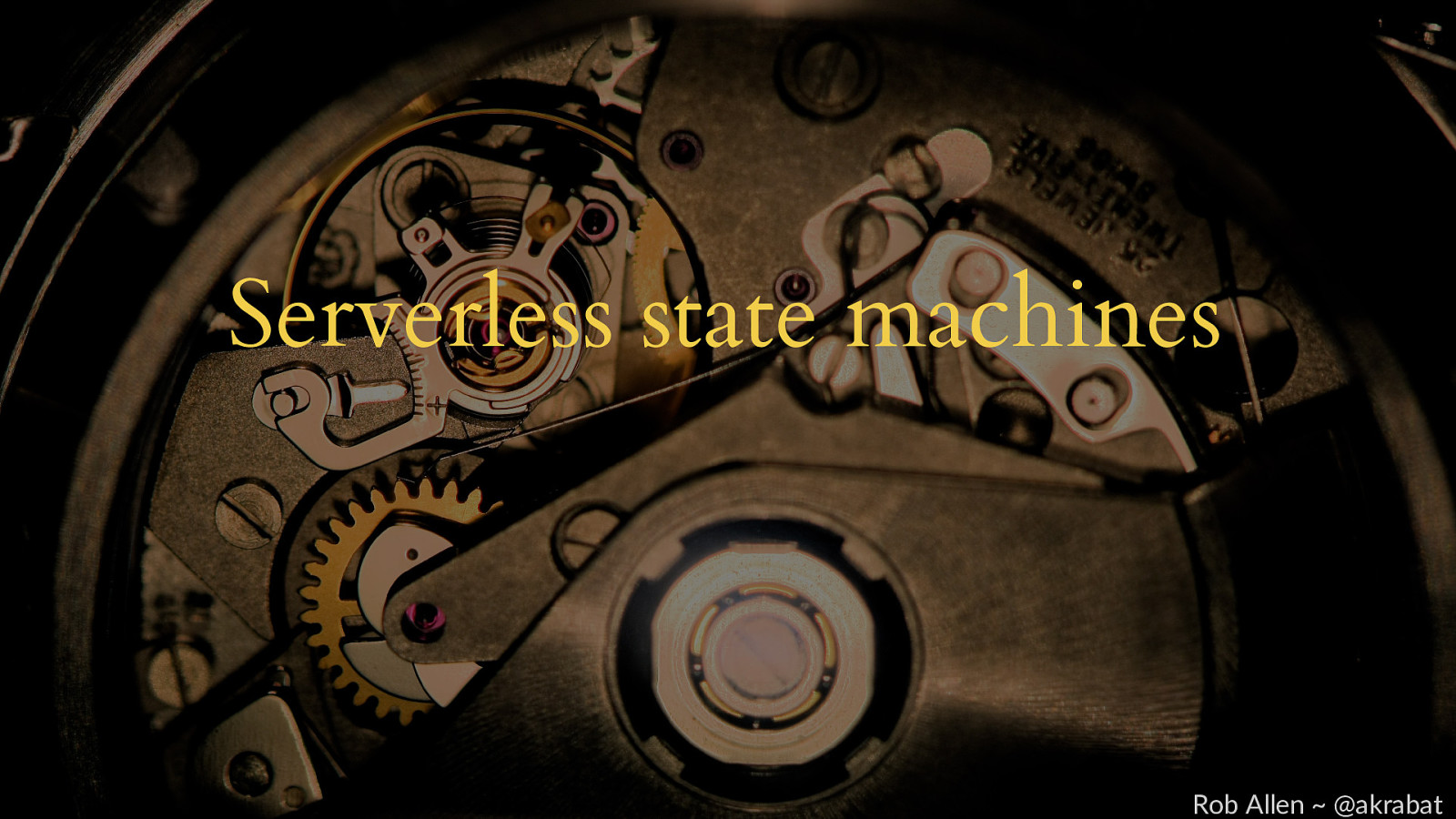
Serverless state machines Rob Allen ~ @akrabat
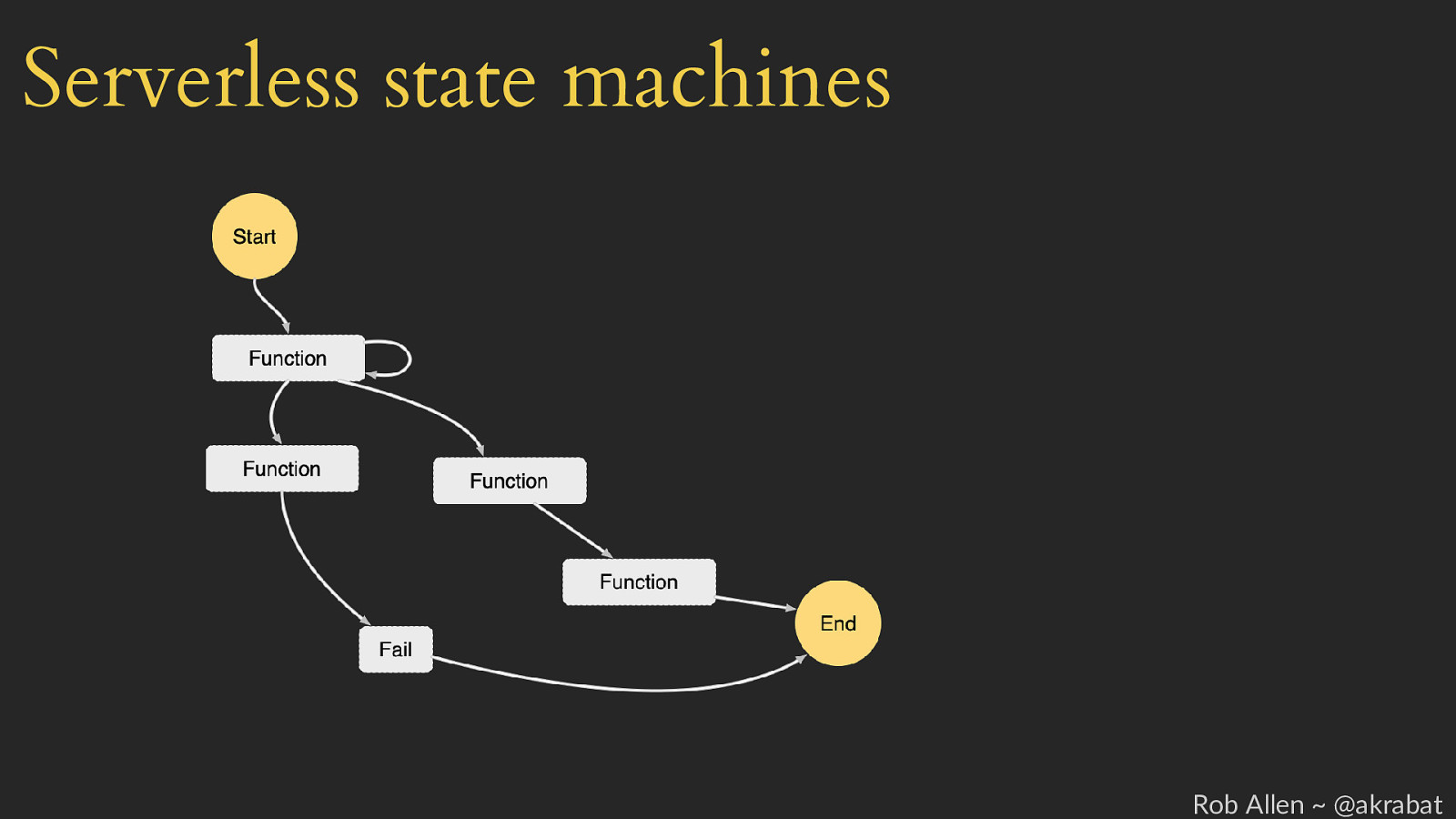
Serverless state machines Rob Allen ~ @akrabat
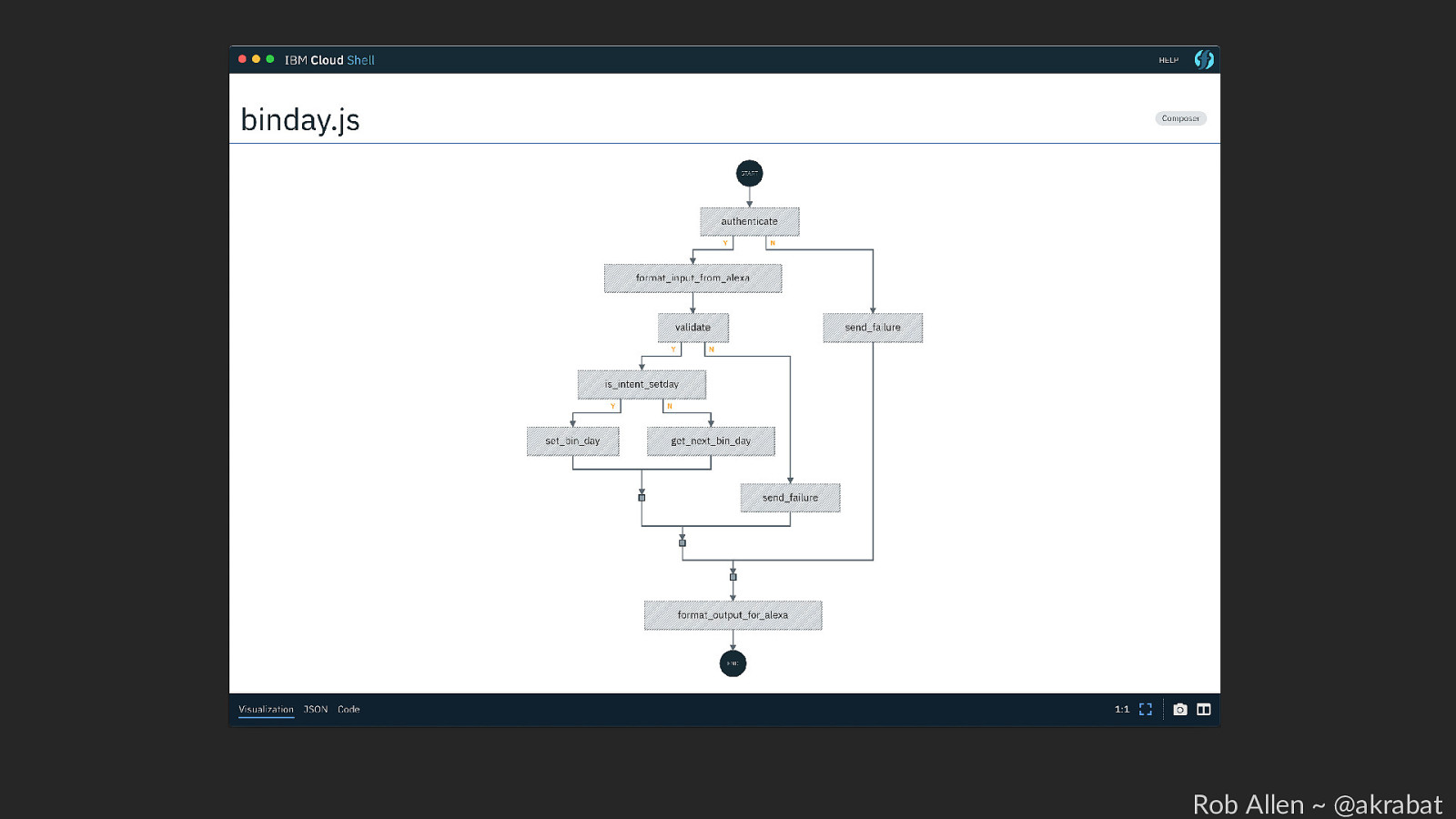
Rob Allen ~ @akrabat
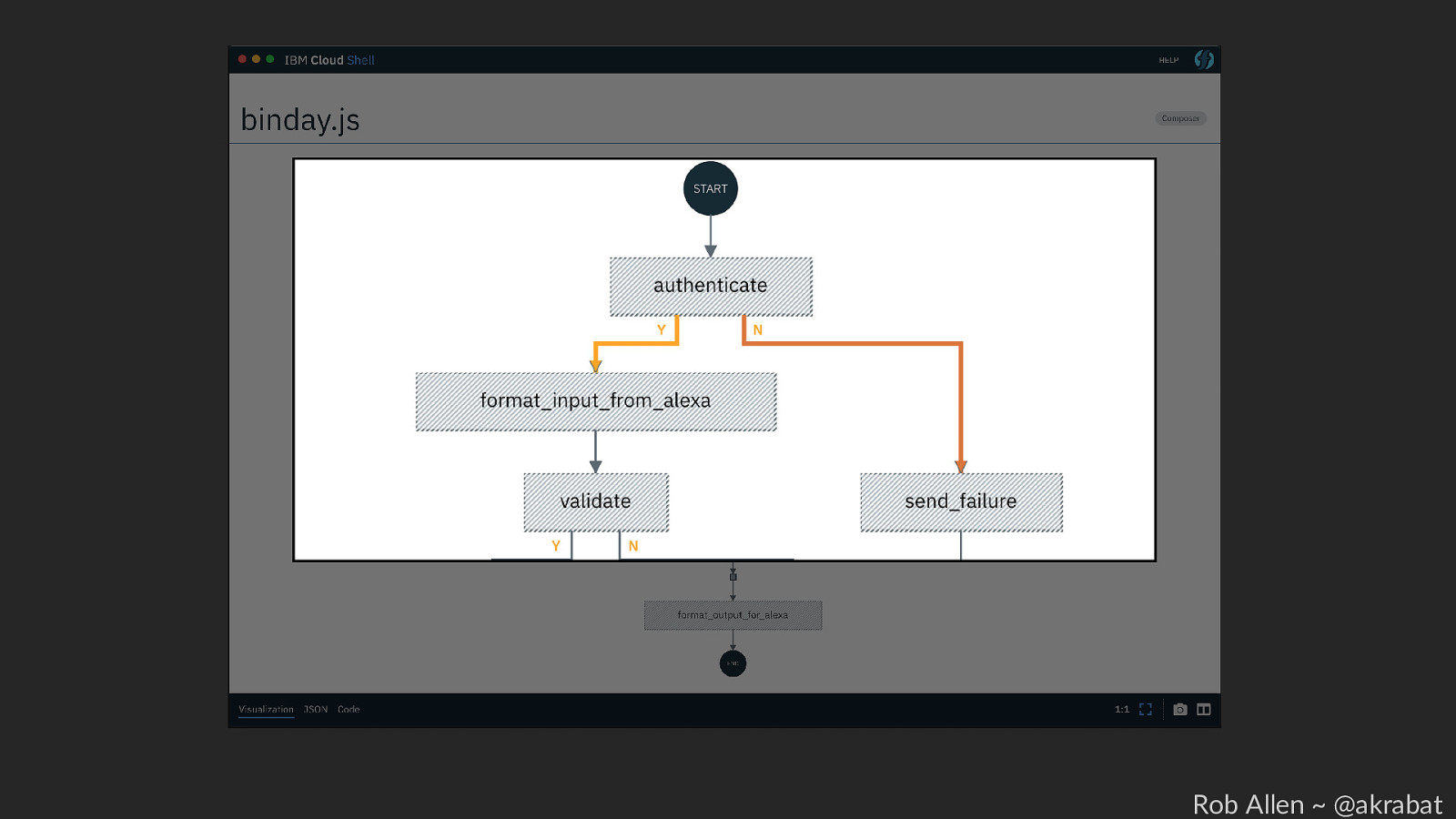
Rob Allen ~ @akrabat

Case study Project 365 photo website Rob Allen ~ @akrabat
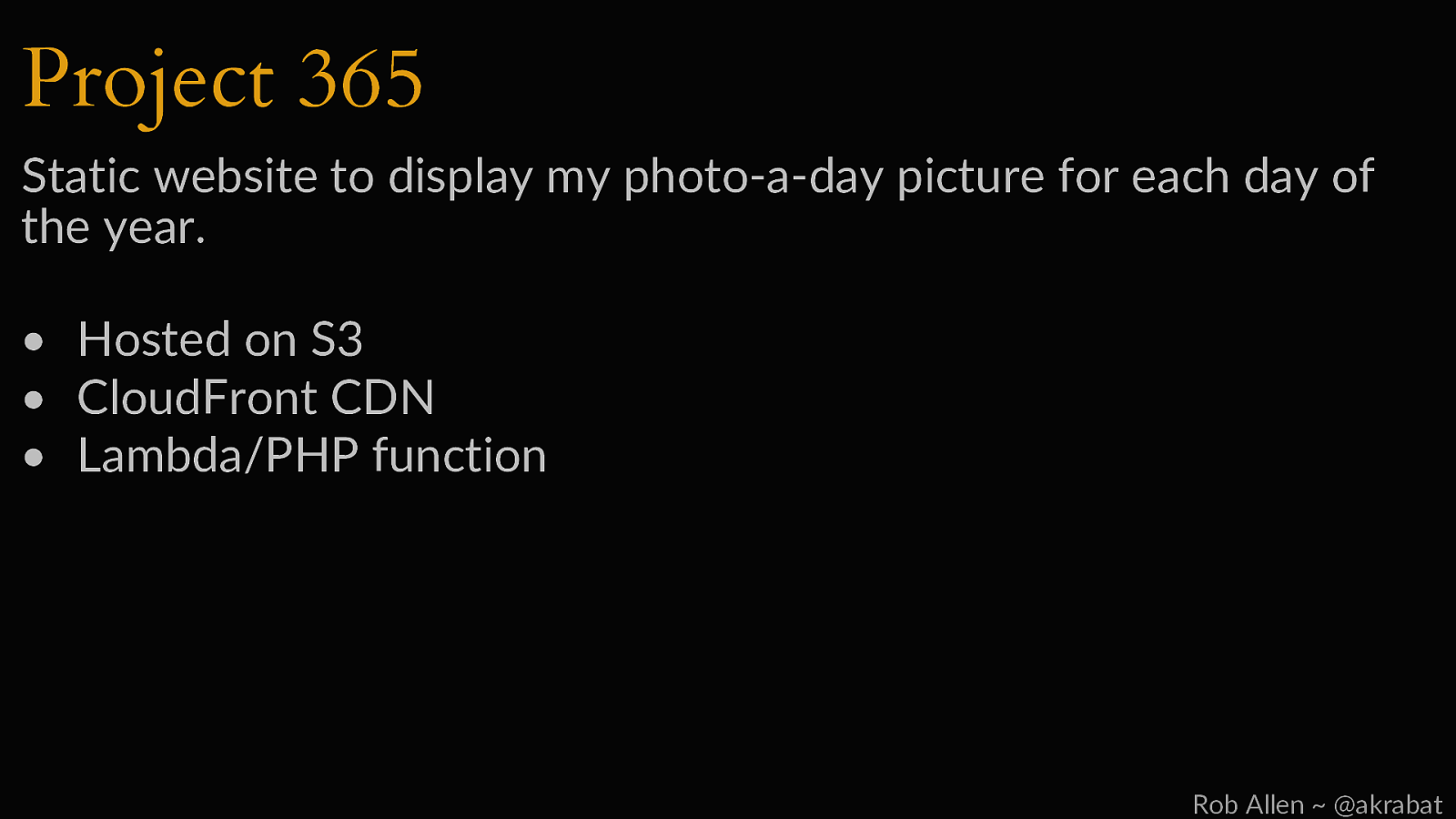
Project 365 Static website to display my photo-a-day picture for each day of the year. • Hosted on S3 • CloudFront CDN • Lambda/PHP function Rob Allen ~ @akrabat
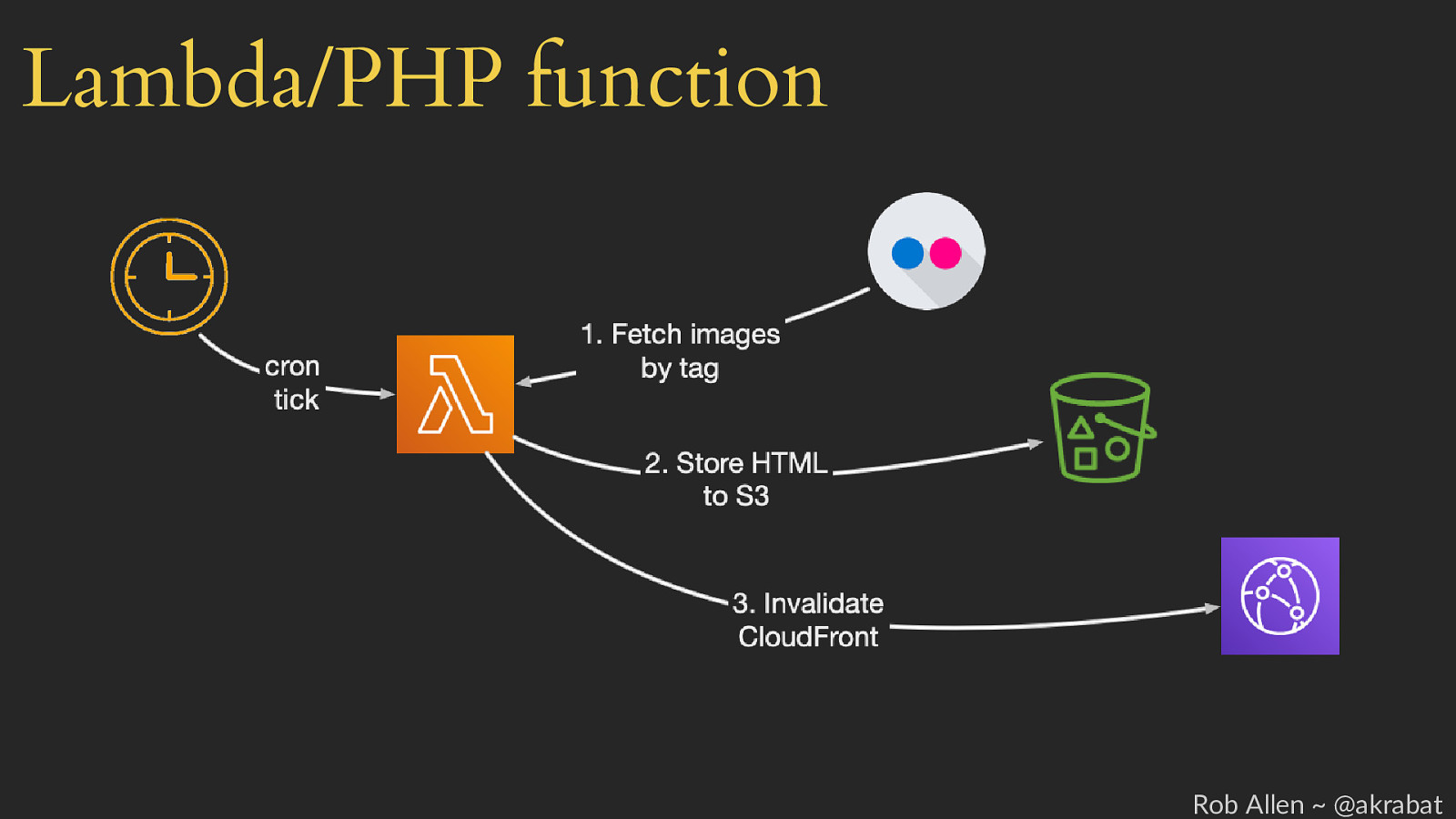
Lambda/PHP function Rob Allen ~ @akrabat
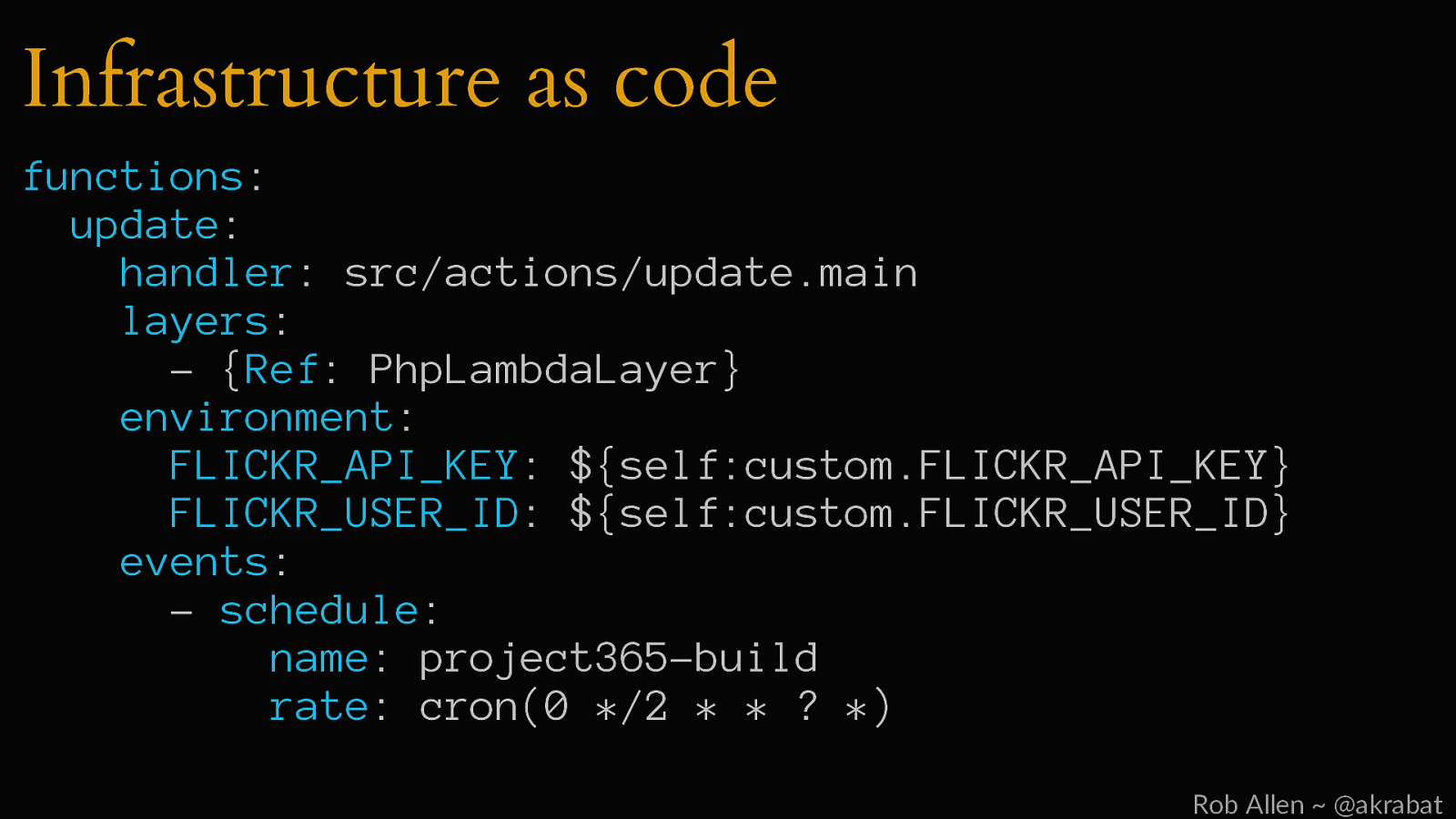
Infrastructure as code functions: update: handler: src/actions/update.main layers: - {Ref: PhpLambdaLayer} environment: FLICKR_API_KEY: ${self:custom.FLICKR_API_KEY} FLICKR_USER_ID: ${self:custom.FLICKR_USER_ID} events: - schedule: name: project365-build rate: cron(0 */2 * * ? *) Rob Allen ~ @akrabat
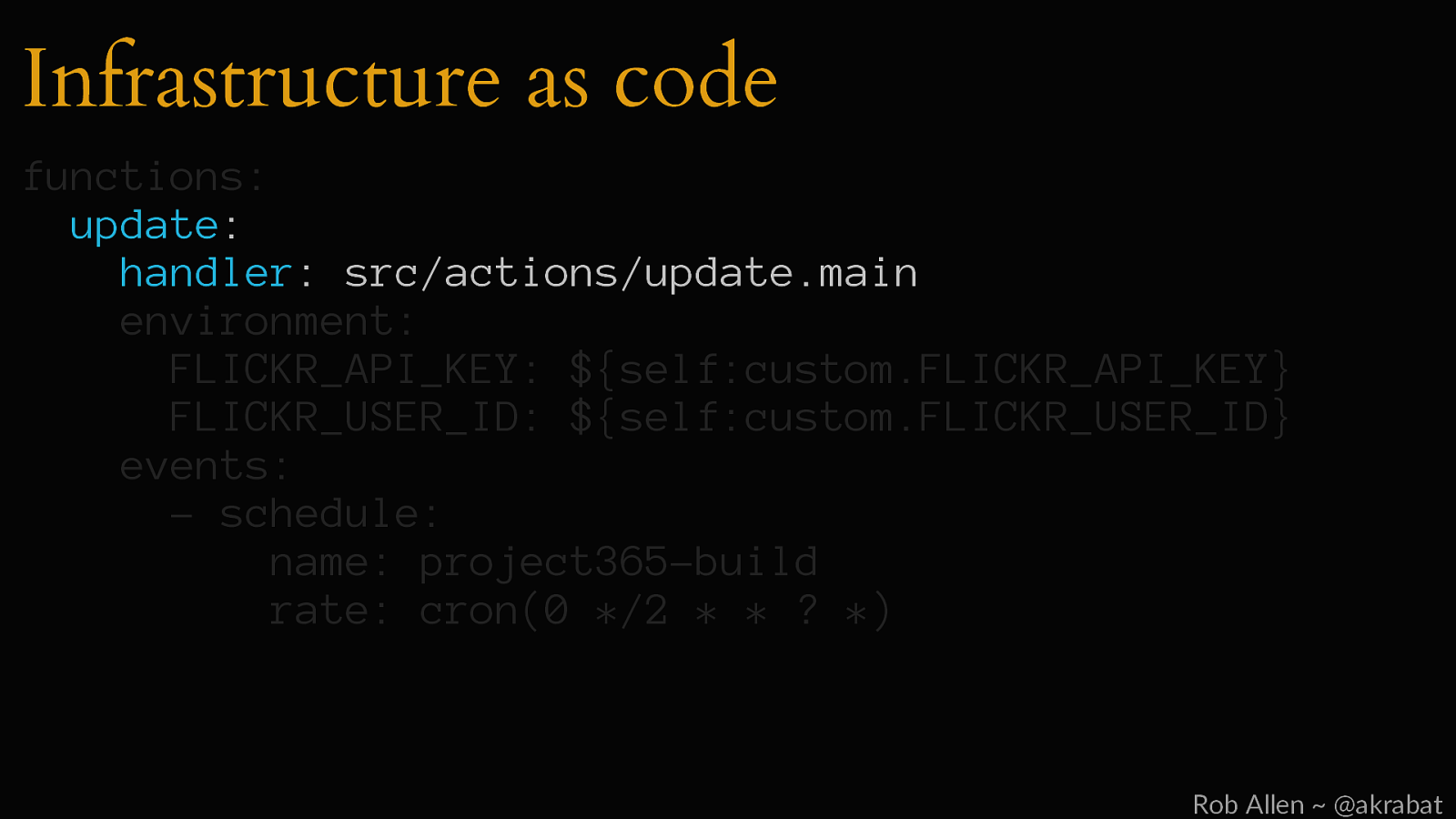
Infrastructure as code functions: update: handler: src/actions/update.main environment: FLICKR_API_KEY: ${self:custom.FLICKR_API_KEY} FLICKR_USER_ID: ${self:custom.FLICKR_USER_ID} events: - schedule: name: project365-build rate: cron(0 */2 * * ? *) Rob Allen ~ @akrabat
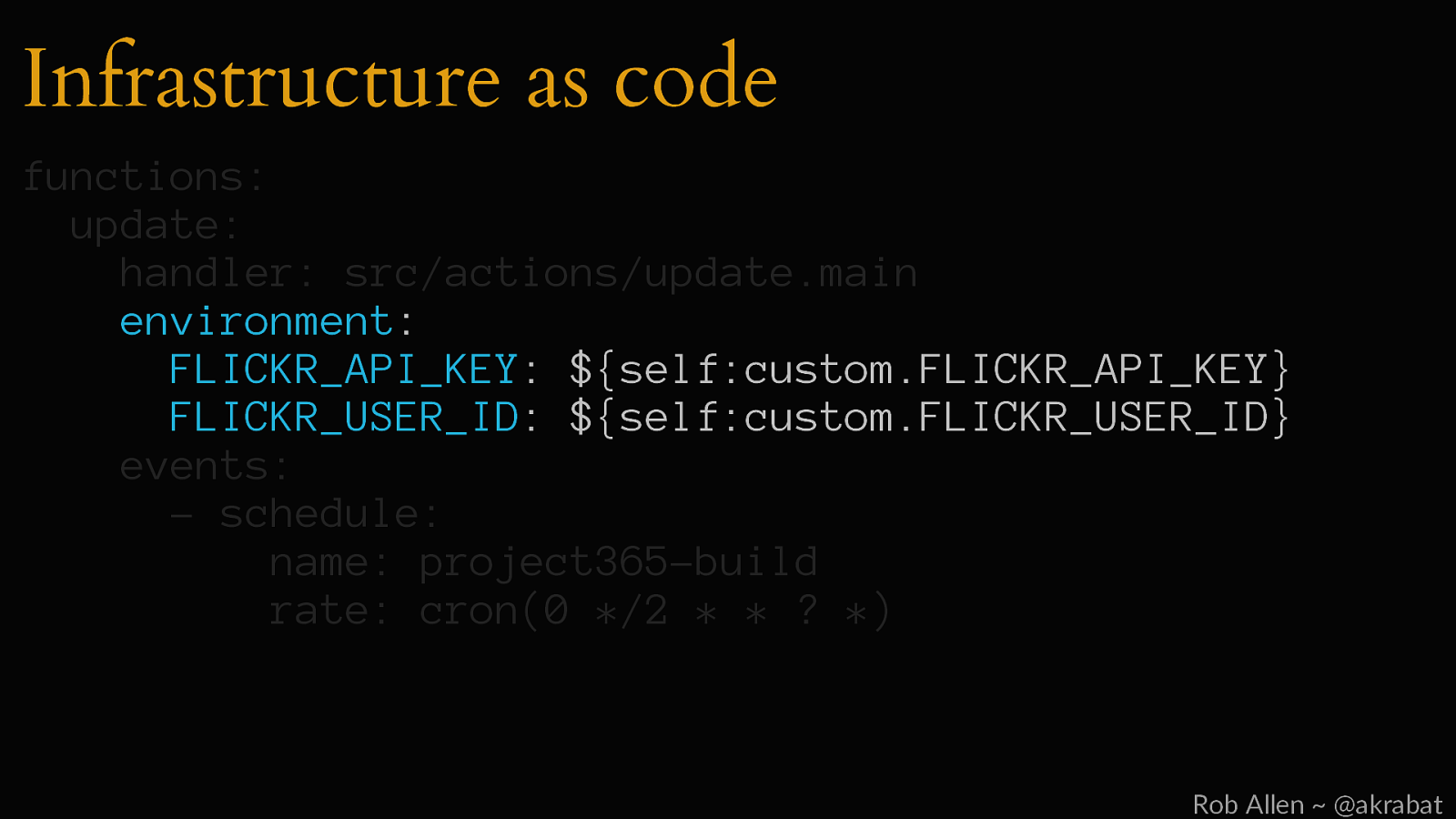
Infrastructure as code functions: update: handler: src/actions/update.main environment: FLICKR_API_KEY: ${self:custom.FLICKR_API_KEY} FLICKR_USER_ID: ${self:custom.FLICKR_USER_ID} events: - schedule: name: project365-build rate: cron(0 */2 * * ? *) Rob Allen ~ @akrabat
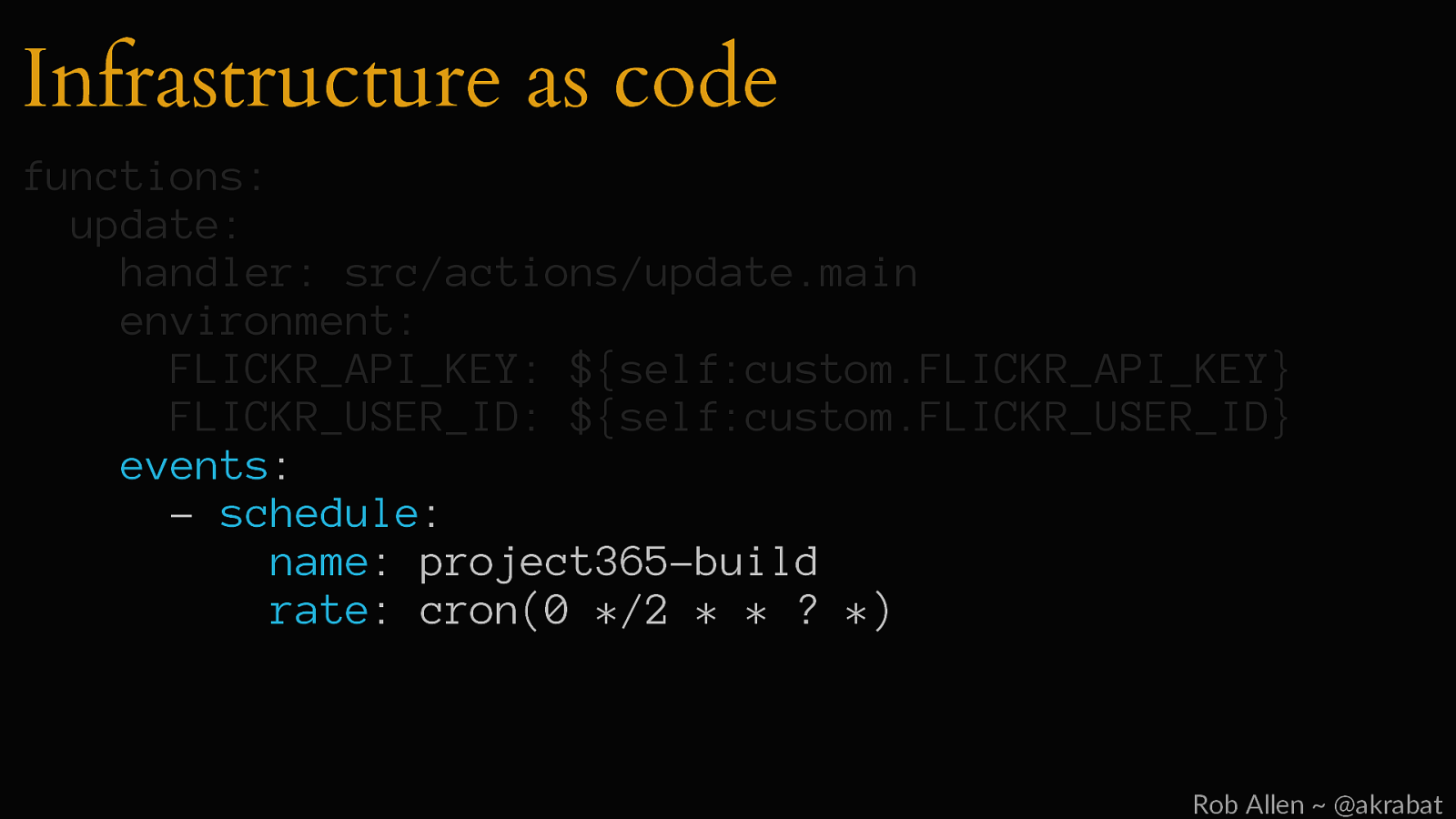
Infrastructure as code functions: update: handler: src/actions/update.main environment: FLICKR_API_KEY: ${self:custom.FLICKR_API_KEY} FLICKR_USER_ID: ${self:custom.FLICKR_USER_ID} events: - schedule: name: project365-build rate: cron(0 */2 * * ? *) Rob Allen ~ @akrabat
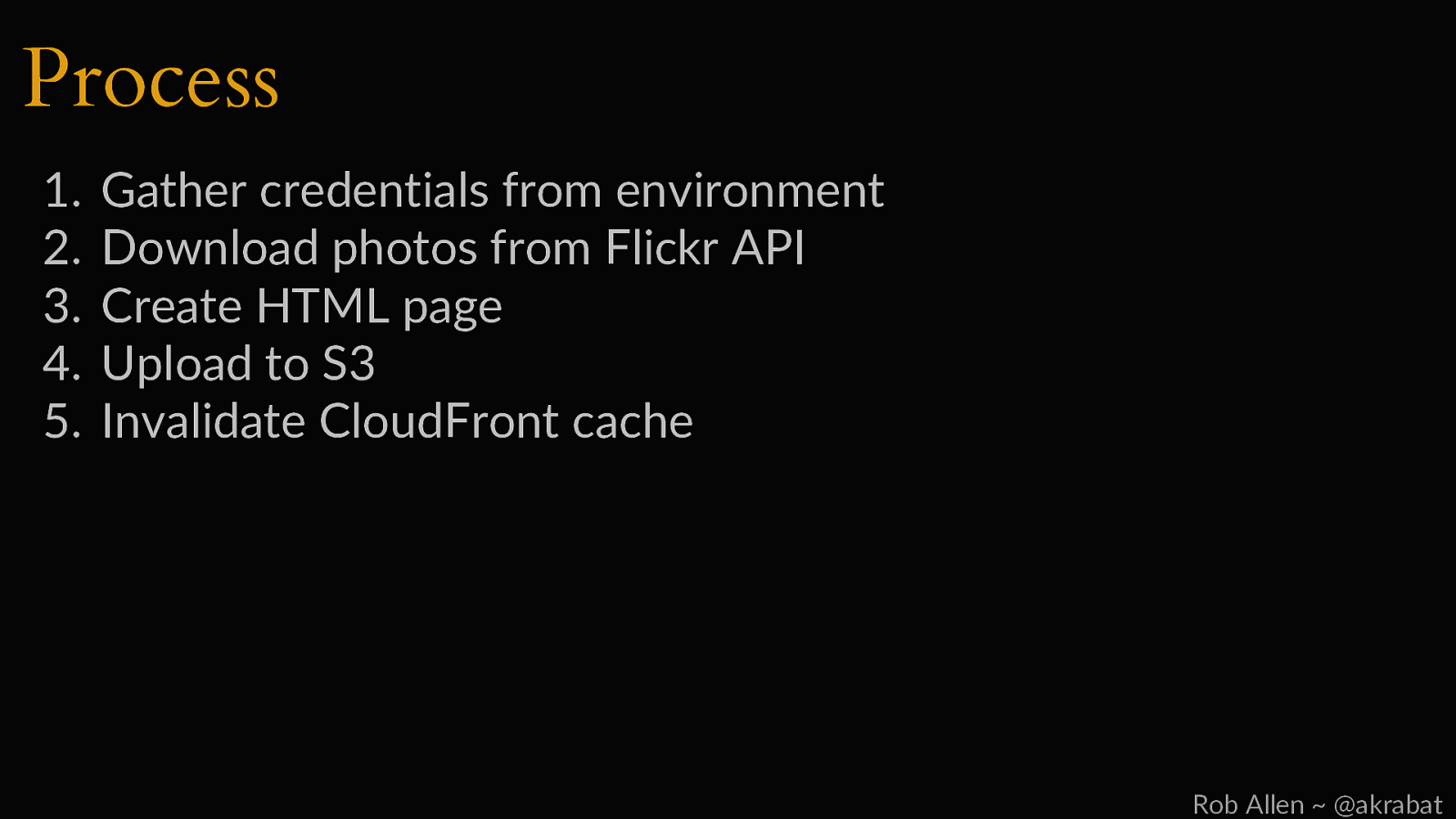
Process 1. 2. 3. 4. 5. Gather credentials from environment Download photos from Flickr API Create HTML page Upload to S3 Invalidate CloudFront cache Rob Allen ~ @akrabat
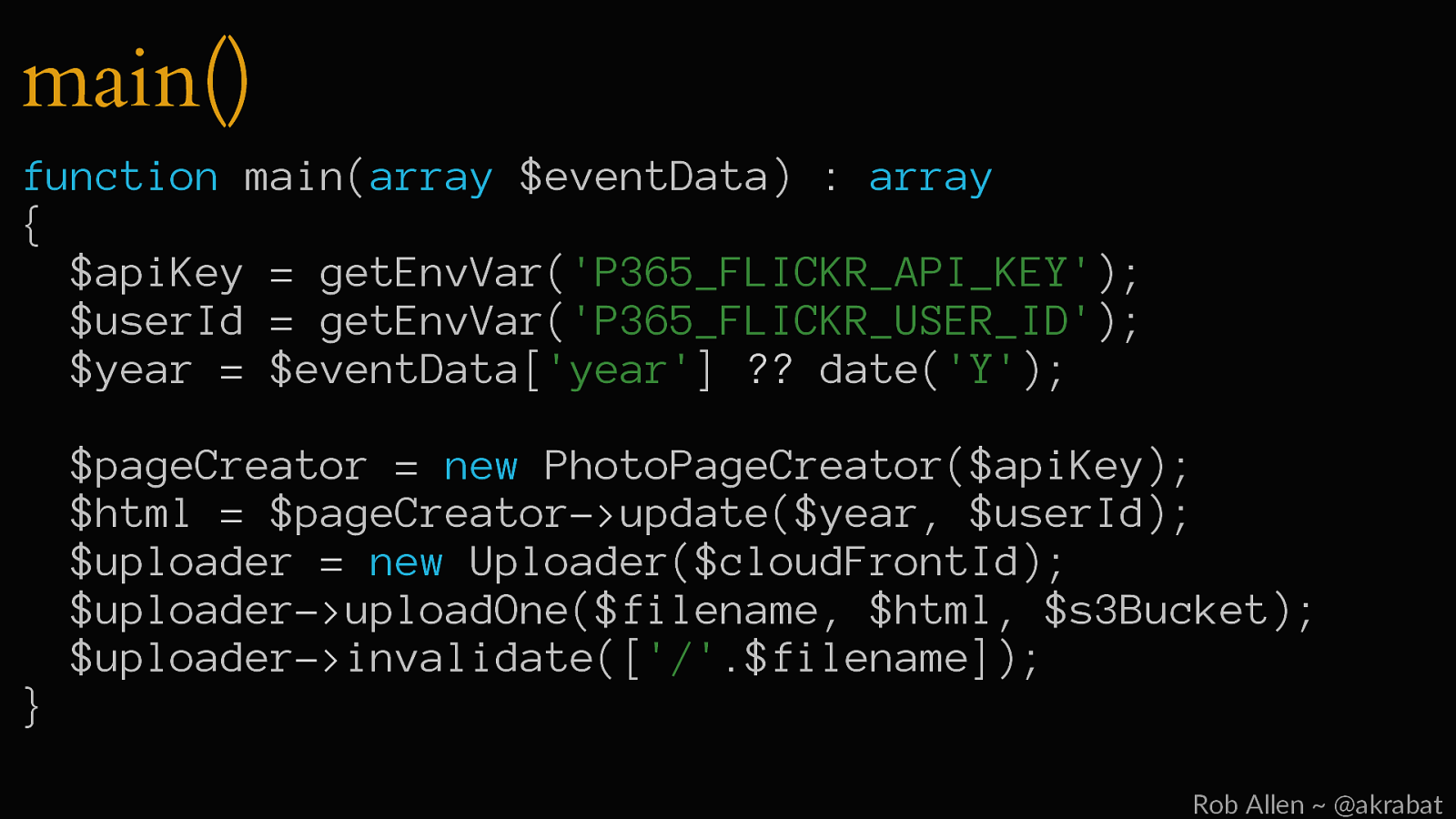
main() function main(array $eventData) : array { $apiKey = getEnvVar(‘P365_FLICKR_API_KEY’); $userId = getEnvVar(‘P365_FLICKR_USER_ID’); $year = $eventData[‘year’] ?? date(‘Y’); $pageCreator = new PhotoPageCreator($apiKey); $html = $pageCreator->update($year, $userId); $uploader = new Uploader($cloudFrontId); $uploader->uploadOne($filename, $html, $s3Bucket); $uploader->invalidate([‘/’.$filename]); } Rob Allen ~ @akrabat
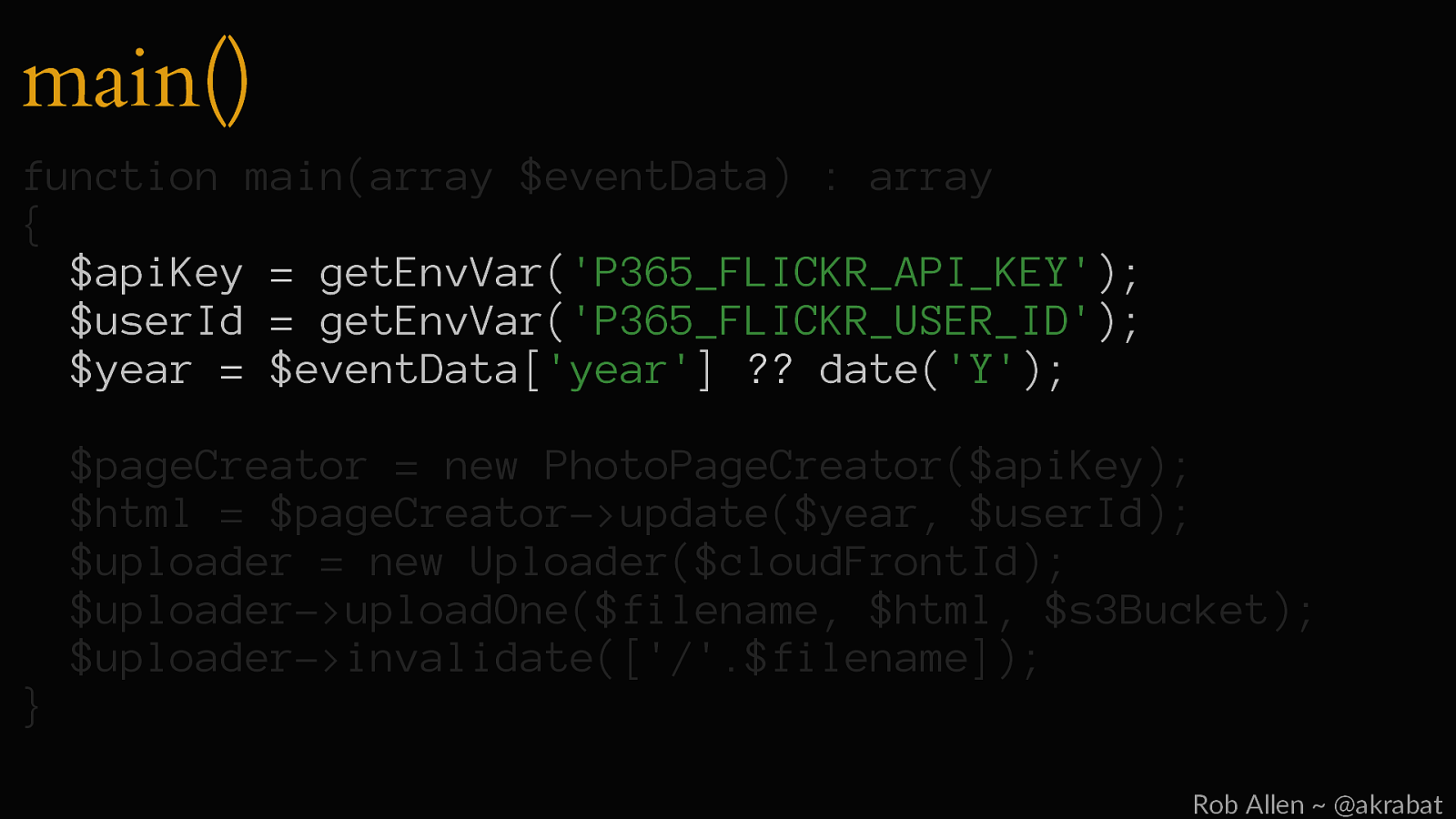
main() function main(array $eventData) : array { $apiKey = getEnvVar(‘P365_FLICKR_API_KEY’); $userId = getEnvVar(‘P365_FLICKR_USER_ID’); $year = $eventData[‘year’] ?? date(‘Y’); $pageCreator = new PhotoPageCreator($apiKey); $html = $pageCreator->update($year, $userId); $uploader = new Uploader($cloudFrontId); $uploader->uploadOne($filename, $html, $s3Bucket); $uploader->invalidate([‘/’.$filename]); } Rob Allen ~ @akrabat
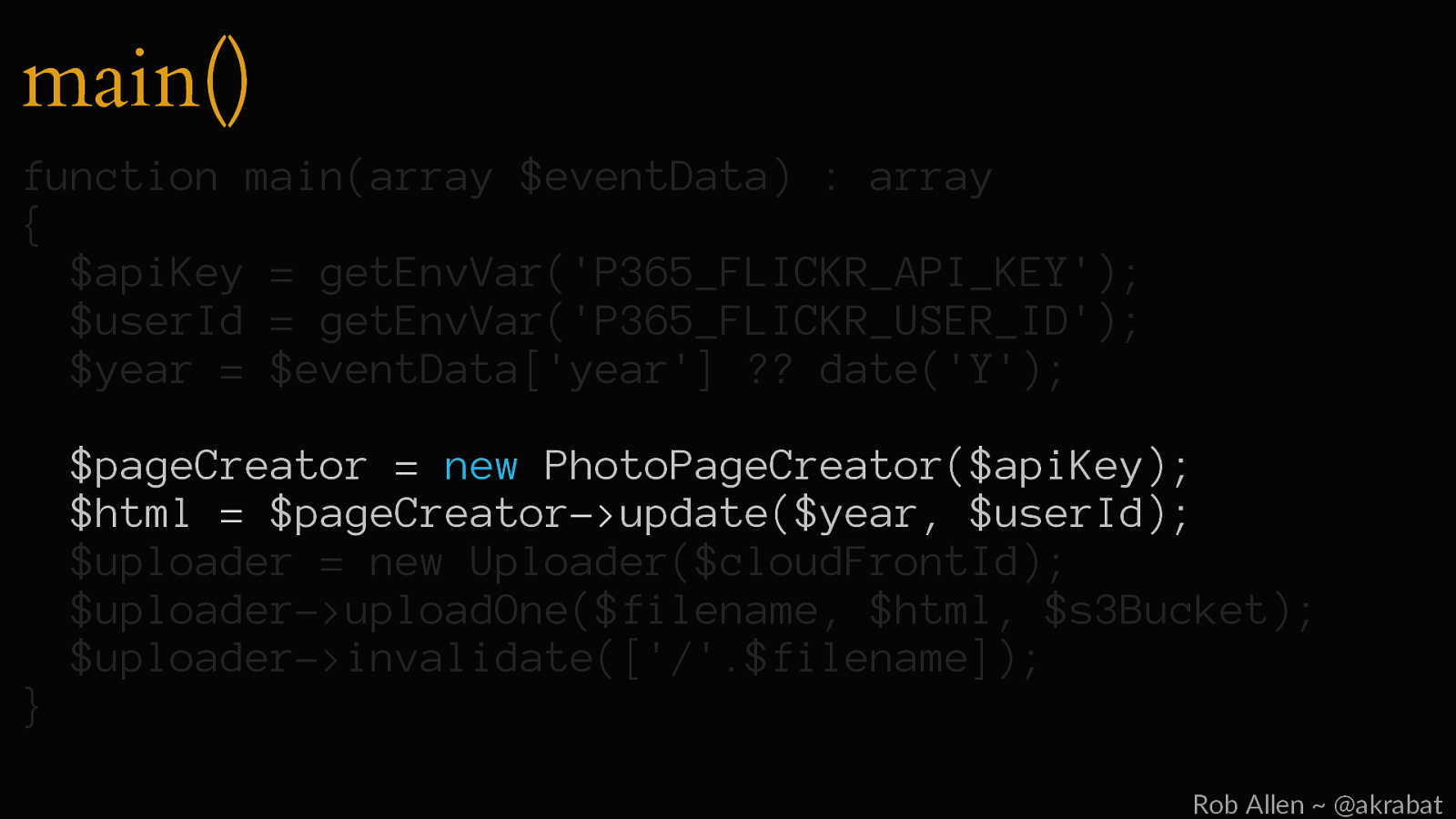
main() function main(array $eventData) : array { $apiKey = getEnvVar(‘P365_FLICKR_API_KEY’); $userId = getEnvVar(‘P365_FLICKR_USER_ID’); $year = $eventData[‘year’] ?? date(‘Y’); $pageCreator = new PhotoPageCreator($apiKey); $html = $pageCreator->update($year, $userId); $uploader = new Uploader($cloudFrontId); $uploader->uploadOne($filename, $html, $s3Bucket); $uploader->invalidate([‘/’.$filename]); } Rob Allen ~ @akrabat
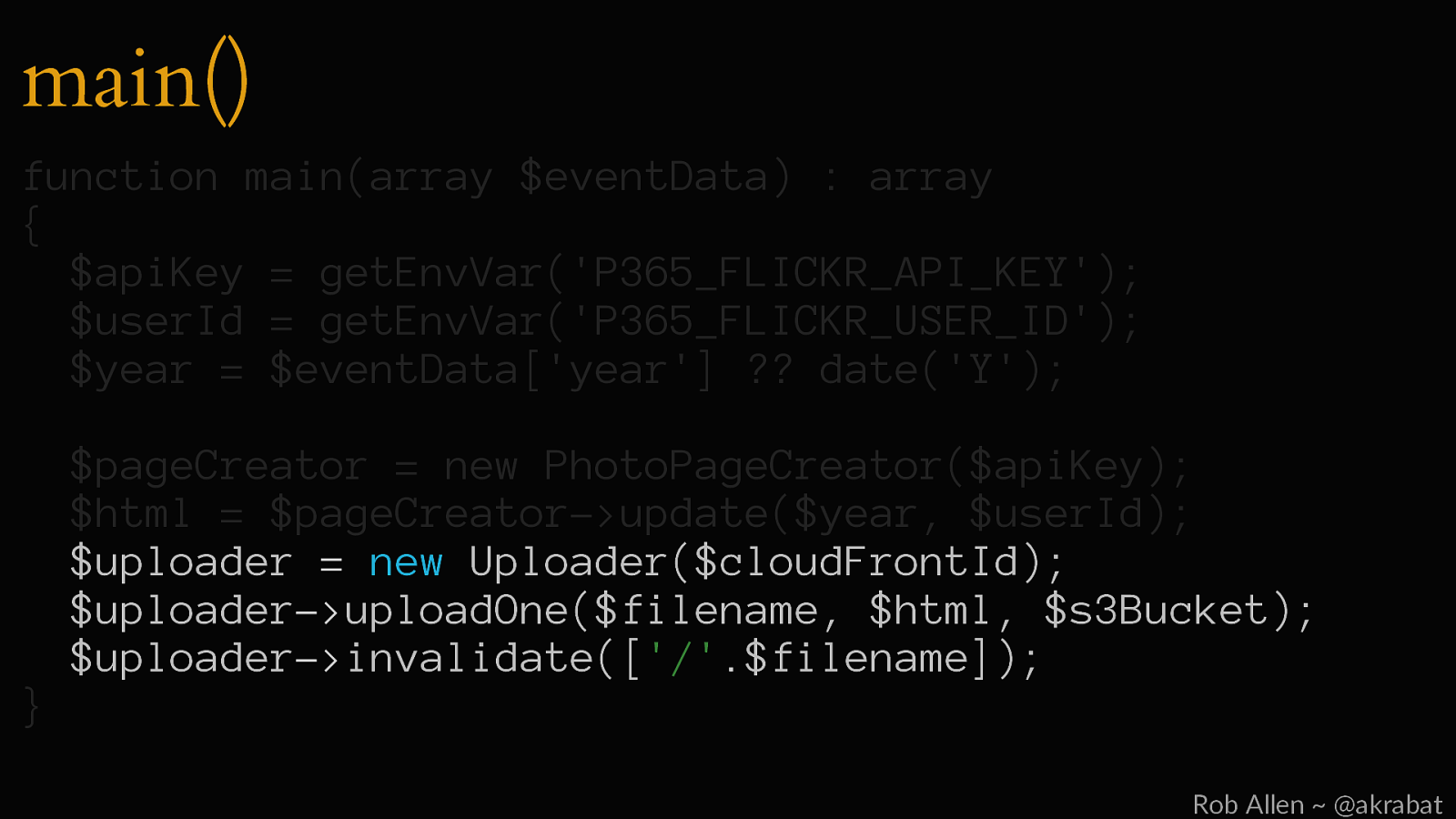
main() function main(array $eventData) : array { $apiKey = getEnvVar(‘P365_FLICKR_API_KEY’); $userId = getEnvVar(‘P365_FLICKR_USER_ID’); $year = $eventData[‘year’] ?? date(‘Y’); $pageCreator = new PhotoPageCreator($apiKey); $html = $pageCreator->update($year, $userId); $uploader = new Uploader($cloudFrontId); $uploader->uploadOne($filename, $html, $s3Bucket); $uploader->invalidate([‘/’.$filename]); } Rob Allen ~ @akrabat
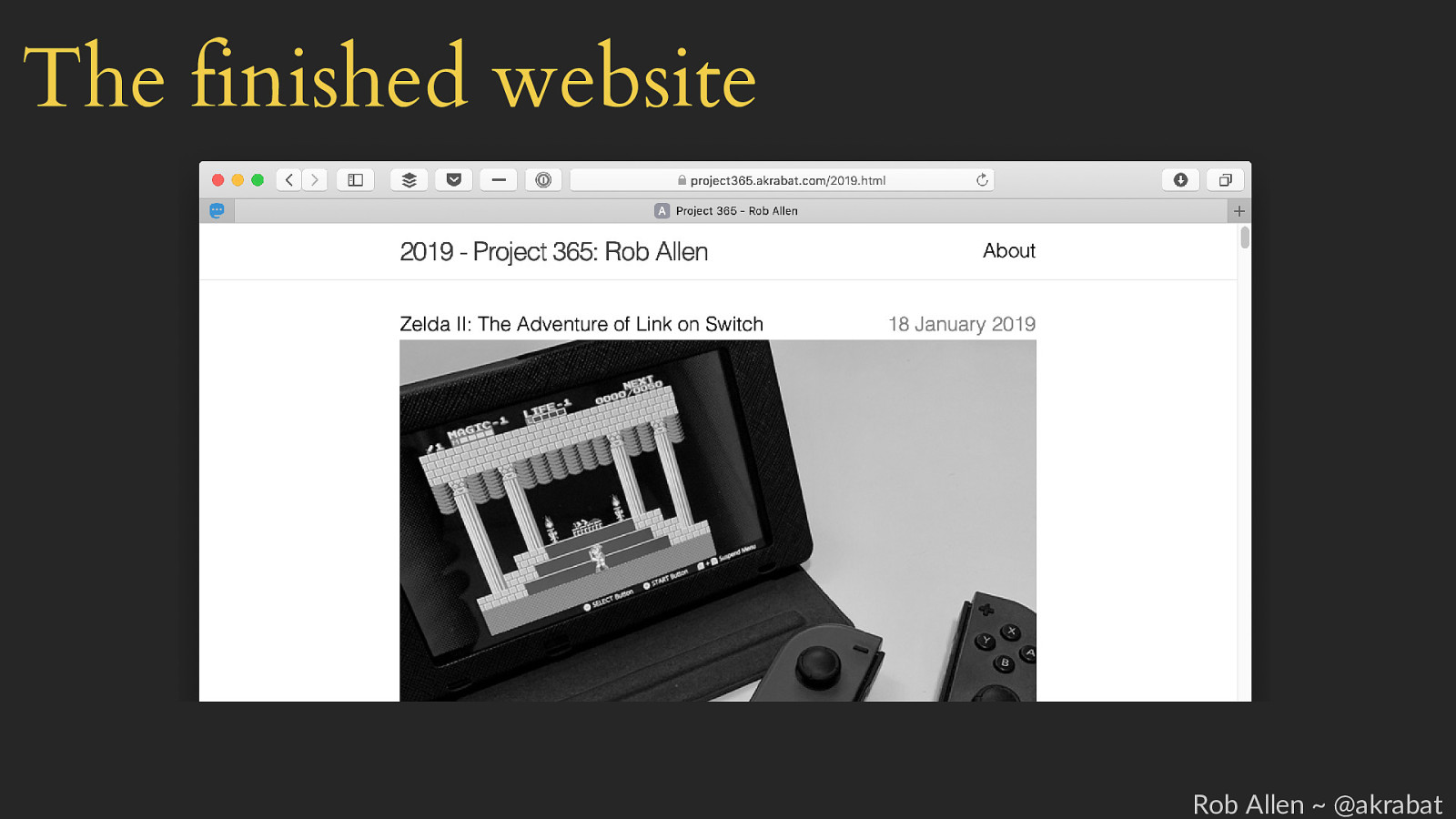
The finished website Rob Allen ~ @akrabat

Demo Rob Allen ~ @akrabat

To sum up Rob Allen ~ @akrabat
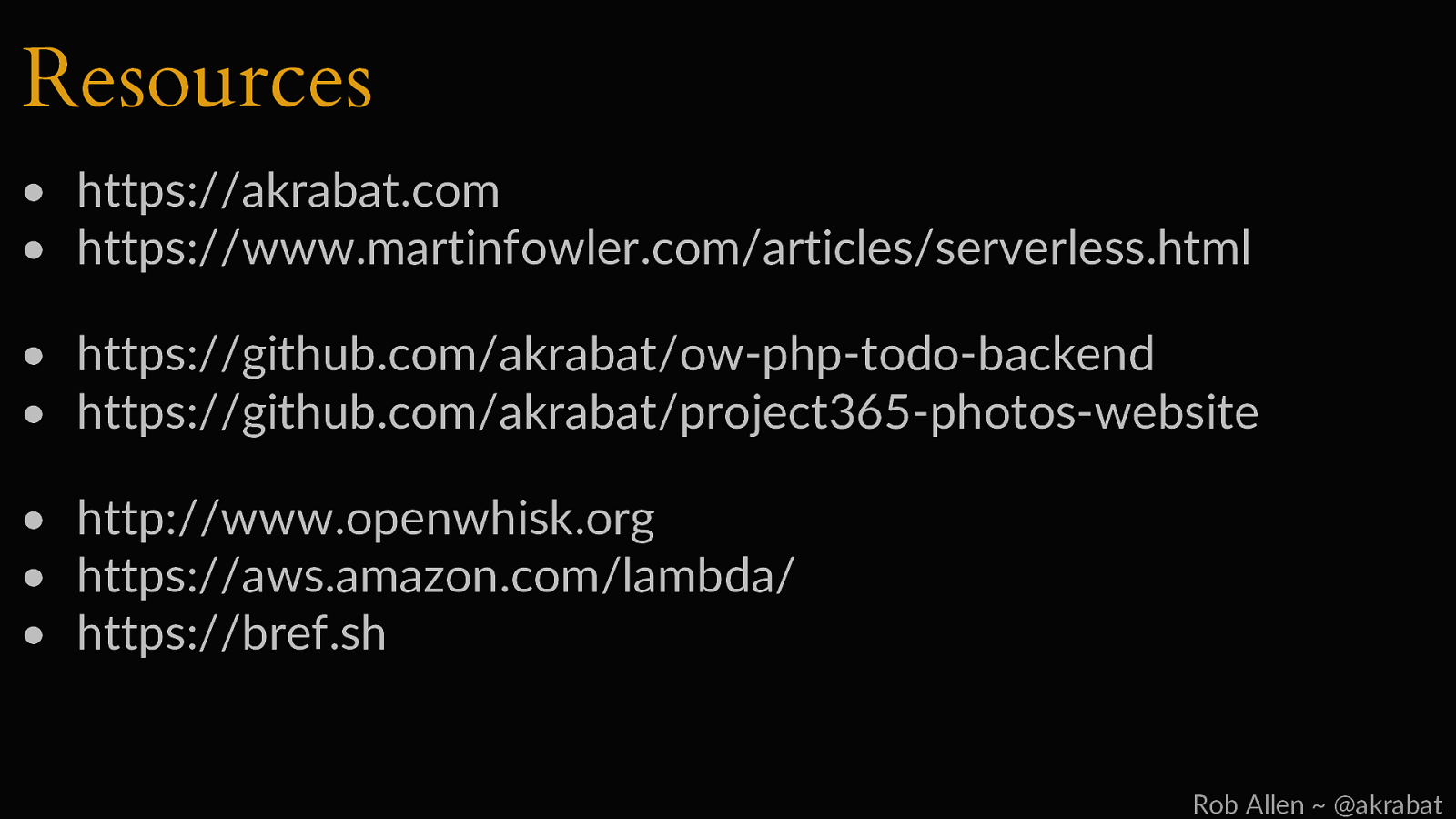
Resources • https://akrabat.com • https://www.martinfowler.com/articles/serverless.html • https://github.com/akrabat/ow-php-todo-backend • https://github.com/akrabat/project365-photos-website • http://www.openwhisk.org • https://aws.amazon.com/lambda/ • https://bref.sh Rob Allen ~ @akrabat

Thank you! Rob Allen ~ @akrabat
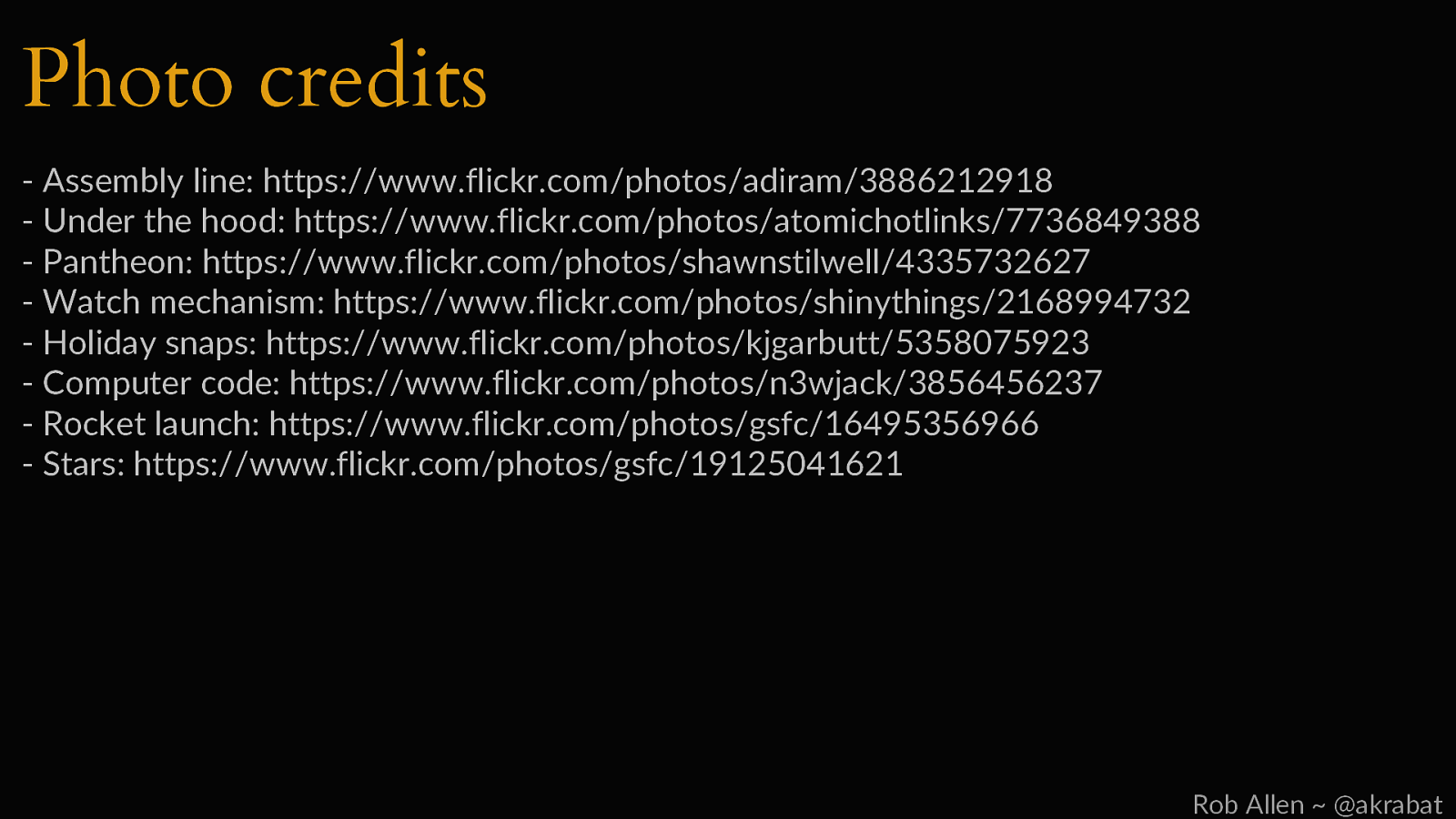
Photo credits - Assembly line: https://www.flickr.com/photos/adiram/3886212918 - Under the hood: https://www.flickr.com/photos/atomichotlinks/7736849388 - Pantheon: https://www.flickr.com/photos/shawnstilwell/4335732627 - Watch mechanism: https://www.flickr.com/photos/shinythings/2168994732 - Holiday snaps: https://www.flickr.com/photos/kjgarbutt/5358075923 - Computer code: https://www.flickr.com/photos/n3wjack/3856456237 - Rocket launch: https://www.flickr.com/photos/gsfc/16495356966 - Stars: https://www.flickr.com/photos/gsfc/19125041621 Rob Allen ~ @akrabat
Serverless platforms are suited to a wide range of applications from IoT & chatbots through to microservices and web hooks. In this session, I’ll introduce you to how serverless applications work and embrace cloud services to live in a world where there are many separate parts that make up the application. I’ll cover the architectural patterns we use to design a serverless application including handling their stateless nature, how to use multiple functions for a task and leveraging event processing to trigger further functions. I will then turning my attention to showing you how to put these into practice by looking at how they can be implemented in an Lambda or Apache OpenWhisk.
By the end of the session, you’ll understand how serverless applications work and you’ll want to start building your own!
